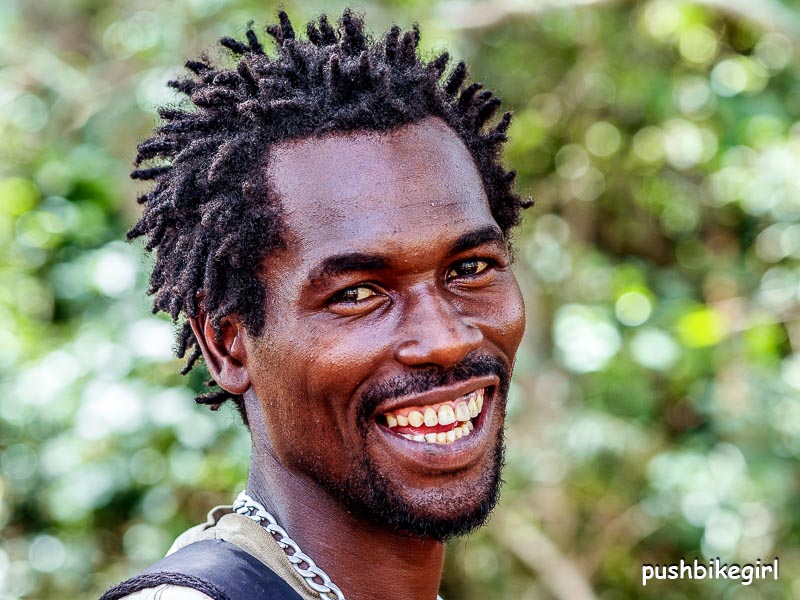
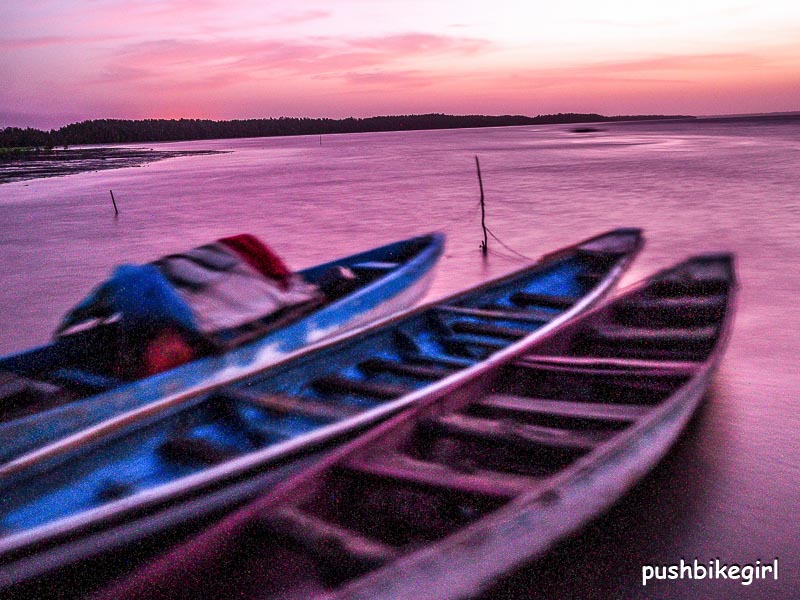
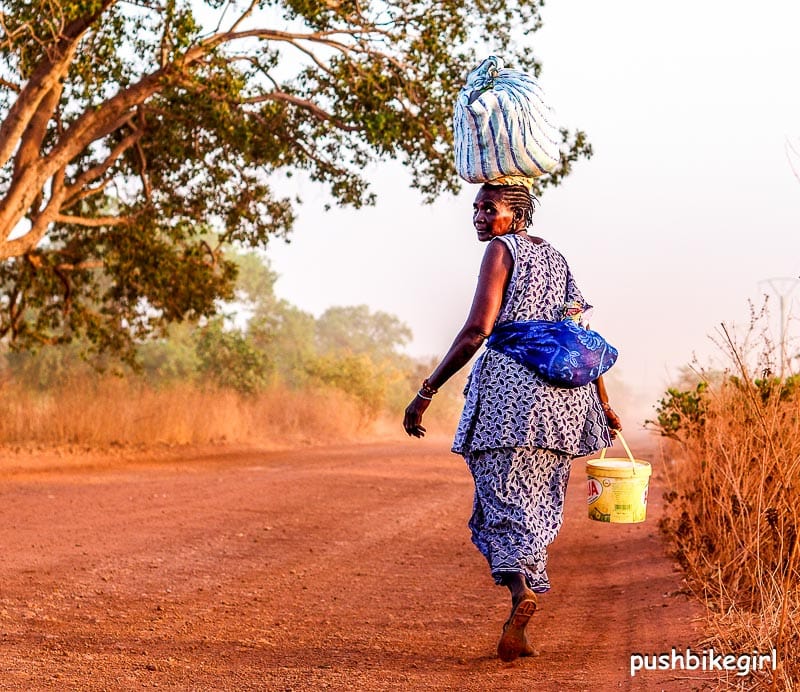
“What’s your mission?” the border official bellowed into my ears when I asked for a stamp at the tiny border crossing at the very eastern end of the small and undistinguished country on the Gambia River.
Phew, finally people are speaking English again was my first thought. And the second one was that I probably will have endless discussions now — ponderings about taking them with me to Germany and why I am here.
“I have no mission. I want to see Africa,” I replied.
“By bicycle,” his tone incredulous “Yes, with the bicycle,” I added.
Obviously irritated, he looked me in the eye and shook his head, “And who pays you for it?”
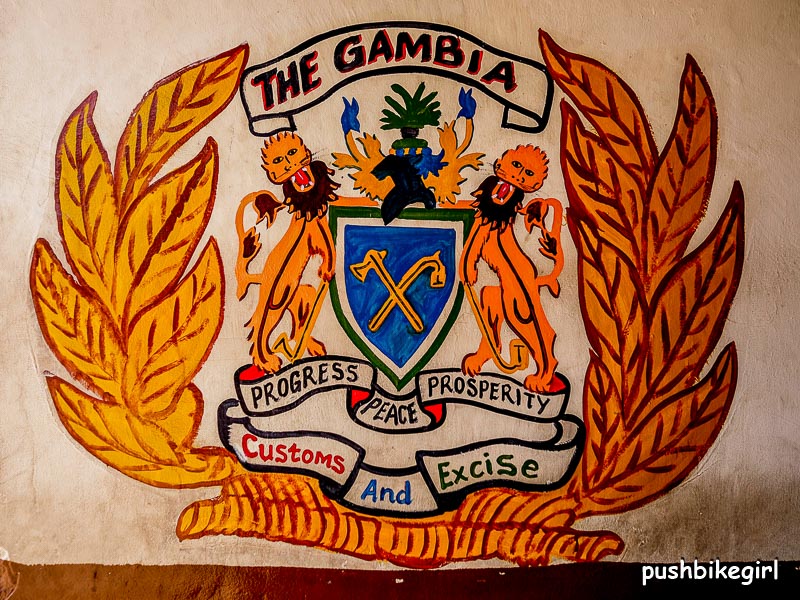
“No one pays me; I’m doing it to get to know the world. It’s great fun, and Africa is fascinating”.
“I don’t believe you,” he snapped. Then he paused for a second and added, “Who sent you? Your country?
“No, who would be interested in it except me?
“Where do you want to go? Do you have a map? Show it to me,” his tone even louder.
“I have been traveling by bicycle for many years now; I can find my way. Don’t worry,” and I tried to hang a smile on it.
“I am the boss here. Show me your map; otherwise, you can cycle right back to Senegal”, came next.
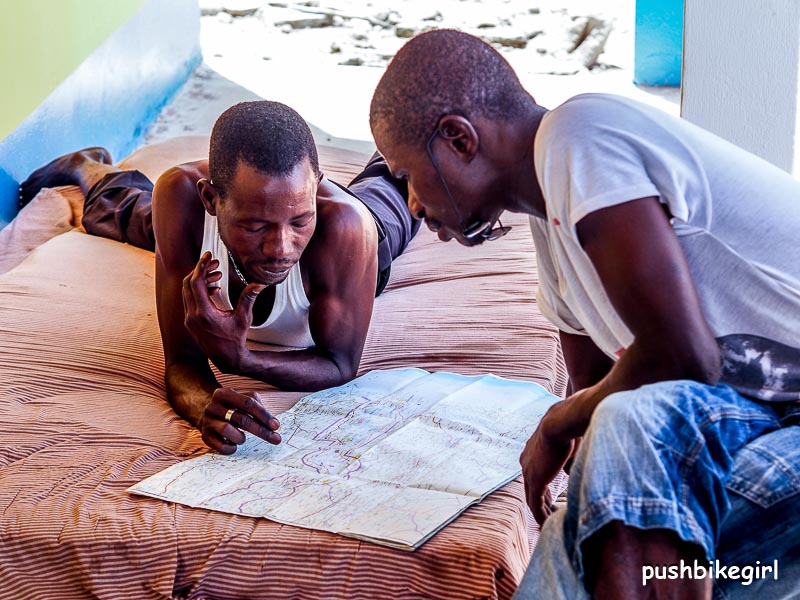
Five minutes had passed, and he still couldn’t tell where we were on the map, so I showed him the spot, took the map and asked him if I could camp somewhere nearby.
While he stamped my passport and explained to me that this was not the actual visa, but that I had to get it in the next place, about 50 km from there, he grumbled something about “You can sleep over there on the street!”
But then another officer interfered and helped me.
“Come I show you our backyard. Here you can camp. We have water and a toilet. You should move on tomorrow.” A bit later, he brought me something to eat and a bucket of water to wash with.
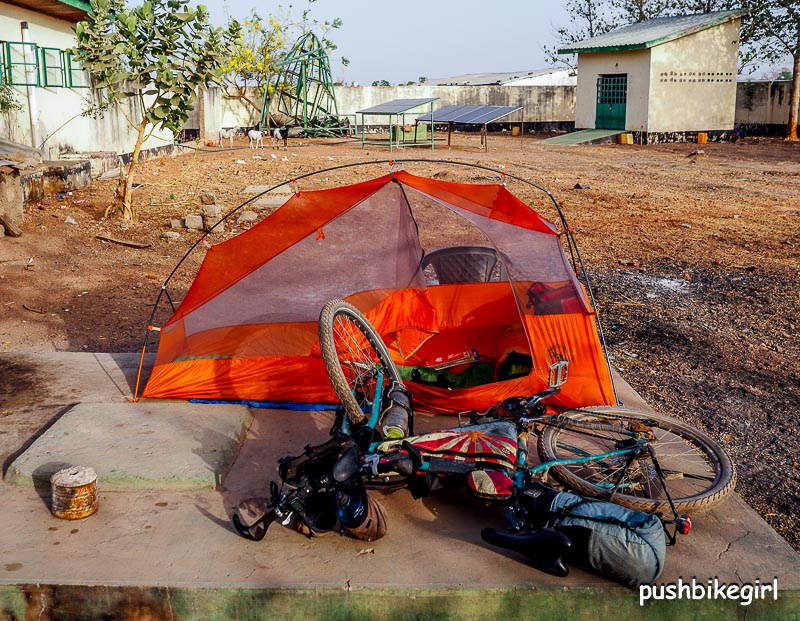
The Gambia was once a British colony. Some Gambians speak excellent English, while others not a single word, but I was amazed at how well I could communicate here.
In general, I must say I am deeply impressed by how many languages are spoken here by the people in this part of Africa.
Speakers can change from Wolof to Mandinka and from Pular to English as if it were the most normal thing in the world. Each village speaks a different language, and even within these communities, there are various ethnic groups.
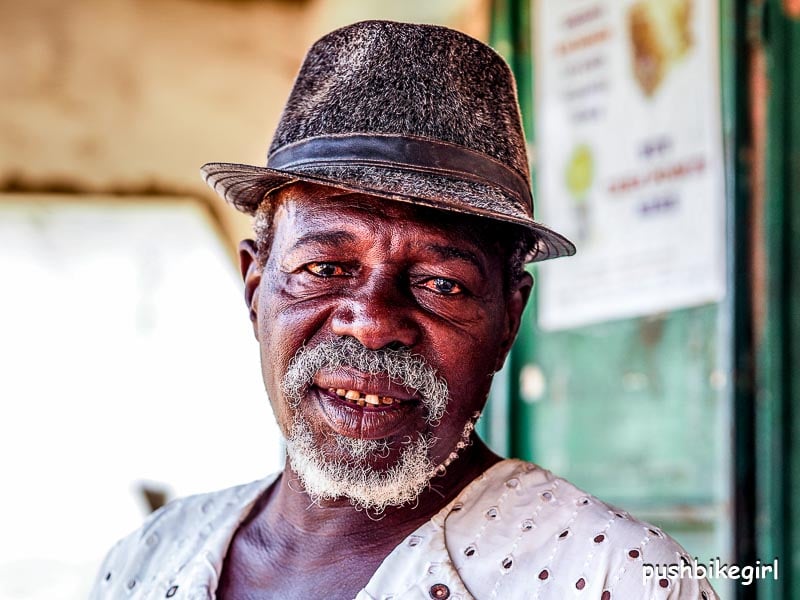
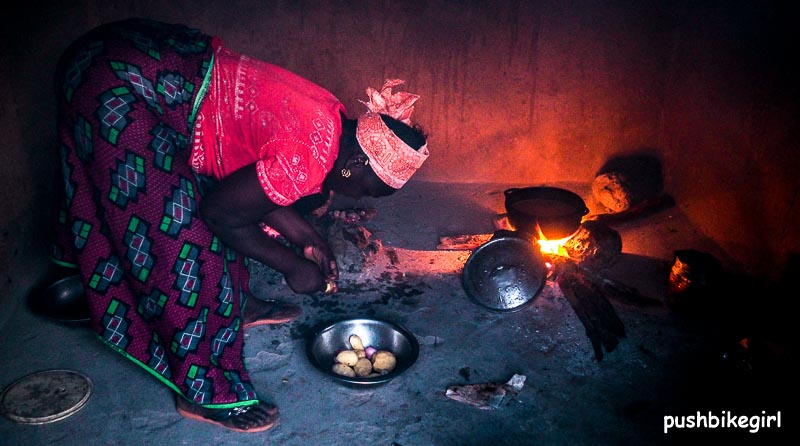
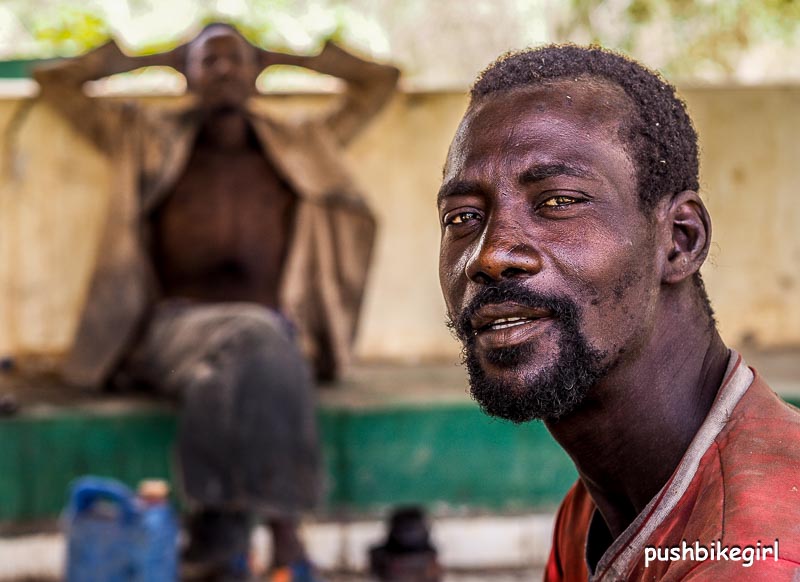
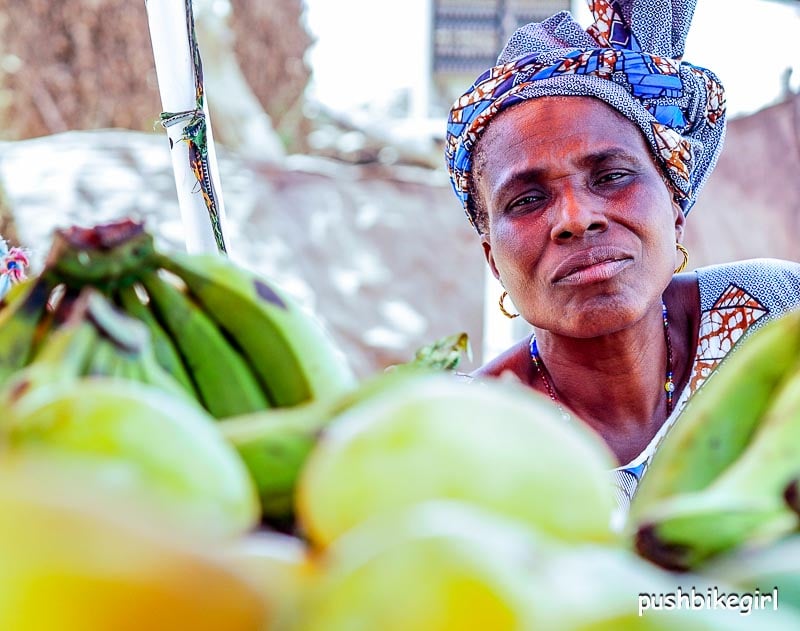
Gambians tend to be friendly people who are proud that their country is called “The smiling coast.”
“Toubab Toubab – White person, White person” people are calling and waving to me endlessly. In every tiny village, at least 20 times. Laughing eyes of children, curious glances. Shaking hands, a hundred times a day, then in between are “give me – give me” and off I go.
Often at the end of the village, I can already see the next houses on the horizon. I only have time to breathe for 2-3 minutes, then again “Toubab Toubab – give me give me” all day long.
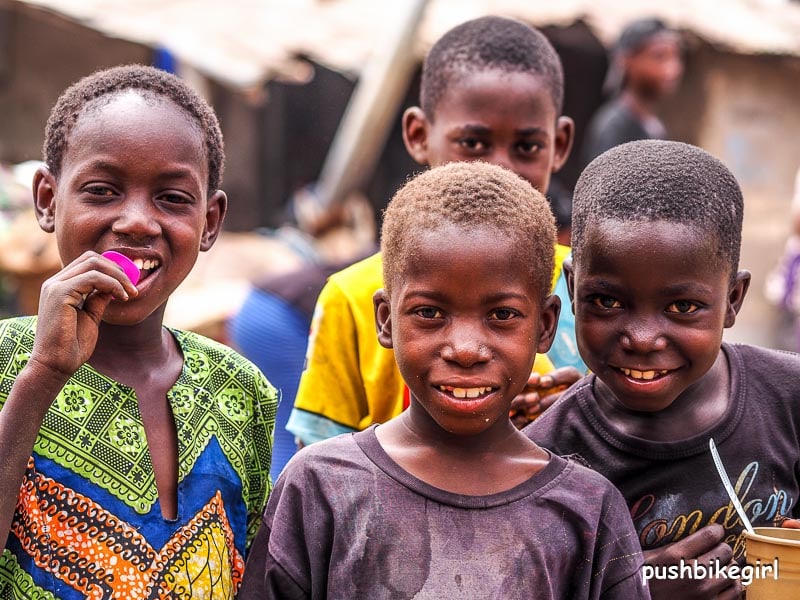
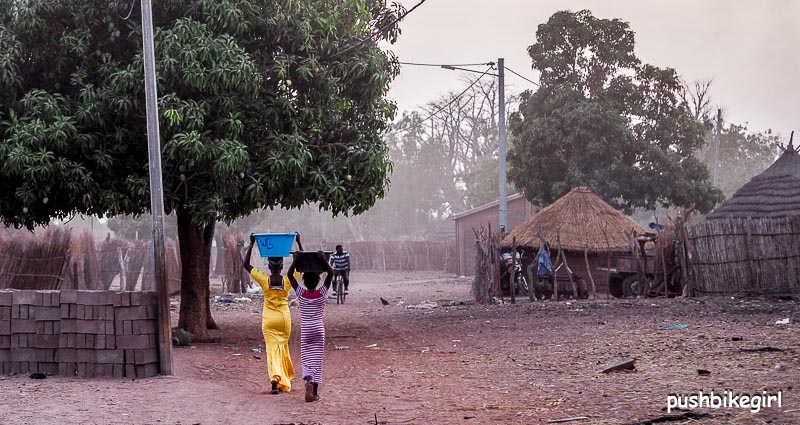
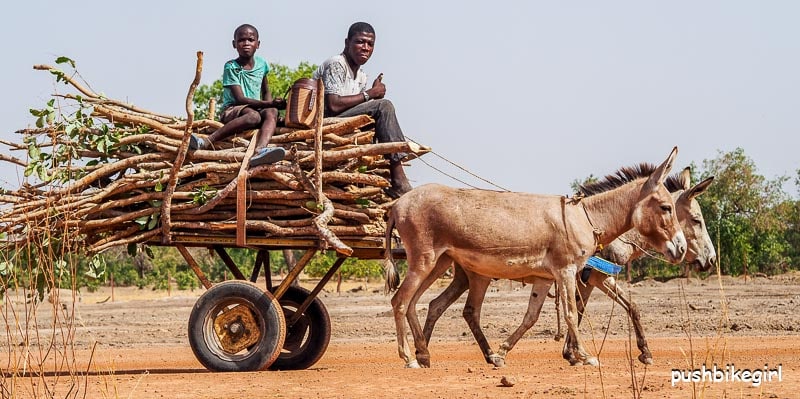
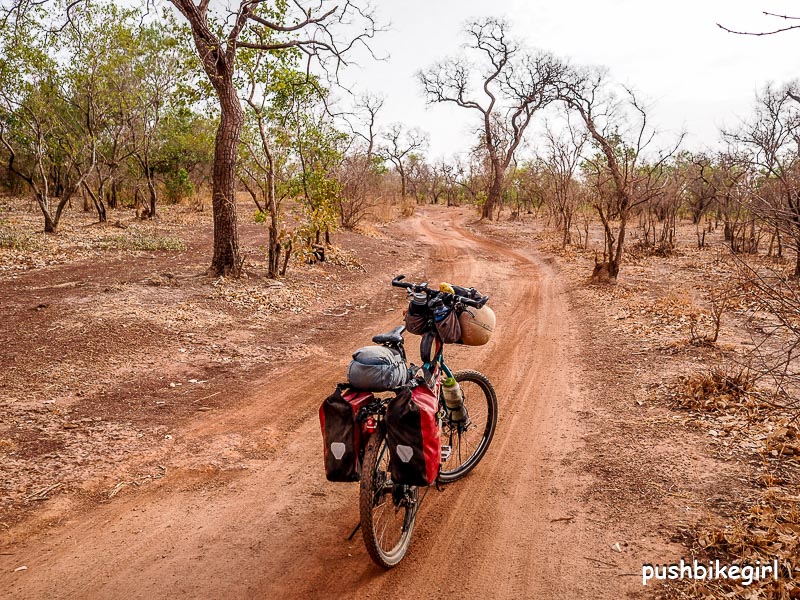
It is exhausting. The heat is a constant companion, over 40 degrees every day. But there are big trees under which I can sit in the shade again and again to take breaks. Just like the men here, only they sit there the whole day.
Here in the very far East of the country, there is no work. In the dry season, there is nothing to do in the fields. In the tiny villages, there may be a small grocery shop, but that is the only service jobs there might be. And what else? No electricity and almost nothing to buy. Minimal options for proper nutrition wherever you look.
Housework is a women’s or girl’s work. As in Senegal, they carry the canisters of water from the well home on their heads. Washing, cooking, cleaning, and caring for the children.
And the men? A patriarchal society! They relax and watch the day go by.
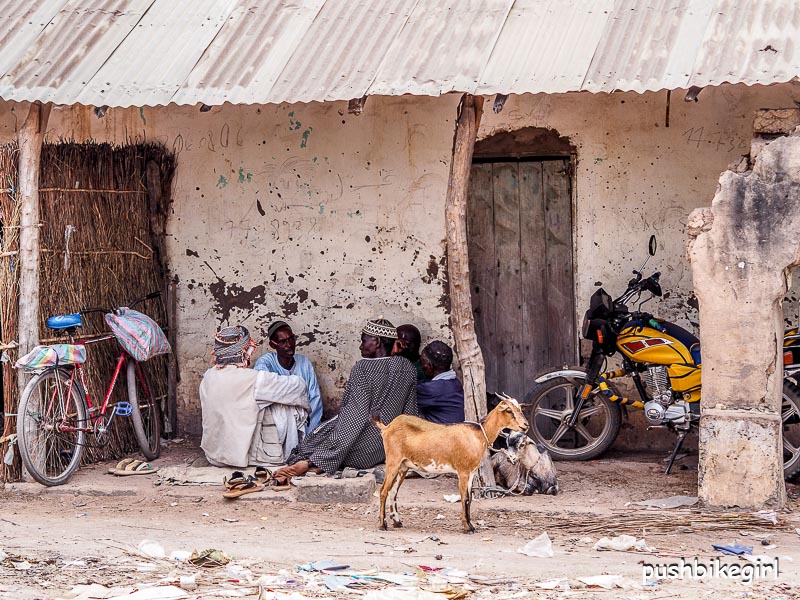
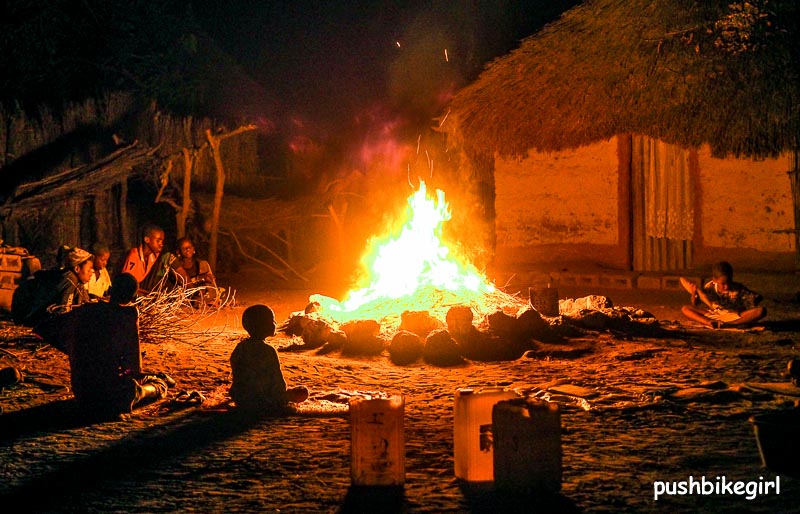
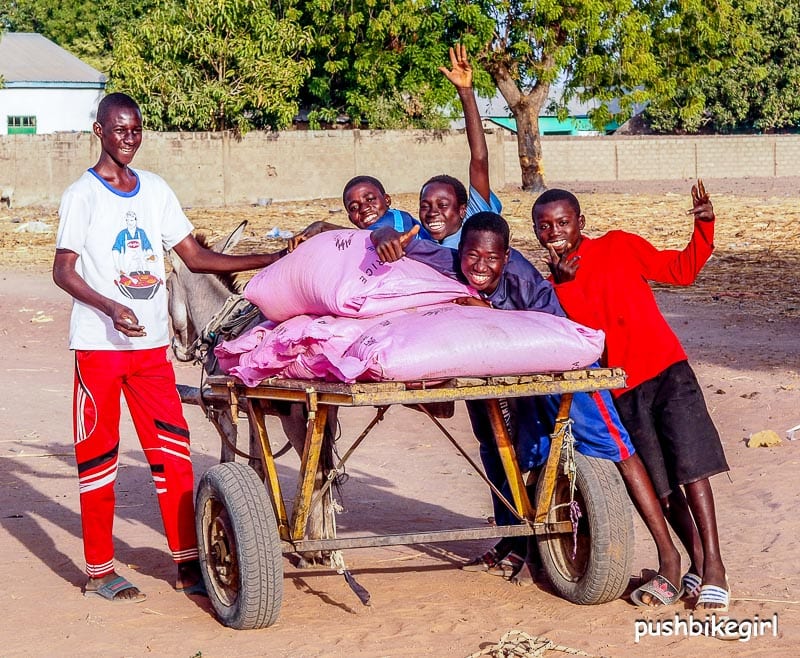
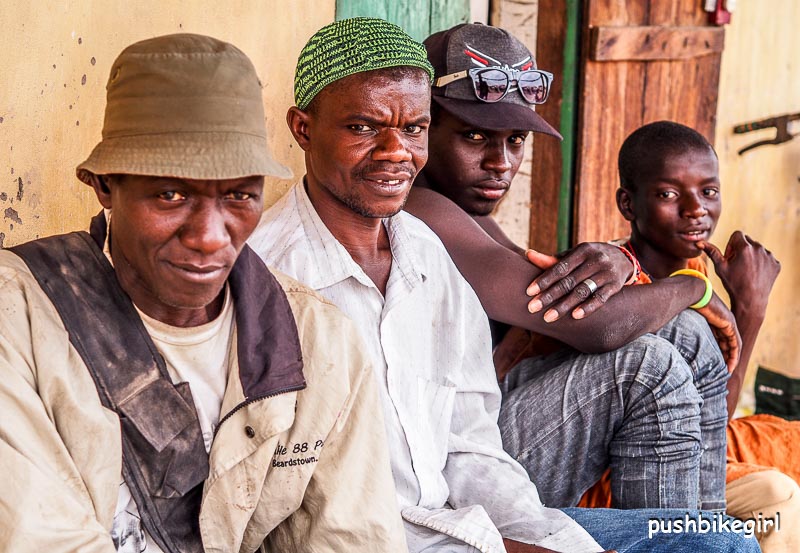
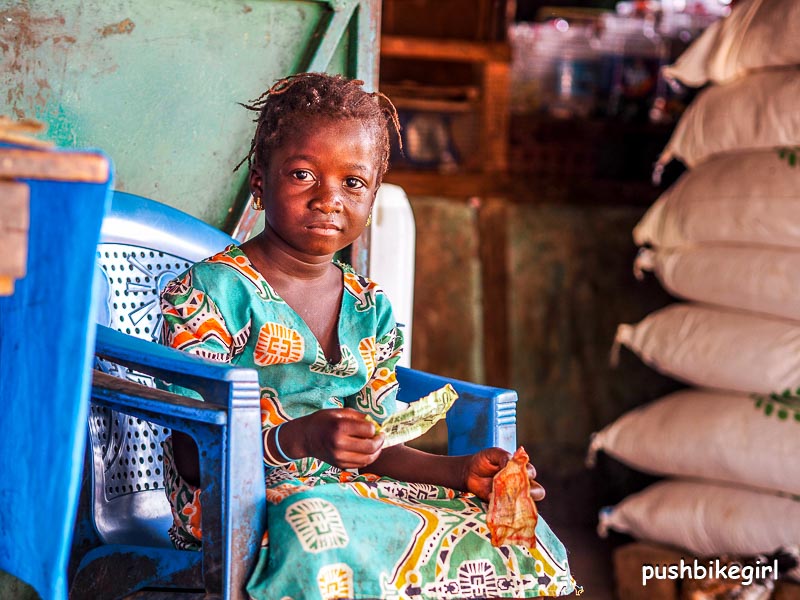
It is a peaceful environment. I don’t see any aggression. Above all, I see an infinite number of children.
I took a break at a police checkpoint, where I was invited to share some mangos. Cars stopped, put money in the hands of the officers, and drove on. At some point, I asked the policewoman why they had to give them money, and she said: “They help us. We don’t earn much, that’s our extra income.”
One of the policemen asked me where I wanted to go. “Towards Banjul,’ I replied. “Banjul? That’s 450 km, you can never ride that far by bike,” he said to me. “Yes, believe me, I can.
“I’ve never seen a woman riding a bike even to the next village. Women can’t do that; they’re too weak for that. Just like in school, the boys always have better marks than the girls”, he added.
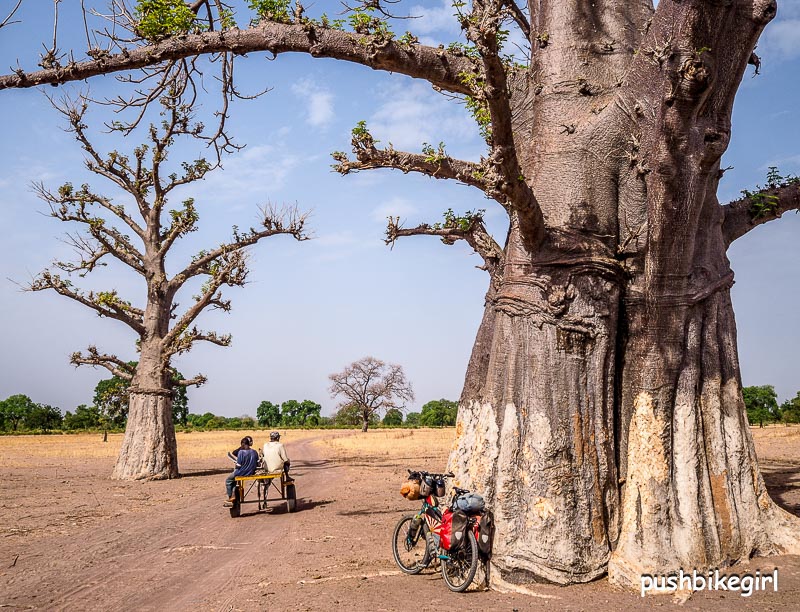
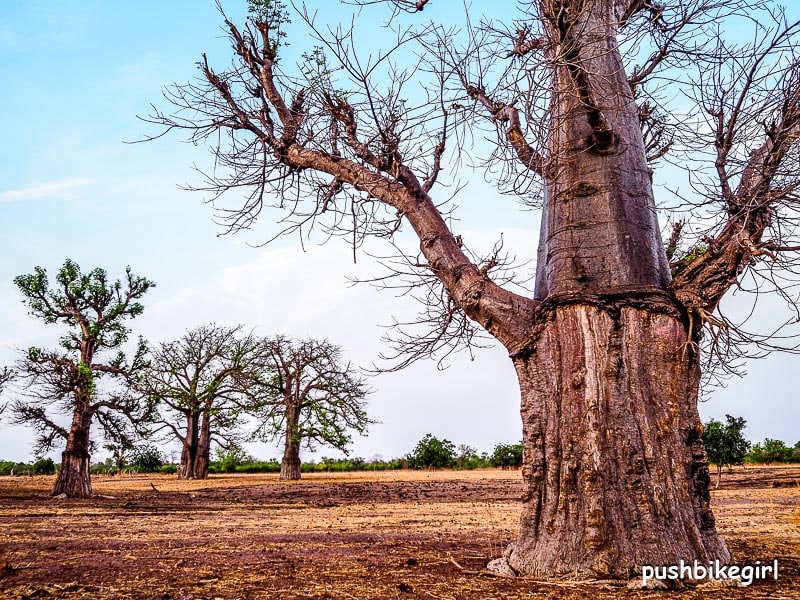
The Baobab trees continued to inspire me.
I discovered a huge owl and saw the first baboons. A large troop of about 50 baboons crossed the road in front of me.
I am in Africa, wow, how gigantic is that? A bright thought that made me forget my efforts and the brutal heat for a short moment.
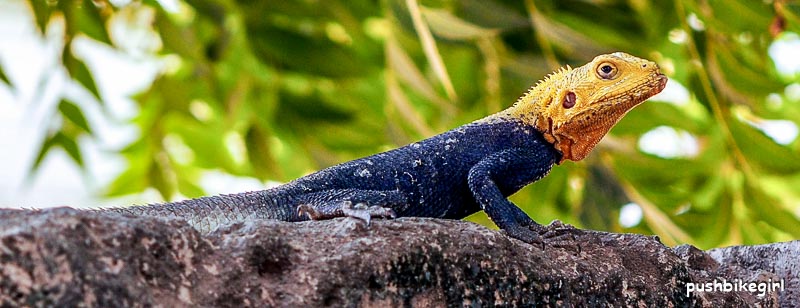
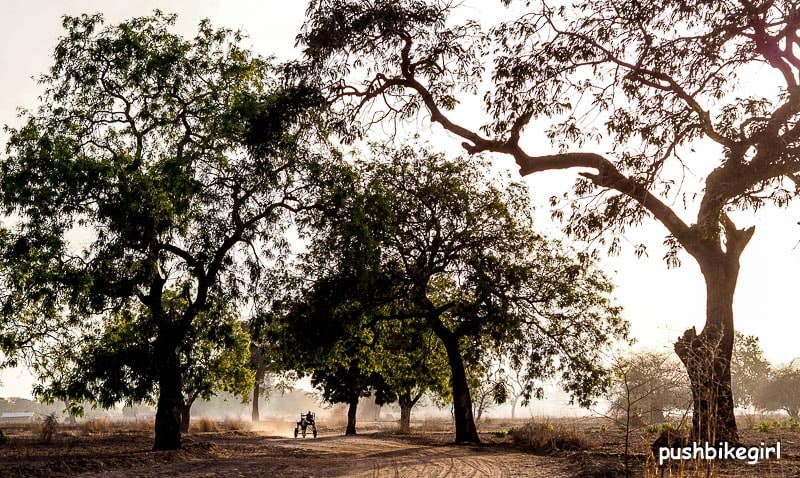
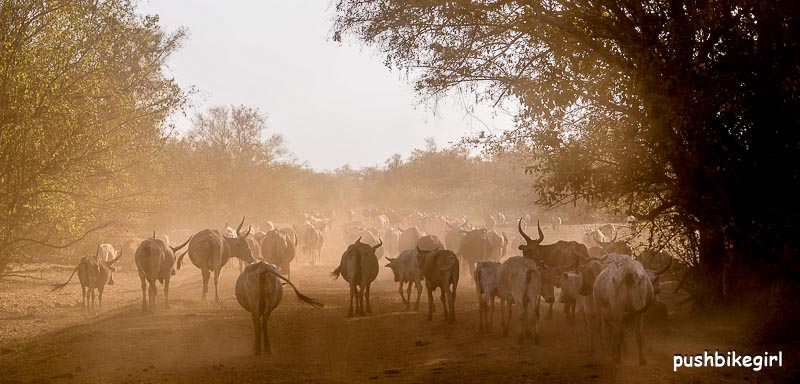
When I asked a Gambian fella how he had been treated while living in England for ten years, he replied: “They sometimes called me a monkey.”
“It was often cold, and rainy there along with the foreign culture, so I’m glad to be home. At home, I have my family and friends. My place is here in Africa. I am African; I want to live at home again. Africa makes me happier.”
“Sure, I earned a lot of money there in the security business, but it never really satisfied me. Life is so beautiful here — so much nature. We live outside, sit together, and chat and don’t lock ourselves behind doors. But we are poor, very poor.”
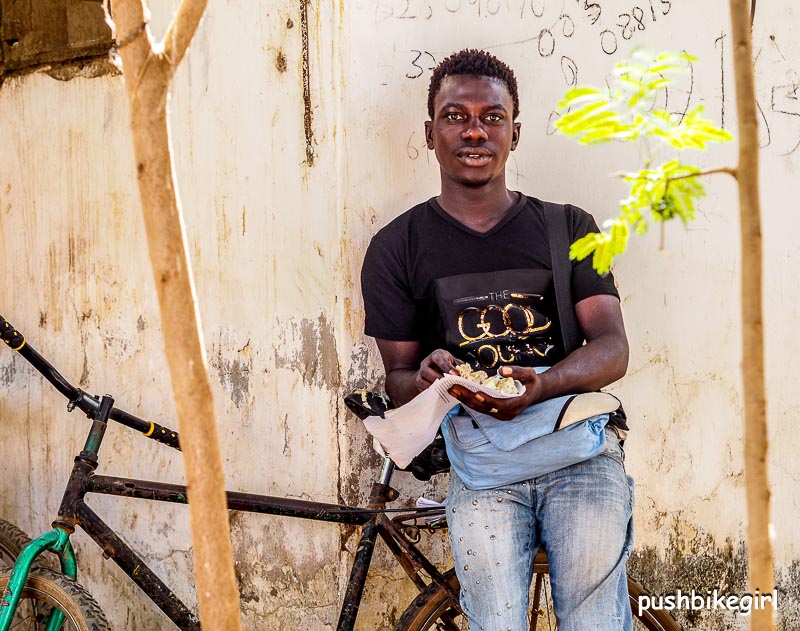
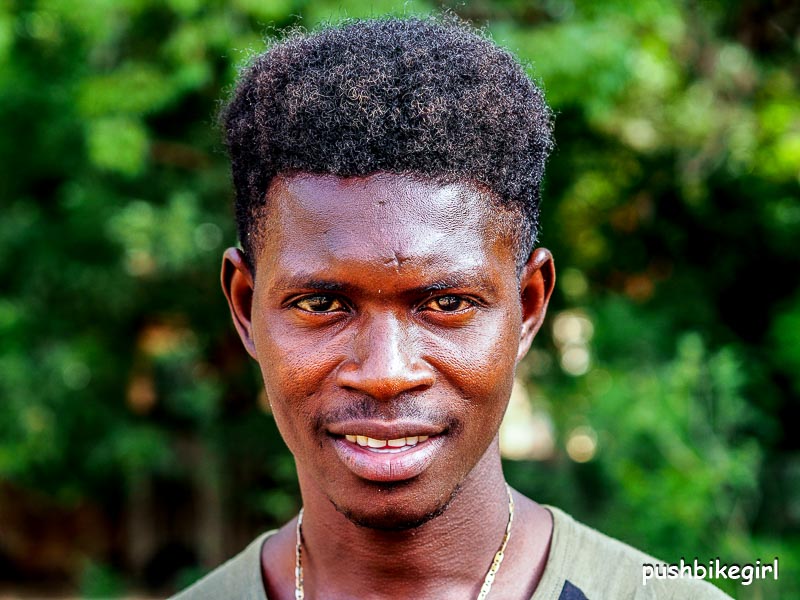
In every village, there seems to be an economic refugee story. “Take me to Germany” is also a standard daily question.
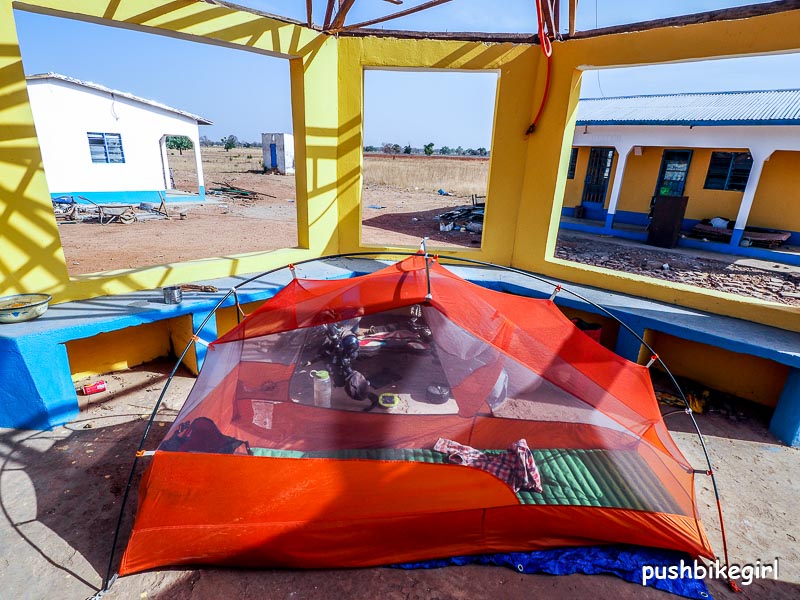
I spent one night at a police station. Three young policemen let me camp with them and invited me to dinner. They all dreamed of working as policemen in Germany one day.
I tried to put their paradisiacal ideas of my homeland into a realistic form all evening long, and above all, I wanted to make it clear to them that they would certainly never get a job as policemen anywhere in Germany.
The sad thing is, they didn’t believe a word I said, but it was a fascinating conversation.
They see pictures and videos from the Western world, and the prosperity we have and of course want the same – it’s completely human – and so any explanations on my part are almost a waste of time.
They had some buddies who escaped via Libya to Europe. And apparently, they are in constant contact with them and only get positive news.
“They have jobs and earn a lot of money,” I heard them say.
But when I asked them what their friends were working at, they didn’t know what to say. And when I challenged their silence, implying that their friends were just telling lies to make the situation seem better than it is, they suddenly started to argue among themselves.
One of them admitted that he already had these thoughts, while the others claimed the opposite.
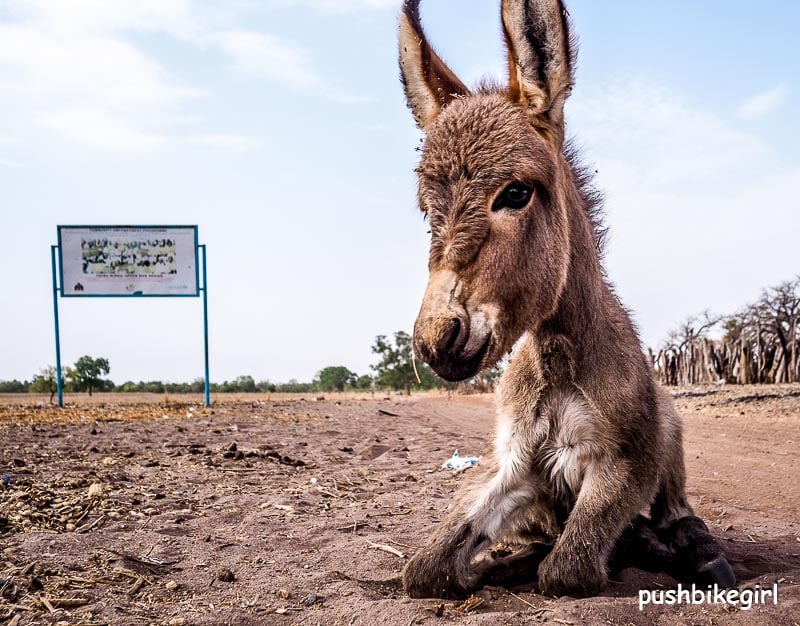
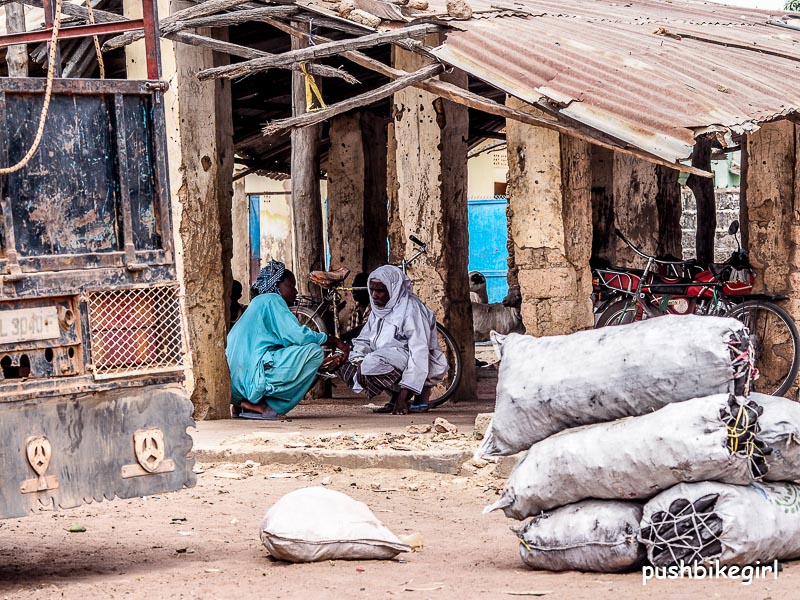
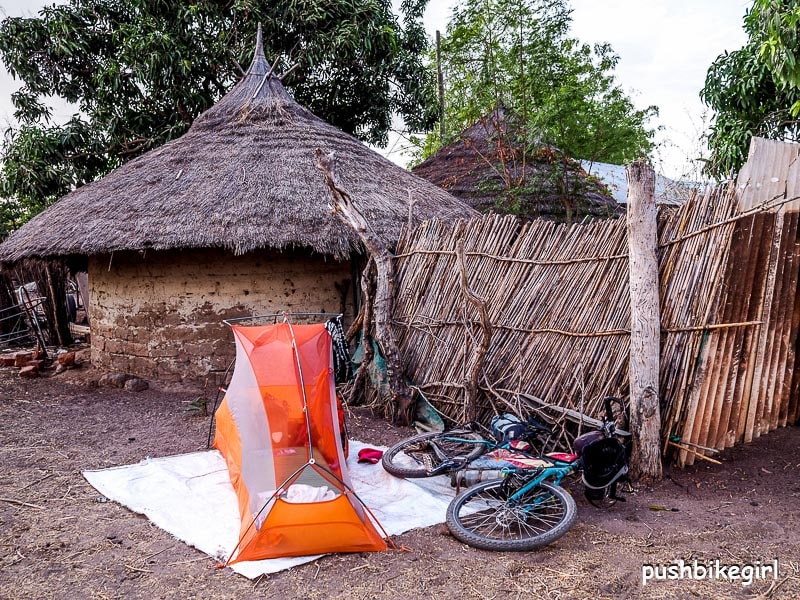
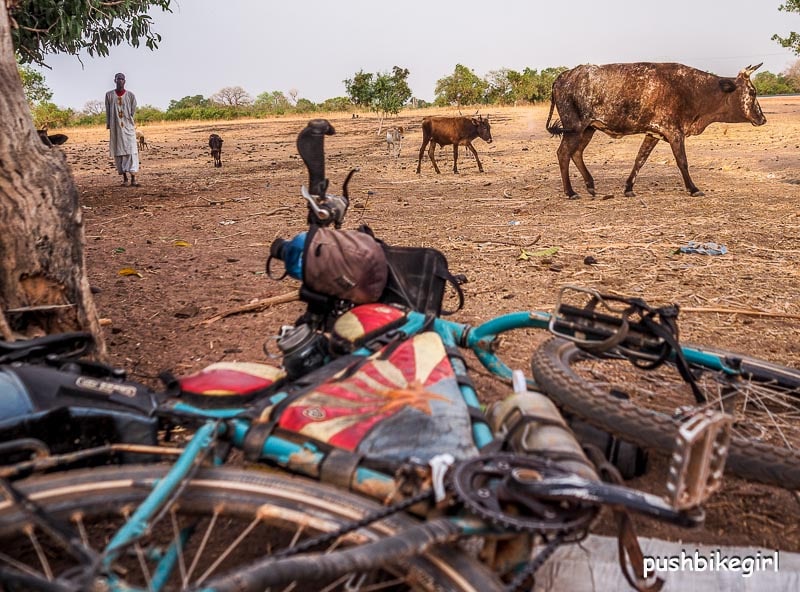
On the way to Georgetown, I met a teenager. “Can you get me a visa to Germany” were his words. “The visa is costly. I don’t have 1000 Euro. Can you help me?”
“What do you want there?” was my question in return. “I want to work there. I want to support my family. We are poor.”
“And why Germany in particular? You don’t speak a word of German. Why not England?”
“Germany is the best country, and they welcome Africans and are friendly to us.”
I also talked to him for a very long time and told him about our rising racism and the many adverse side effects he would be exposed to if he ever made it to Europe.
“There is no job for you, and with a three-month visa, you can’t work anyway.”
“But others who have gone, have jobs and send money home. Their families in our villages have beautiful houses and always have something to eat. I often have nothing to eat. They’ve made it possible. I also want to make it,” and with these words, we ended discussing this unsolvable topic.
Finally, I asked him what Georgetown was like. “Georgetown is great,” the boy replied. And what’s so great about it, I asked. “There’s electricity.”
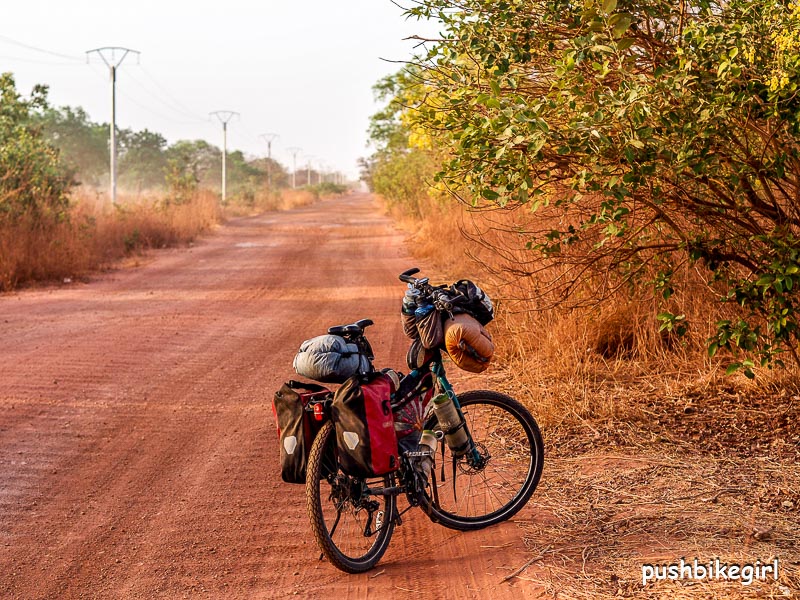
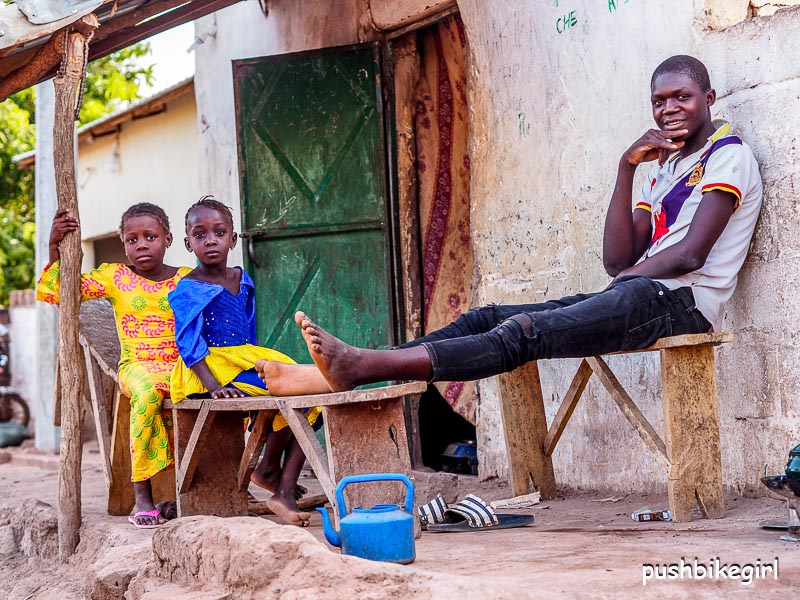
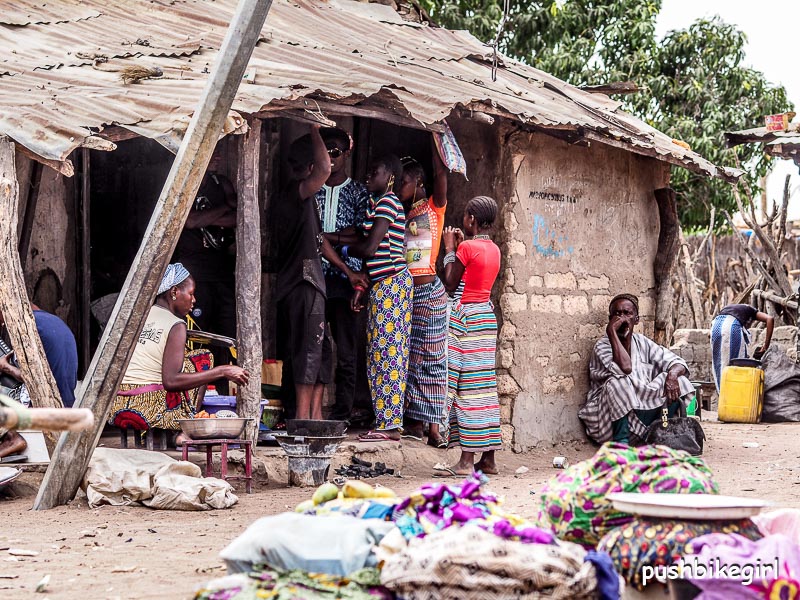
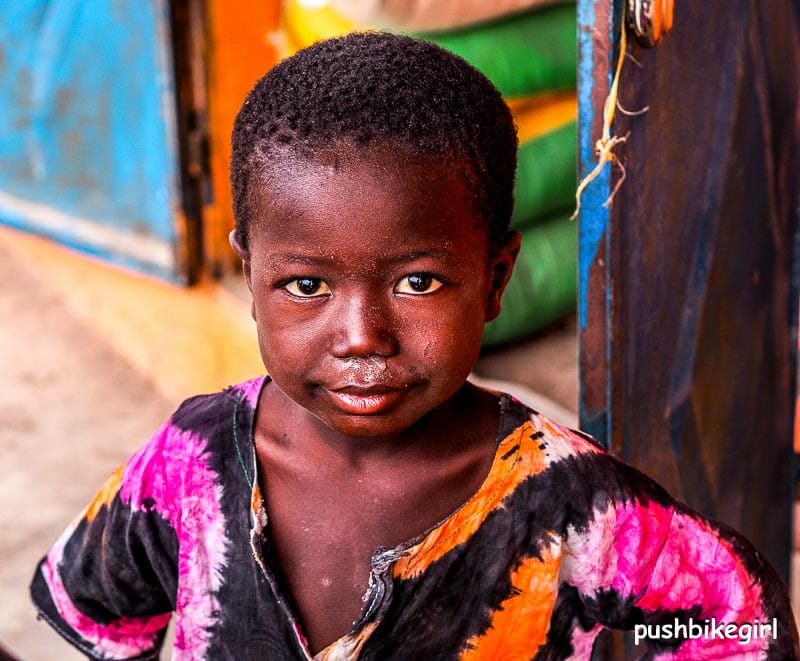
Many people often believe a cycling trip such as mine is exhausting, mostly because of the cycling. But I have to say that cycling is usually the smallest problem, especially here in the flat plains along the Gambia River and with the slow speed I’m going.
The mental challenge here in Africa is much more demanding, mainly because I am alone. I can rarely communicate with other Westerners, except by phone.
I would like to be able to ask other travelers how they are doing out here. What they think and feel when they experience the intensity of Africa on a daily basis.
Am I the only one who has difficulties with the begging, the garbage, and the injustice of life? It sometimes feels like I am powerlessness? A roller coaster ride of emotions is probably the best way to describe it.
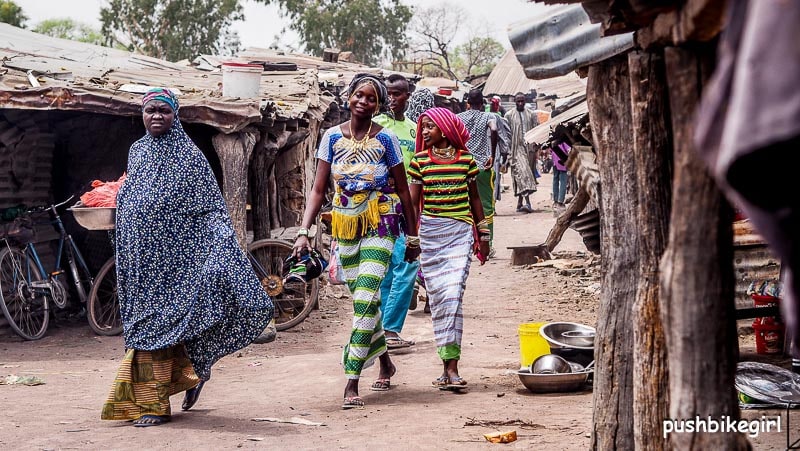
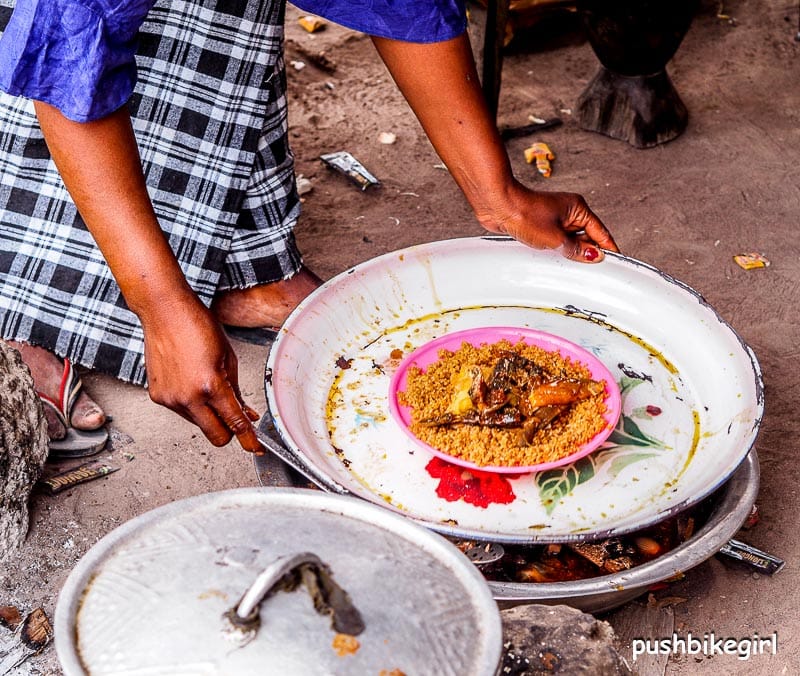
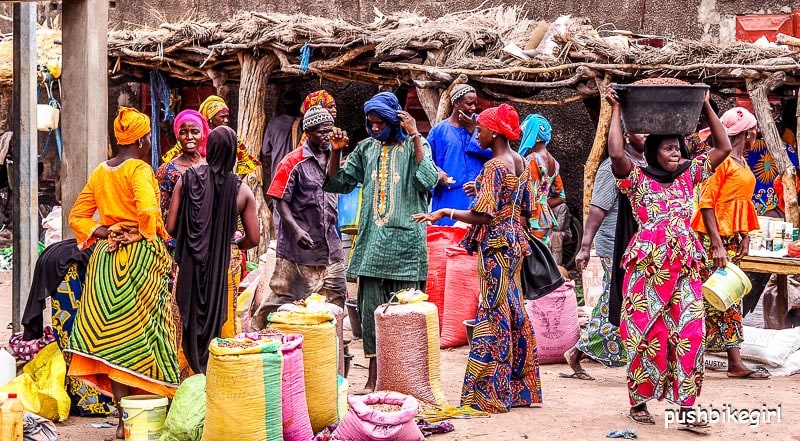
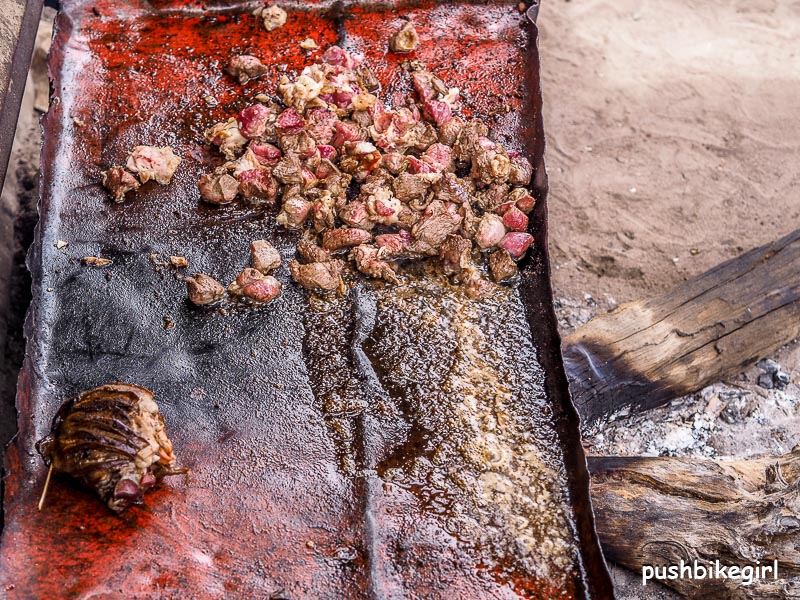
The mood swings which I am continuously experiencing are more extreme than elsewhere. This part of Africa is different from anything I have experienced so far. Put simply it’s very intense.
And of course, I know that I haven’t arrived in Africa’s most impoverished country yet. What I’m experiencing now may only be a foretaste. The Gambia ranks 20th among the poorest countries in the world.
When I look into the eyes of children stretching their hands towards me asking for my bottle, my T-shirt or my whole bike, I can tell myself a hundred times that it is not my fault that it is the way it is here. But the bitter aftertaste doesn’t go away.
I come from a privileged world. I have everything I need because I was lucky enough to have been born in the right place on the planet. These children here didn’t have that.
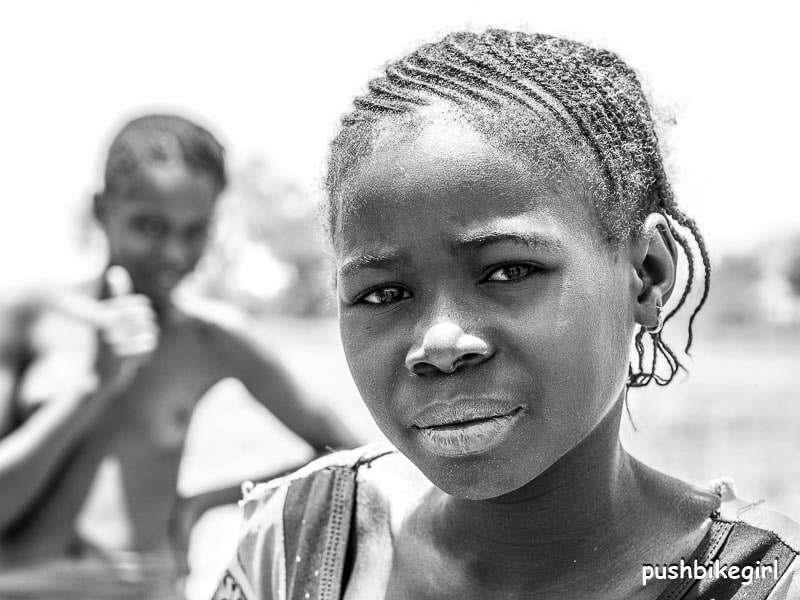
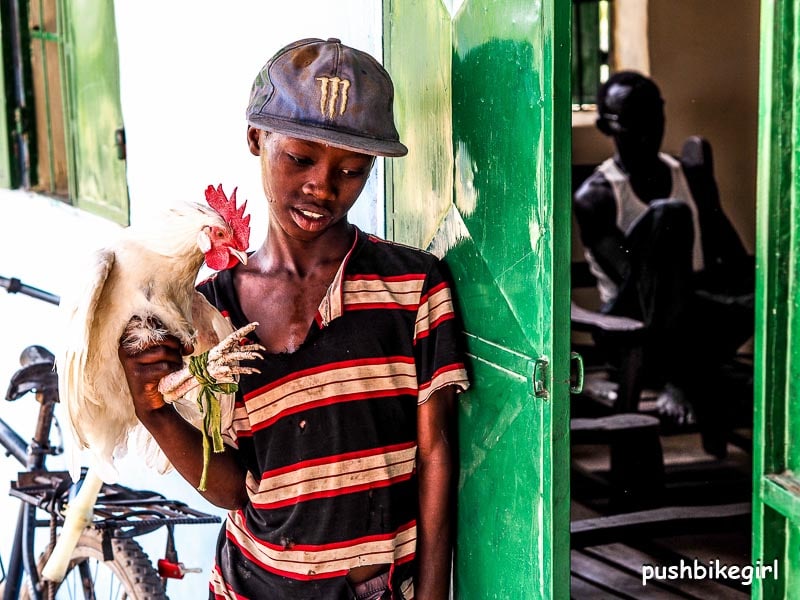
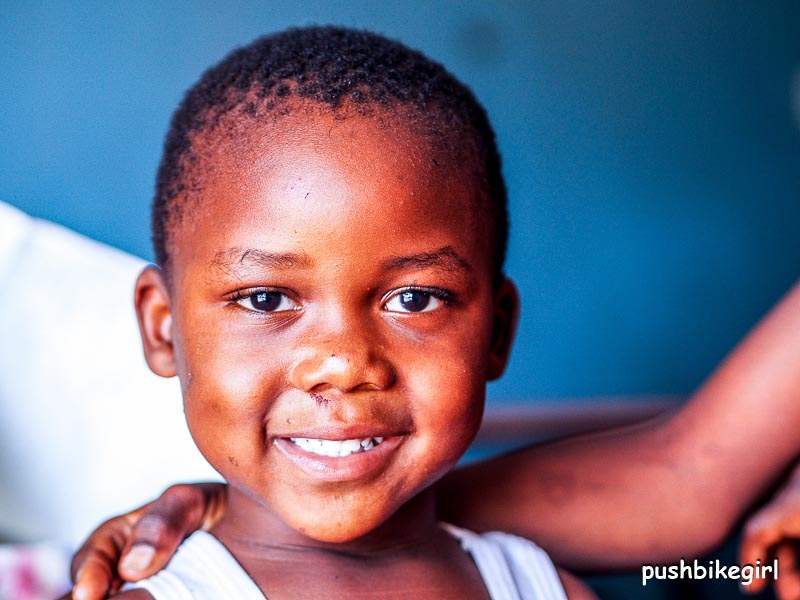
But my inner guardian angel then comes up with thoughts like this:
I grew up with the 2nd World War feelings of guilt that we Germans have towards the world still today, and if I am honest, I am tired of being held responsible for something for which I can do nothing about. I have neither colonized nor exploited these people.
And yet my skin color is white, and I have to take emotional responsibility for what we whites have left behind here. Whether I want it or not.
But do I even know if people accuse me? Or does it just feel that way? Only once have I been told by an African that we whites are to blame for everything. Otherwise always only from other whites, who are probably on the same rollercoaster as me.
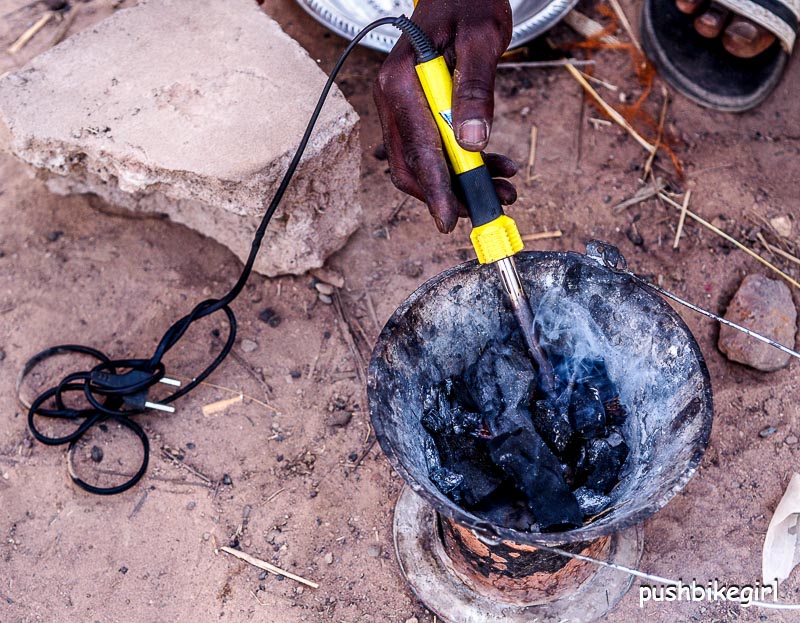
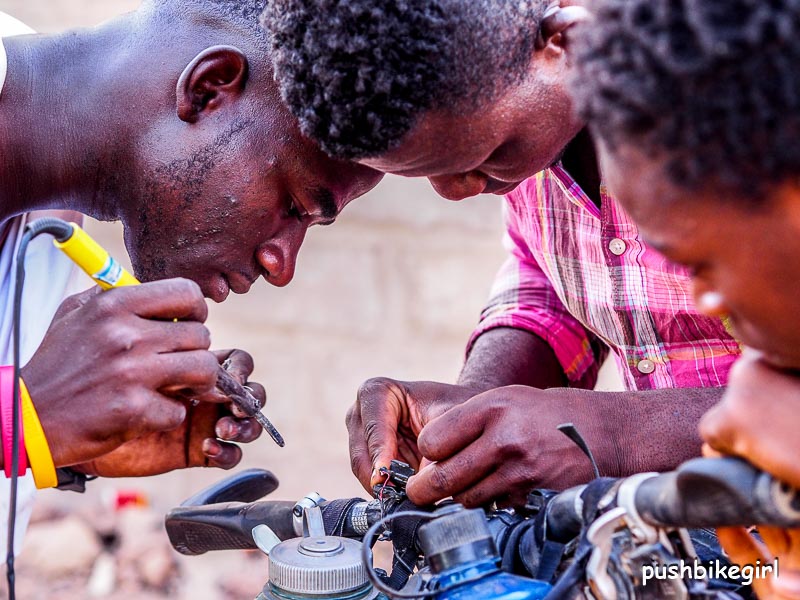
Feelings of guilt are unpleasant, and I try to free myself from them every day. They paralyze me and take away my joy, and that is not good.
If I wanted, I could make it easy for myself and lie on the beach like other tourists and travel to the tourist attractions. Where it’s easy to meet other Westerners, get tasty food, sleep in beautiful accommodations, and fade out the rest of reality and call that vacation.
But for me, this would be like noodles without sauce or parties without guests. Or like a man would say, like sex with a condom.
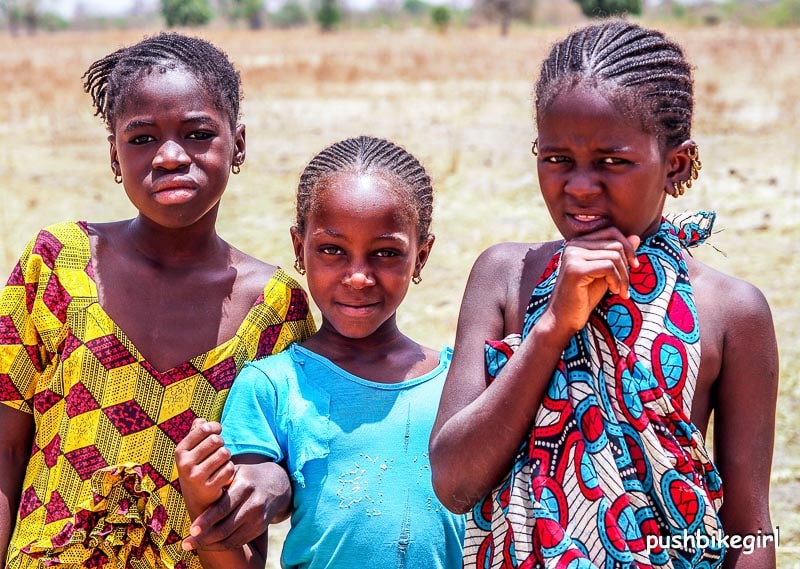
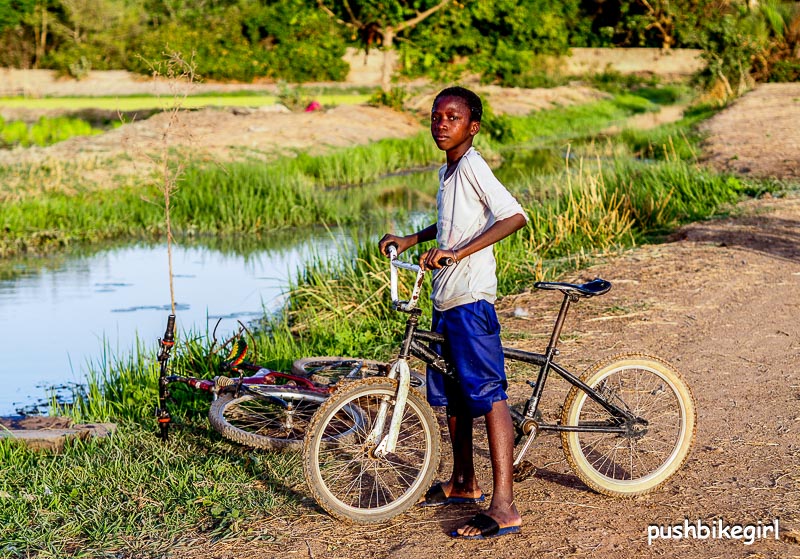
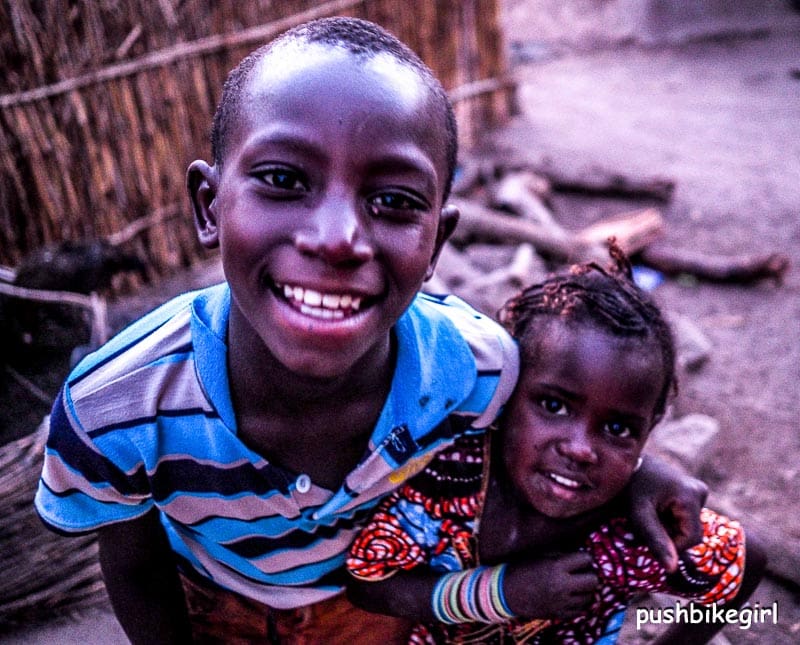
When I have just torn myself away from the last eyes of a child, I soon look into the next ones, and the game starts all over again. Sometimes I see them as joy and lightness, but at least as often I see hope, an expectation that I can’t and don’t want to fulfill. I can’t help these people; they have to help themselves.
But maybe I always see myself in their eyes. If I am in a good mood, I see them shining positively; if I am in a bad mood, I see the expectations. In the end, I think it is probably the case that I am often overwhelmed.
Who wants to see that people live under miserable conditions?
And what actually are miserable conditions?
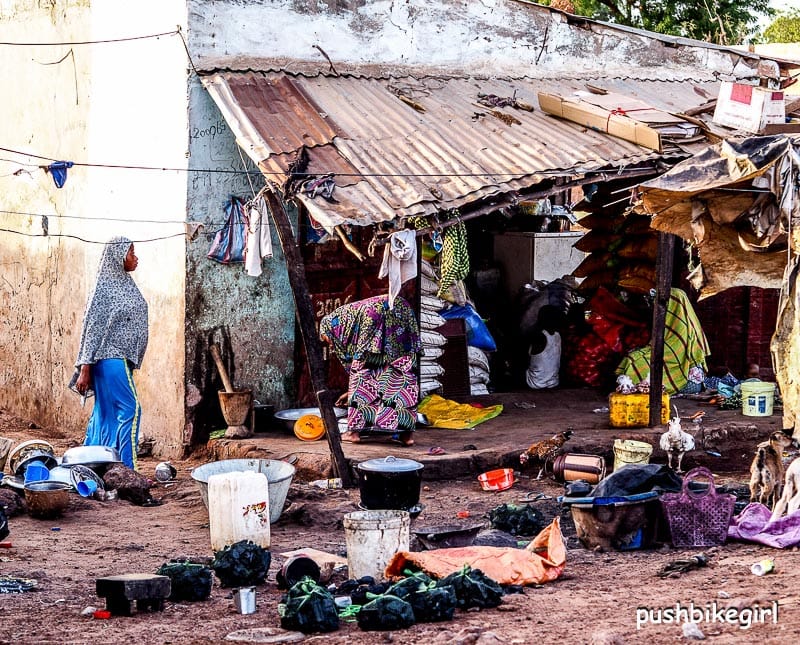
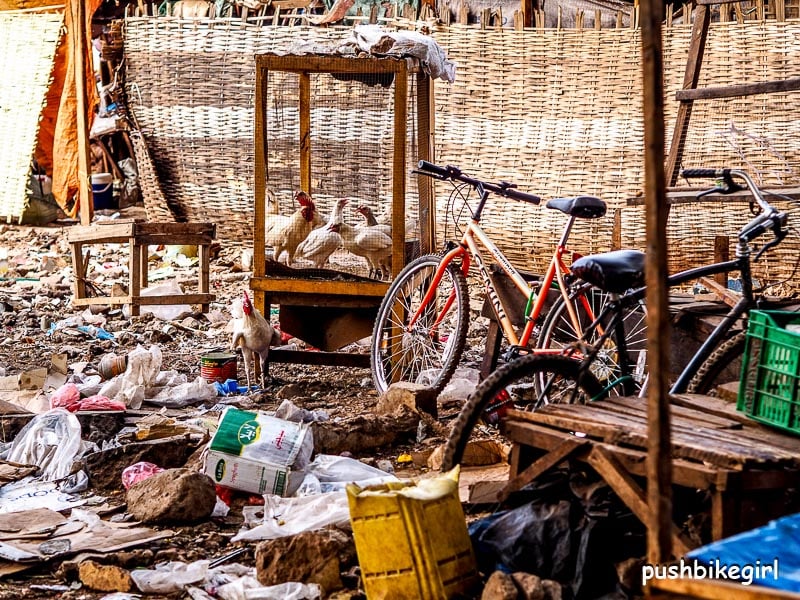
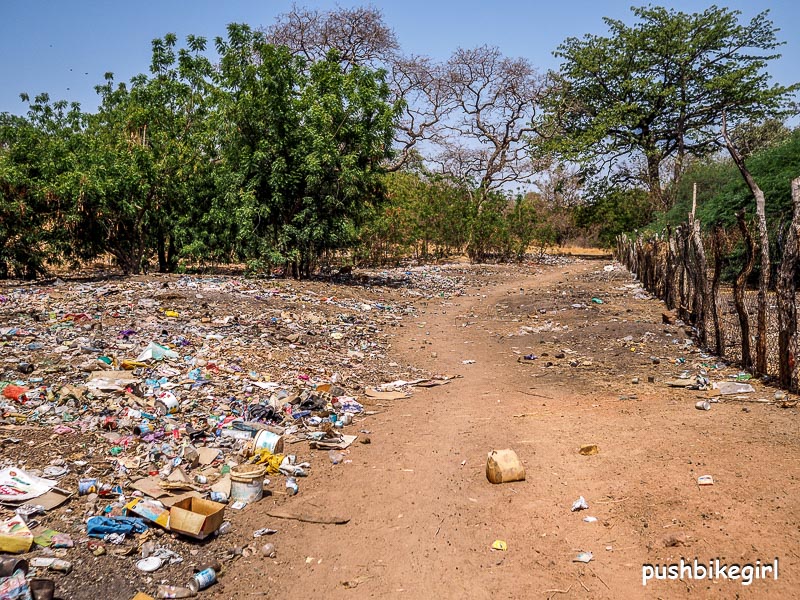
I don’t see anyone starving here, nor do people look ill or malnourished. The men are muscular, the children climb and run much better than children in the western world, and the women are better trained than Westerners who go to the gym.
I think what I’m most surprised at, shocked or disappointed about is the fact that I imagined that Africa is still a little bit of a healthy world. A world where it’s not just all about money. But that was a fantasy.
Perhaps it has only developed so negatively in recent years since the enemy – the mobile phone – has entered our world and brought faraway places right to our doorstep. Even here in the bush in Africa. Because if the people here own something, then it is a mobile phone.
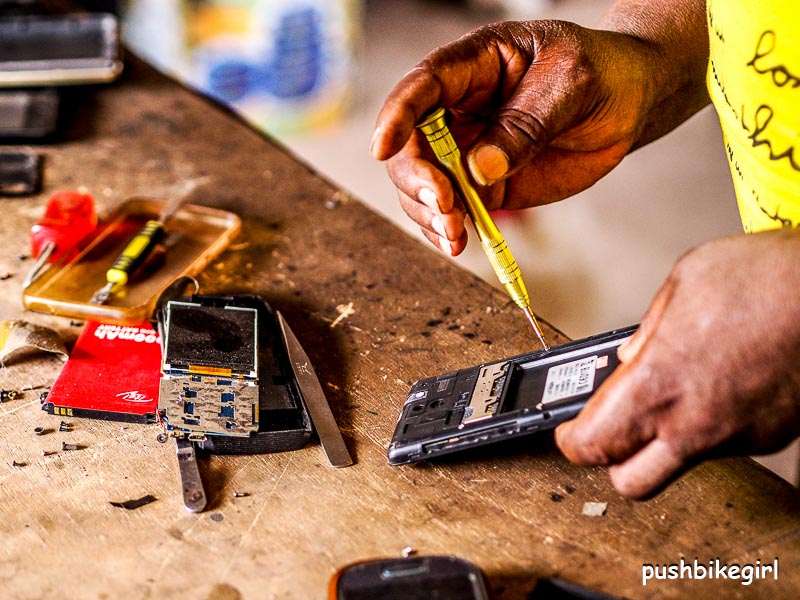
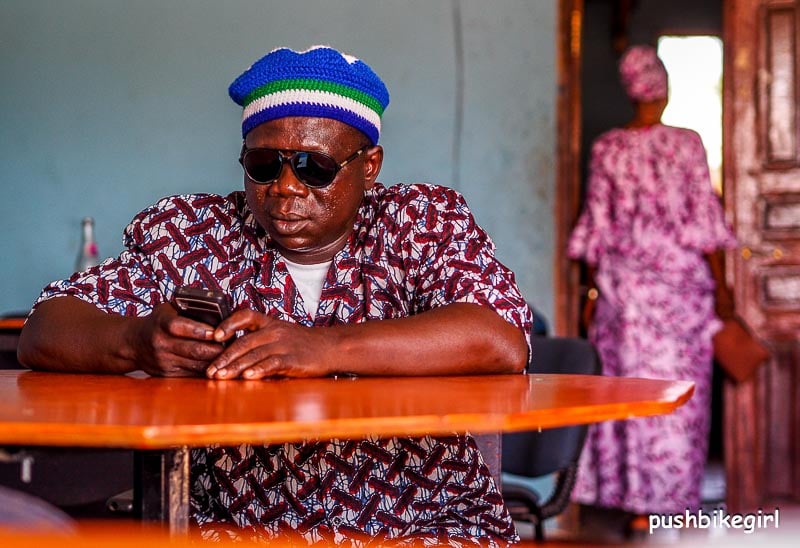
To be white in Africa is of course far from the kind of suffering as to be black in Europe or elsewhere, but to always be the center of attention and to be seen as a donor and helper in all situations is not easy.
But there is also the other side here. People like to share. Every day anew I am called to eat with them, to spend the night on their property or to drink tea. Then I eat with the men from a communal bowl, we laugh, and the world is alright again.
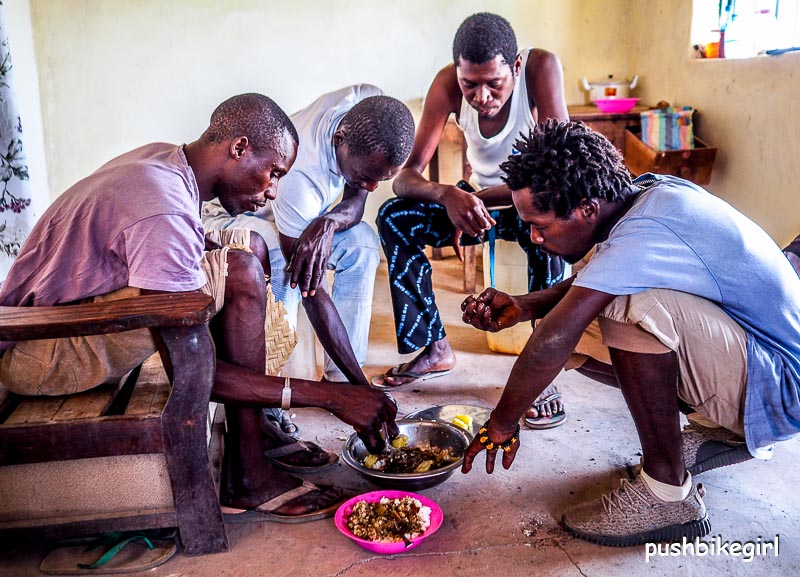
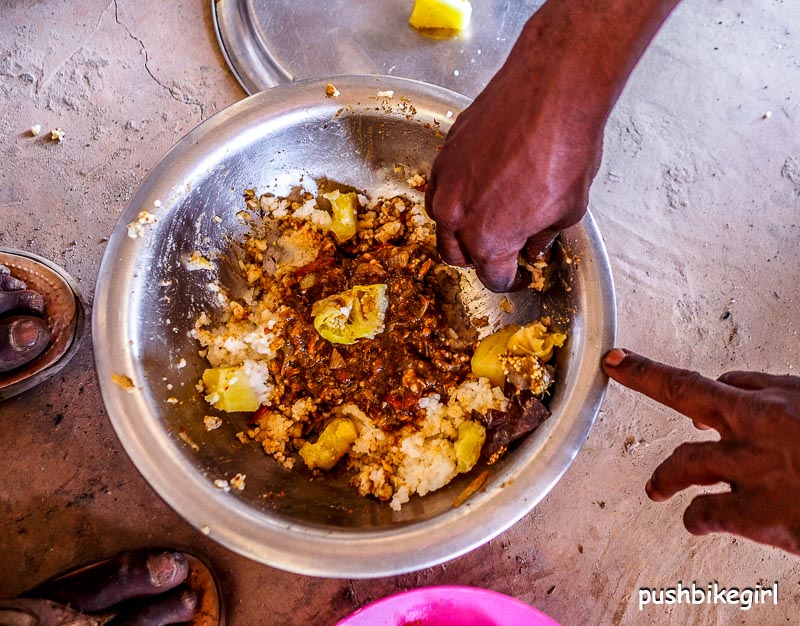
Gambians have an extraordinary laugh. Pleasant, open, and happy. And what impresses me, even more, is how beautiful they all are — gorgeous looking people.
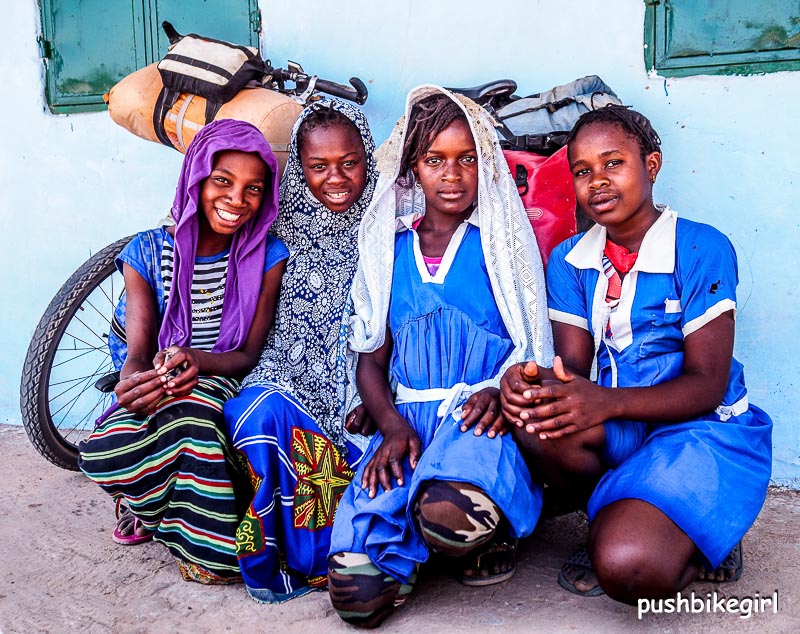
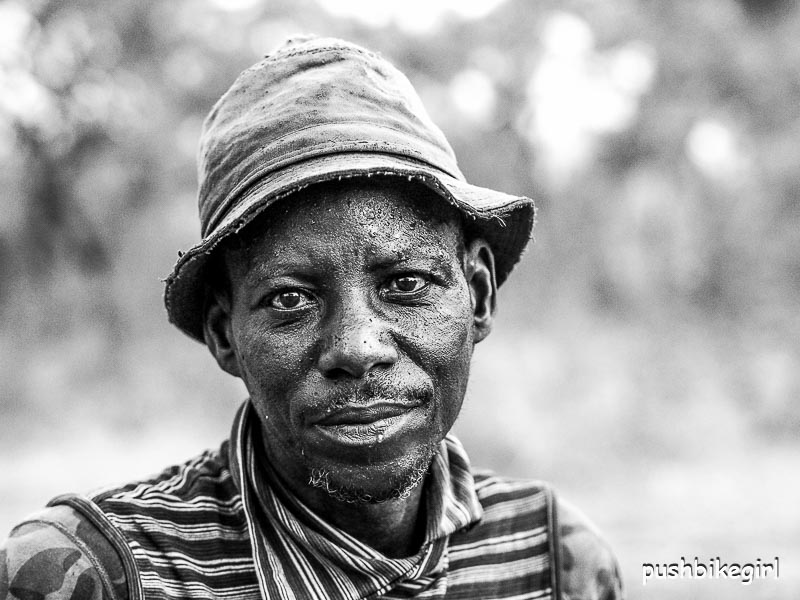
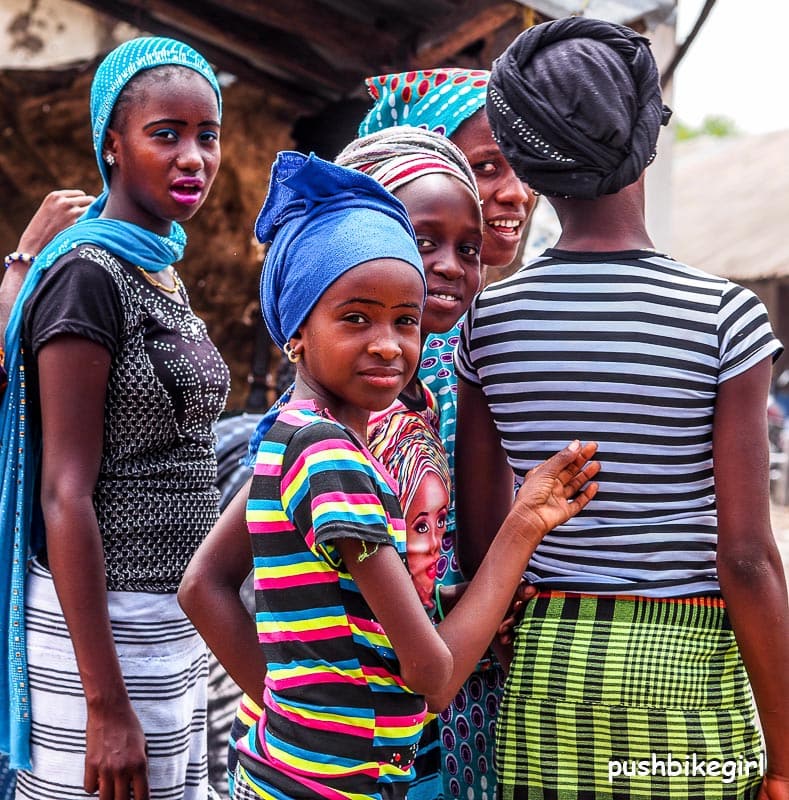
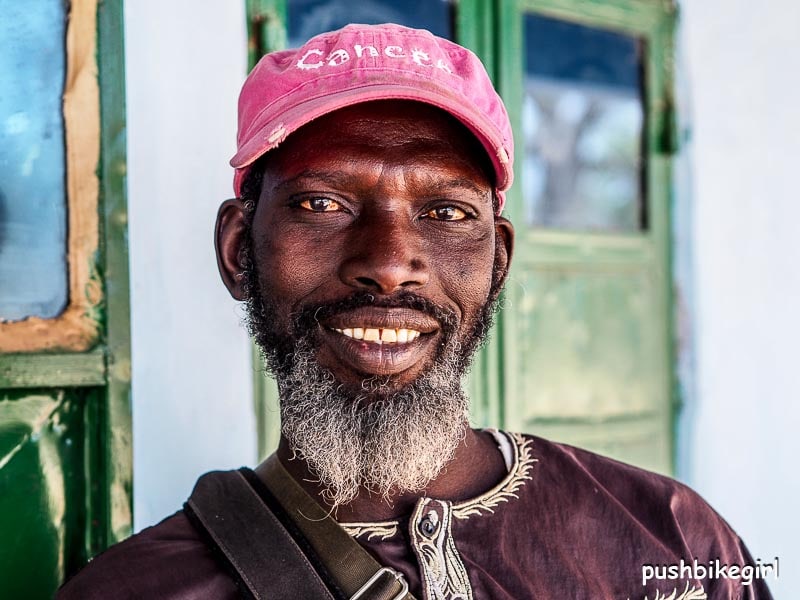
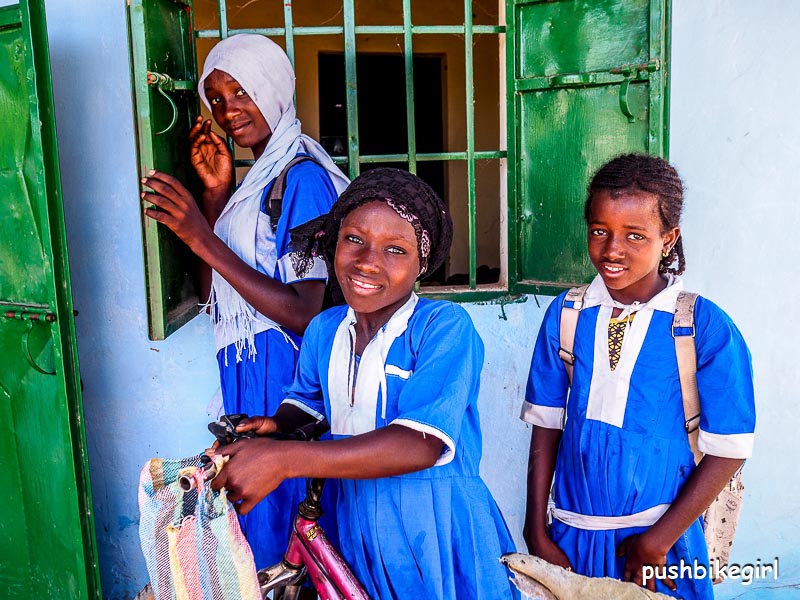
They keep their houses and properties clean. The women sweep the sand in front of the house every day. I see laundry hanging in the bushes all the time, and I have only admiration for how people in this heat and under these circumstances manage to wear such clean clothes.
I, on the other hand, always look as if I just had a mud bath, so that I am often asked if I want to wash, which of course I always like to accept.
I lost my towel a long time ago, but in this heat, nobody needs a towel in the first place, quite the contrary. I wash my clothes with every “bucket shower,” put them on soaking wet and have at least a little bit of coolness for a few minutes.
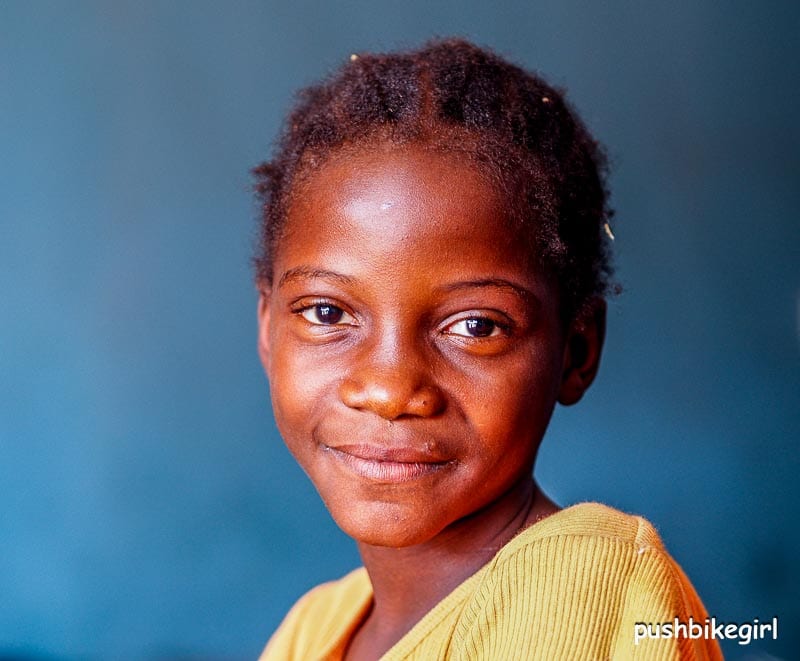
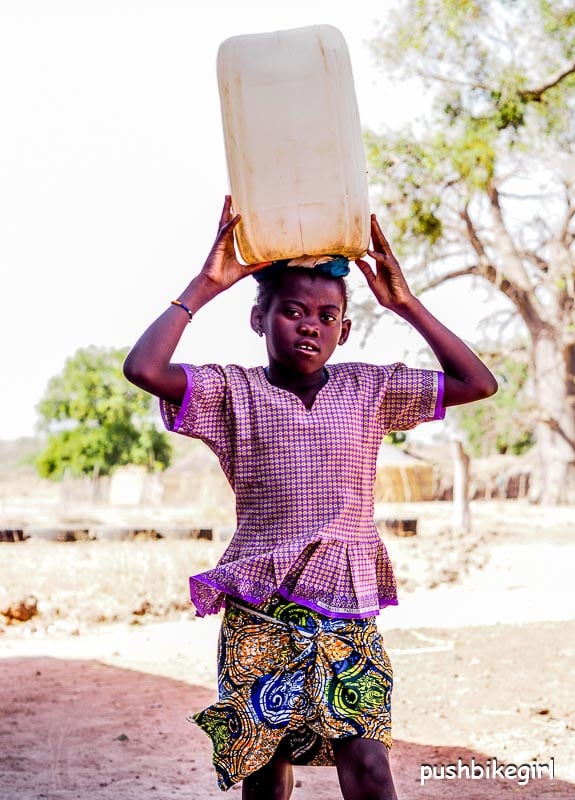
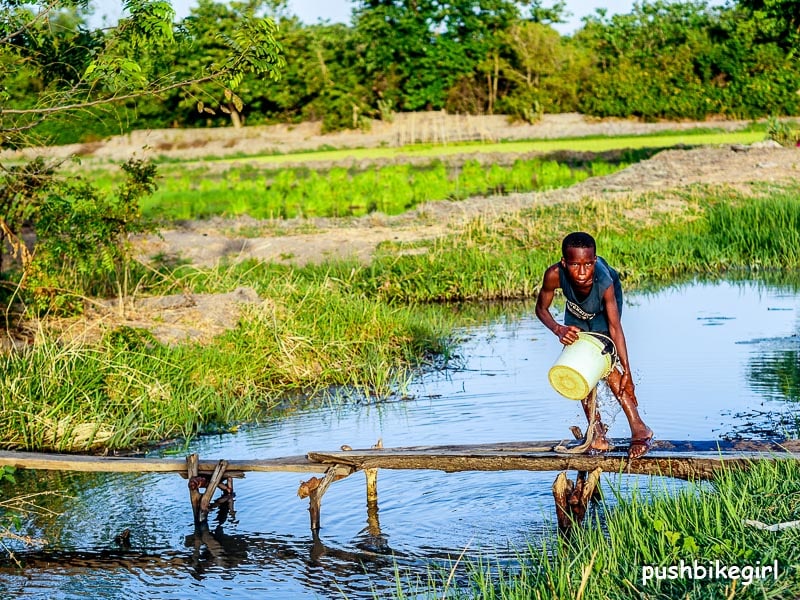
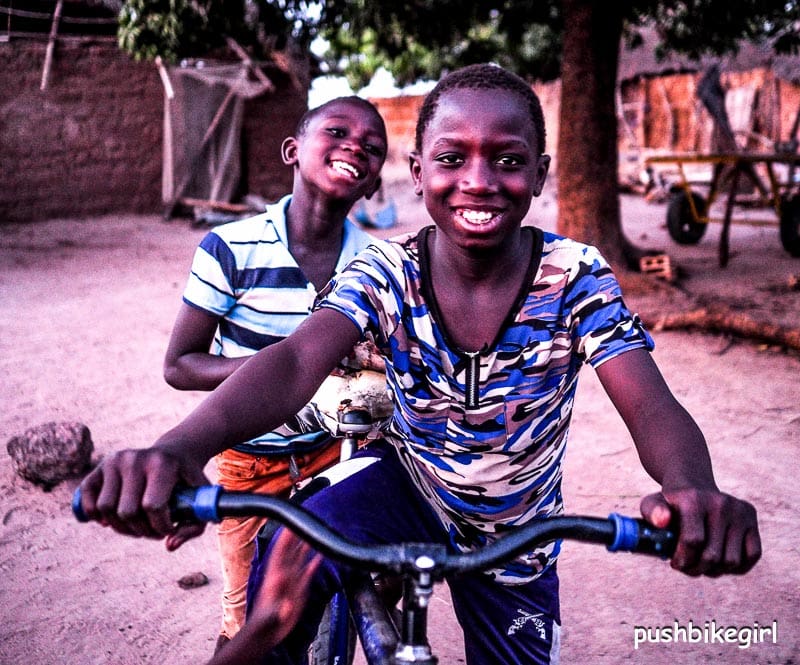
I was happy every day when children brought me mangoes from the trees without expecting anything in return. And when people asked what my name is and they managed to pronounce it right away saying “Heike, that’s a beautiful name.”
Or when people were curious and asked me where I came from and where I was going, or when I got water or tea. I like it too when they asked me to sit with them and tell them stories. I found them to be great people with big hearts.
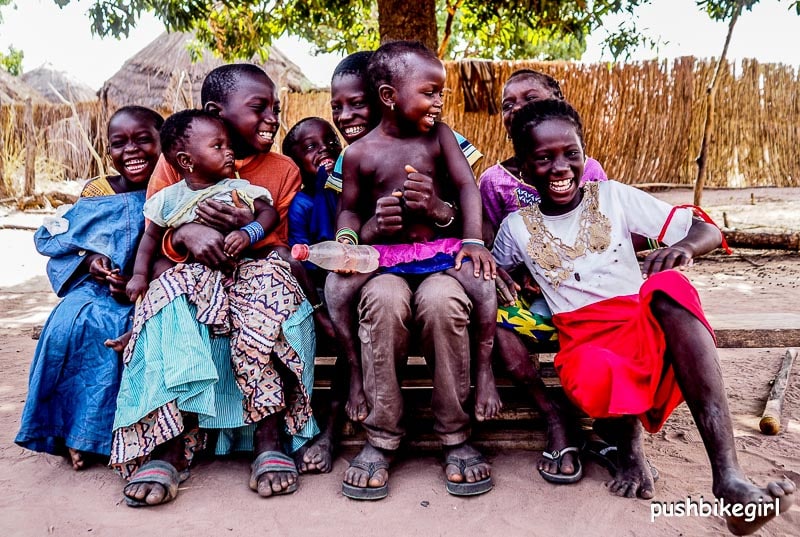
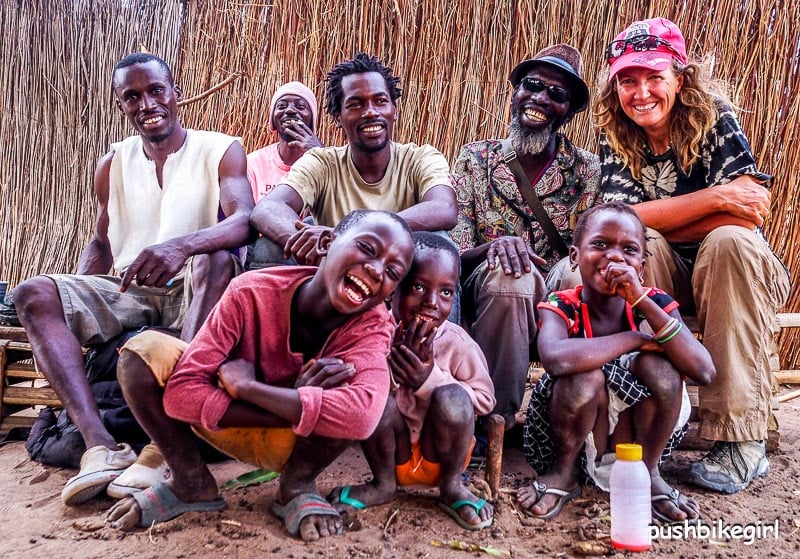
I will carry a lovely memory of a little girl and her family somewhere in a tiny village. I camped on their property, and the father played Bob Marley’s – Buffalo Soldier – on his old mobile phone and we danced to it half the evening. Always the same song.
The little girl looked at me radiantly every time she tried to say “Buffalo Soldier.” Snot was running out of her nose, and her eyes were glowing, as unbiased as only children’s eyes can shine. I would have liked to put the girl on my rack and taken her on my journey to show the tiny lady the world. She had won my heart.
Buffalo Soldier has always been one of my favorite songs; from now on this girl’s eyes will always be connected with it.
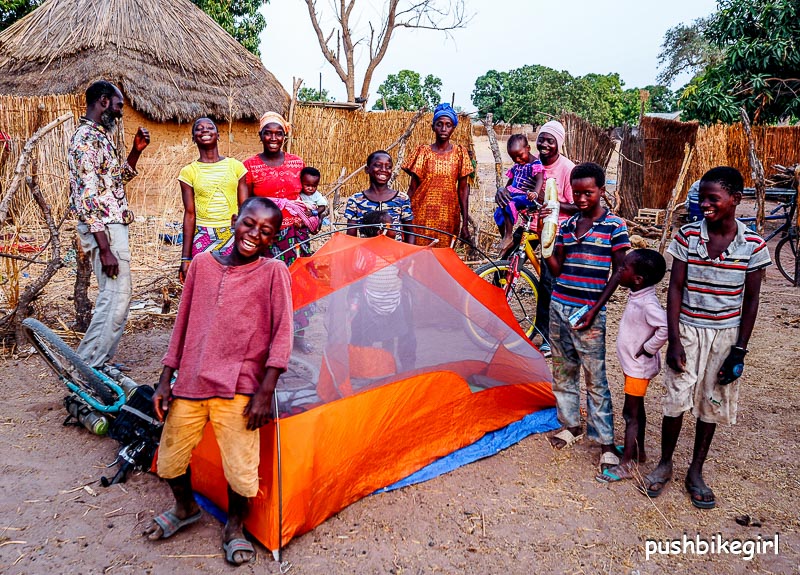
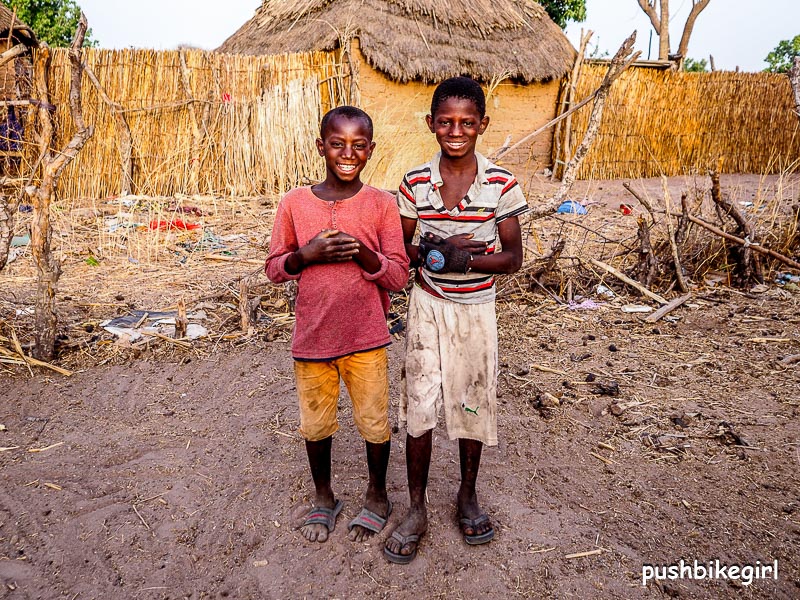
An extraordinary evening, which ended with the fact that I could hardly sleep because goats and cattle ran around my tent and woke me up over and over.
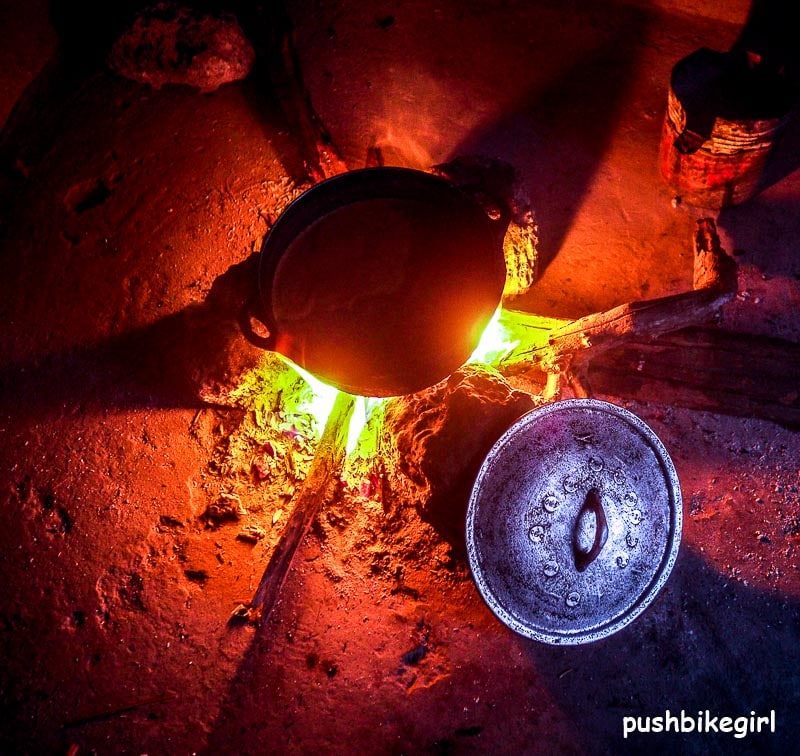
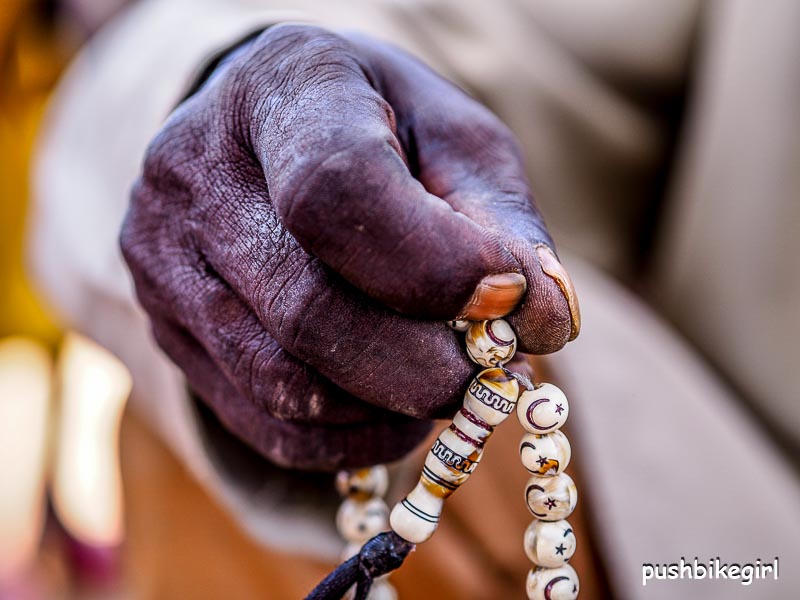
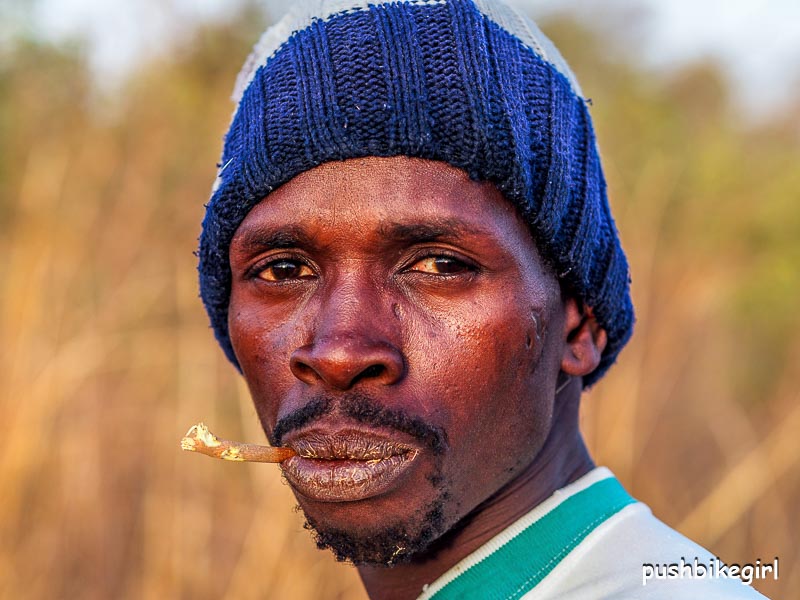
In every small town, countless aid organizations left behind not only their projects but also their huge signs. Signs on which the aid organizations names appear and the reasons why they came to help.
Signs advertising who had built the hospital, school, or one of many wells. Even a project that works for equal rights for women.
What is it like when a person walks by a sign every day saying: “UNICEF – against hunger, malnutrition, and poverty”?
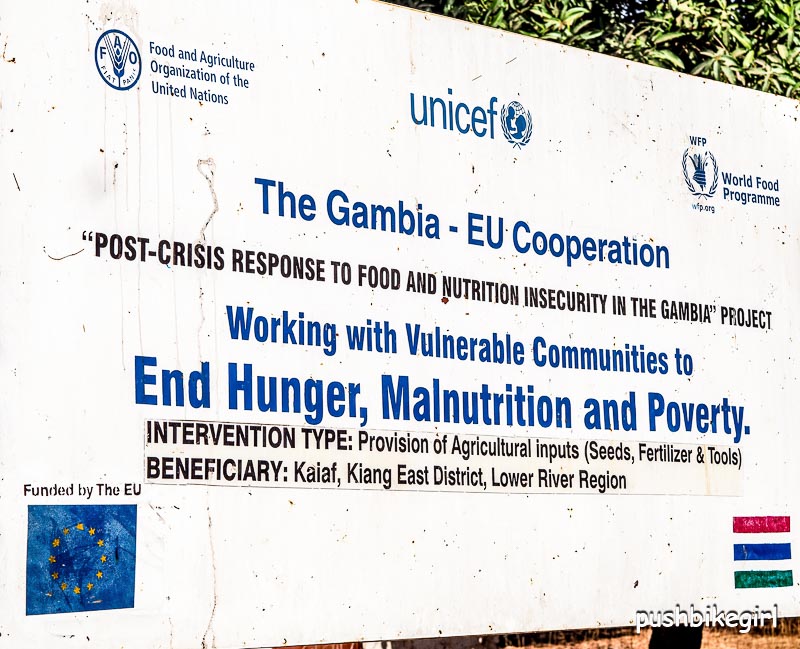
Does it not remind a person every day anew that he is poor and that white people must or want to help them so that he does not go hungry? What other kinds of thoughts are triggered by seeing these signs every day? Why do aid organizations feel the need to leave these huge signs behind – it is often the only sign in the village.
I have frequently been asked if I am on the road for the Peace Corps, an aid organization from the USA. They seem to connect a white person very often with someone who is only here to help.
I met two Americans who had been living in the country for two years and were involved in a cultural exchange with their host families. When I asked them if they thought they were doing something worthwhile, they couldn’t give a real answer. One of them told me: “I doubt my mission every day.”
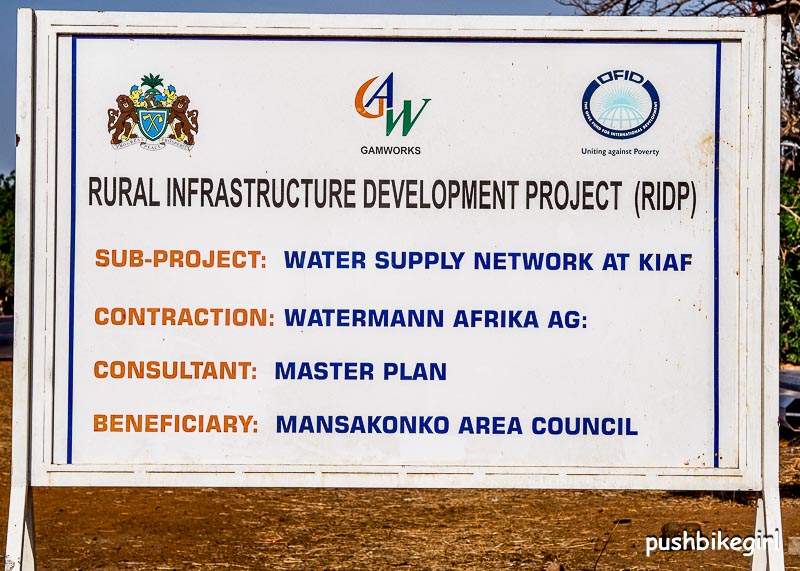
Georgetown gave me the chance to talk to economic refugee returnees. Some who were tortured in Libya and did not make it to Europe. Unfortunately, I was not allowed to attend their meetings because people were afraid that I was a spy sent from Germany.
But I was able to talk to two of them outside of the meeting. What made me feel positive from this conversation was that from their experience they learned to take their lives into their own hands from then on. One of them had planted a large vegetable garden since returning and proudly told me that finally, he has something healthy to eat every day.
“I understand now that leaving was not a solution,” he beamed and added: “I just wanted to come home again. I was so afraid they’d kill me, I’m so glad to be back.”
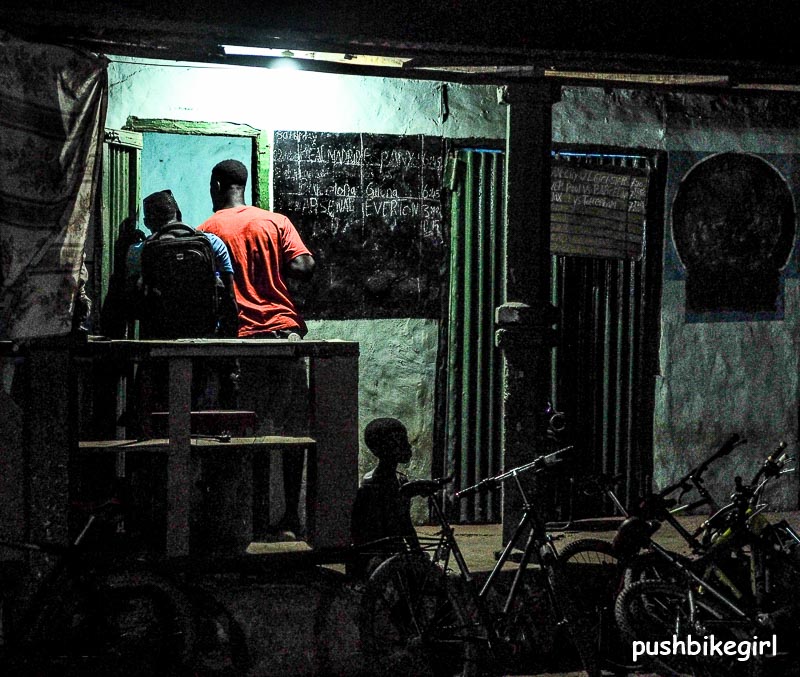
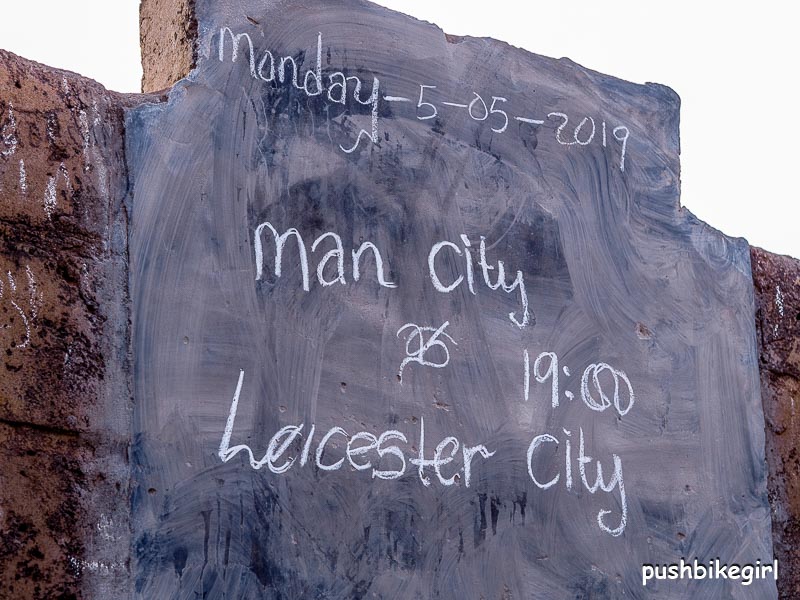
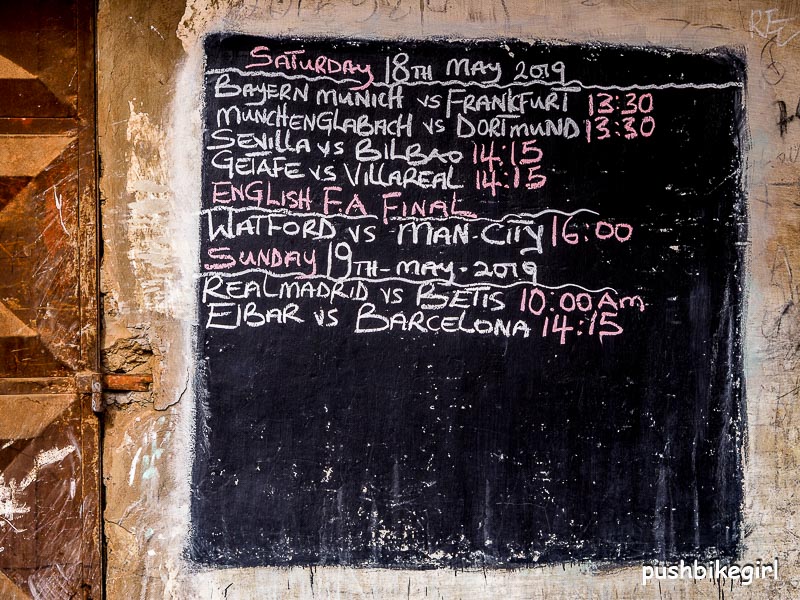
In the pub, we discussed for hours life in Africa and Europe. Sometimes it ended in a heated discussion because they didn’t always trust me.
One had had the chance to visit his brother in Switzerland. “I never wanted to live there. The police asked for my ID every day; the people ignored me; nobody greeted me. They are not friendly people. They are racists” he was shocked by how people treated him in Switzerland.
“I tell everyone this again and again, but they don’t believe me, I don’t understand why they want to go to Europe, it’s much nicer here,” he added.
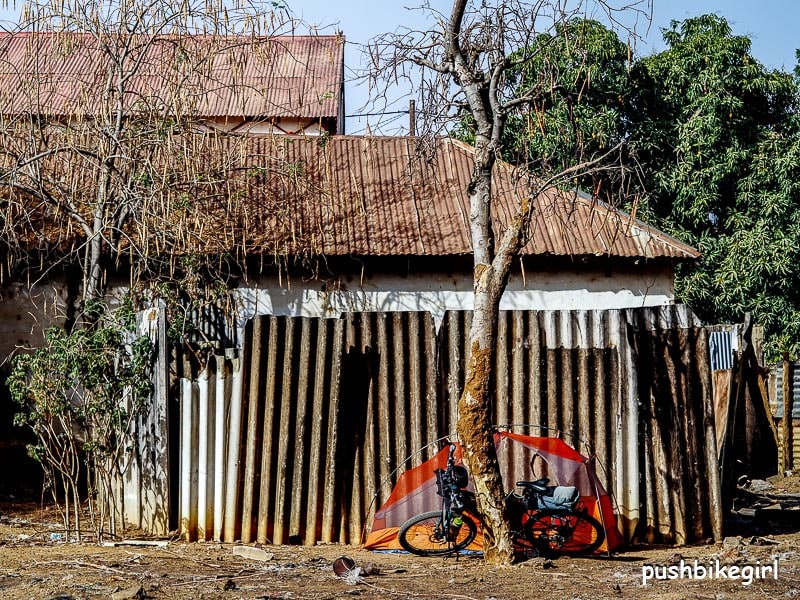
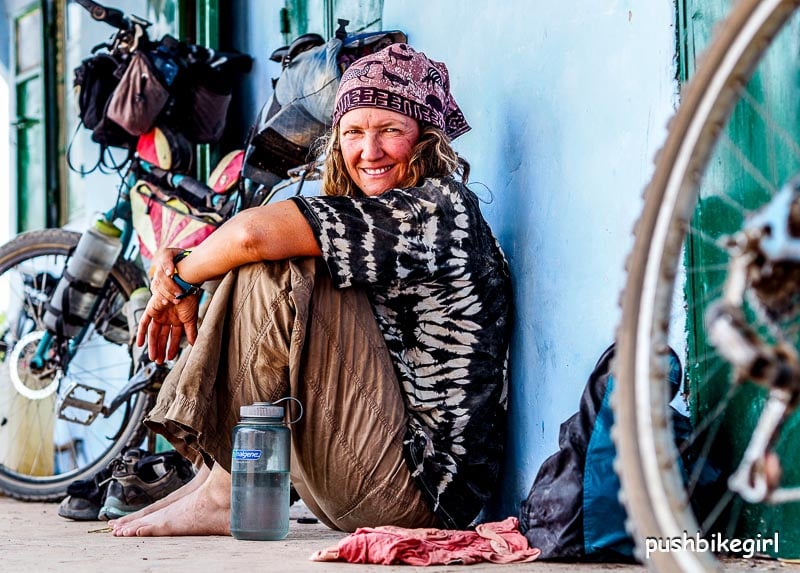
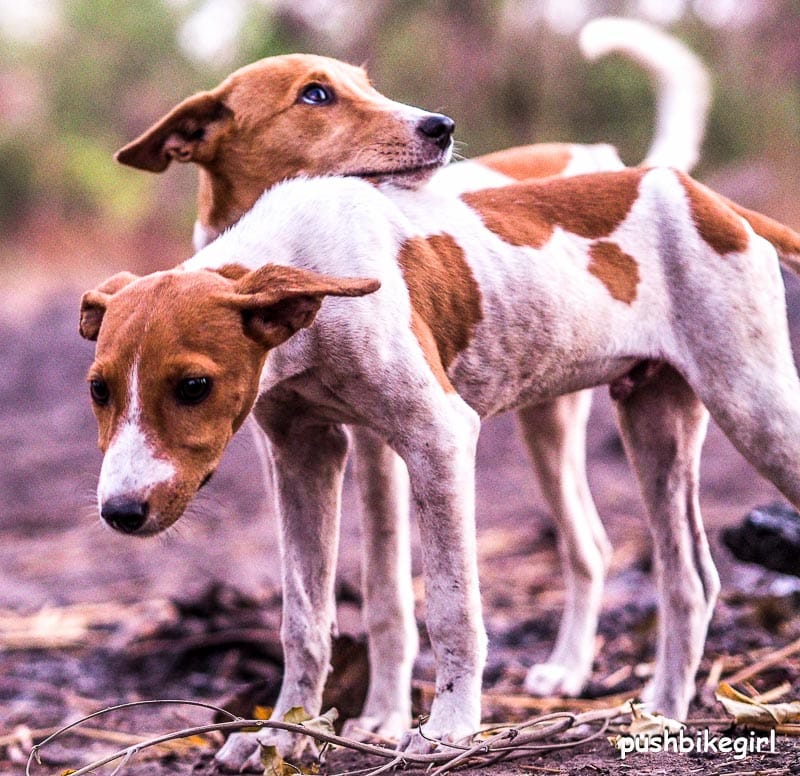
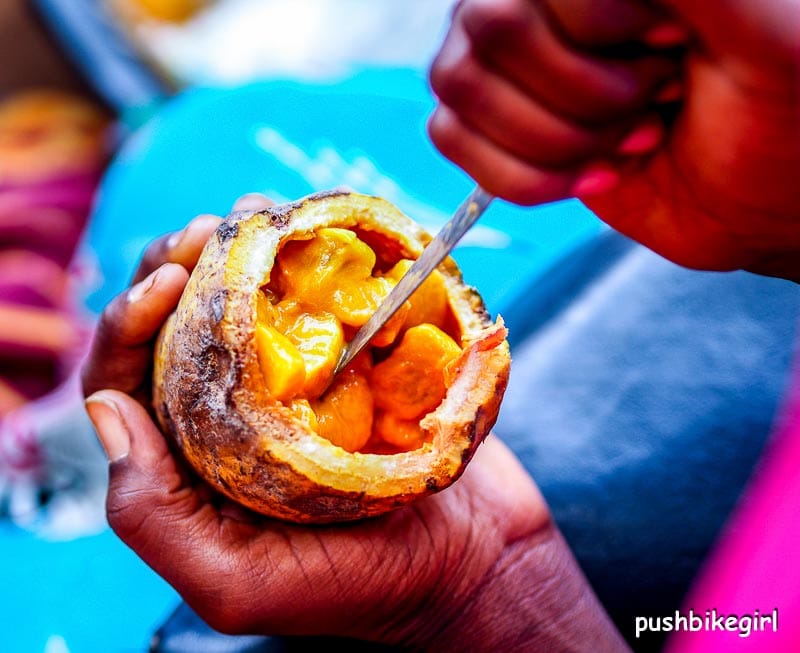
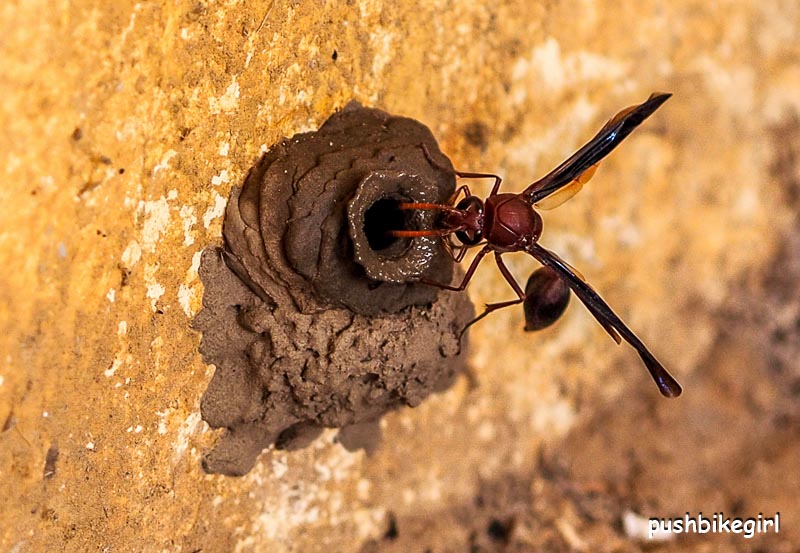
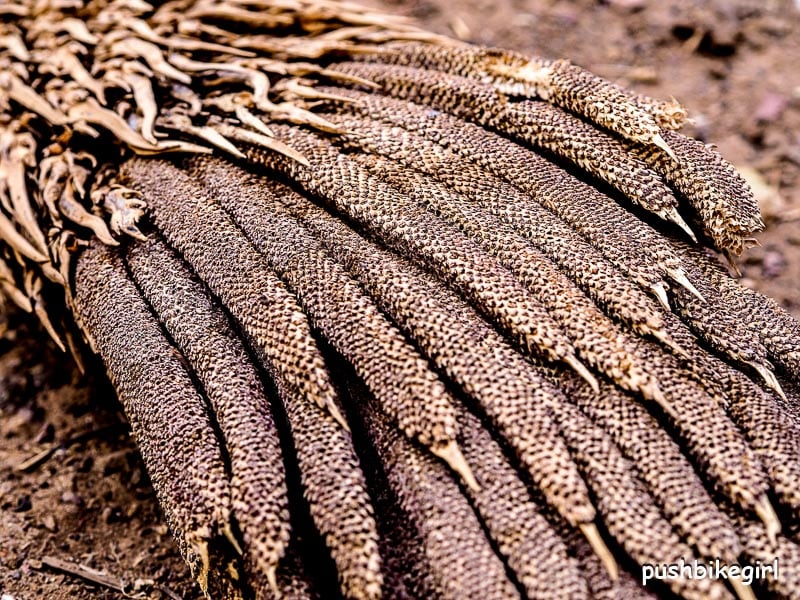
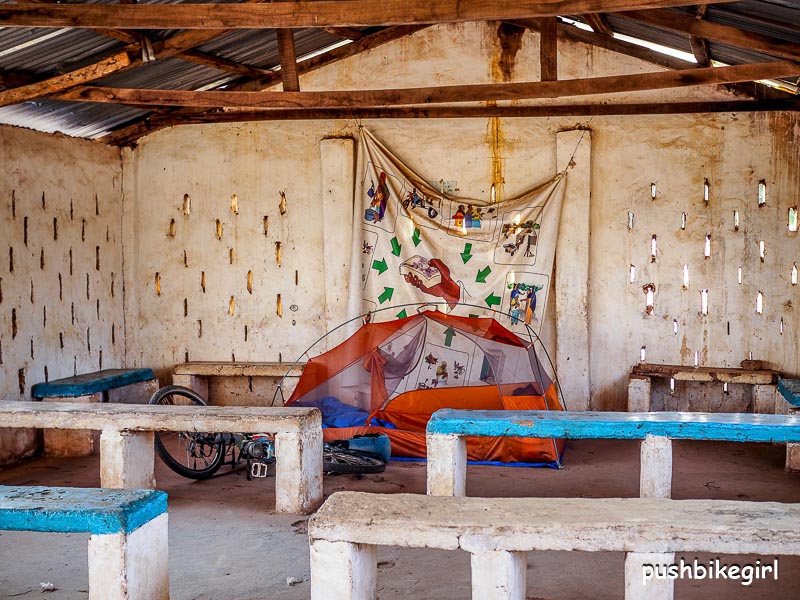
Having passed the stone circles listed as a UNESCO World Heritage site, I continued to the River Gambia National Park, where I had a great time.
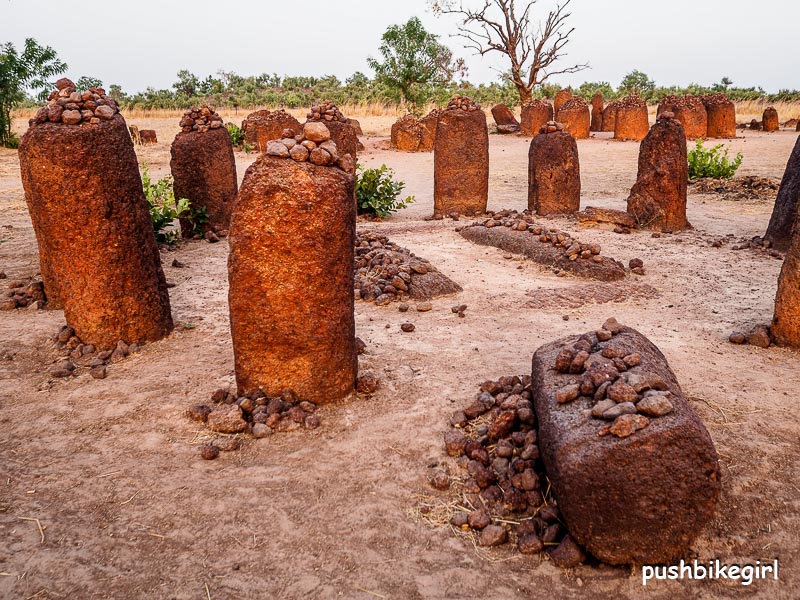
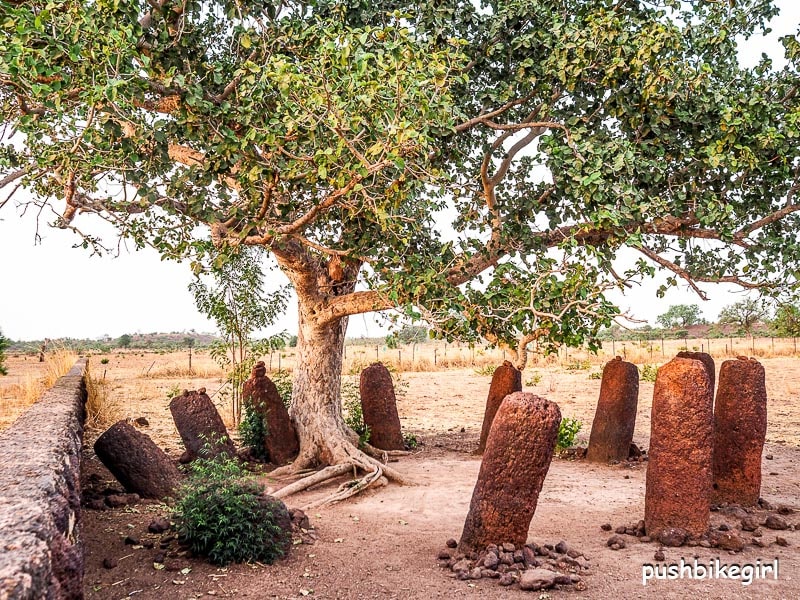
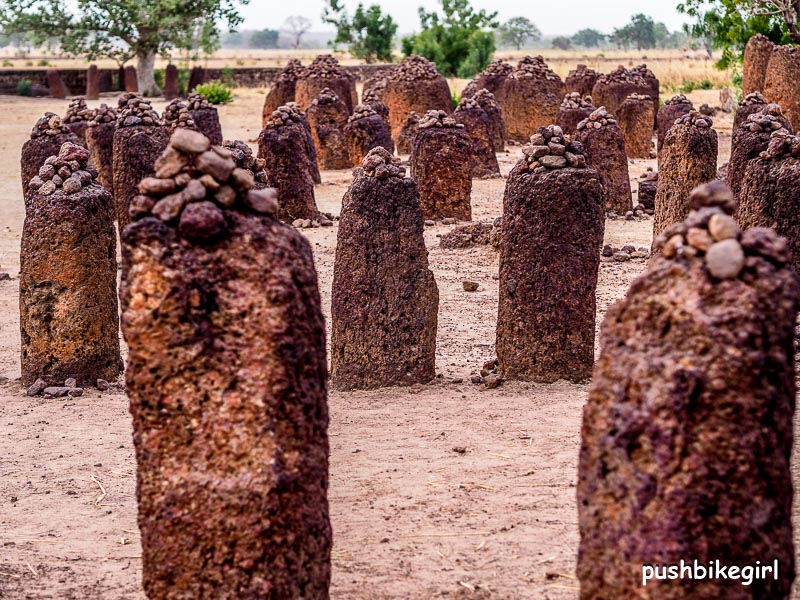
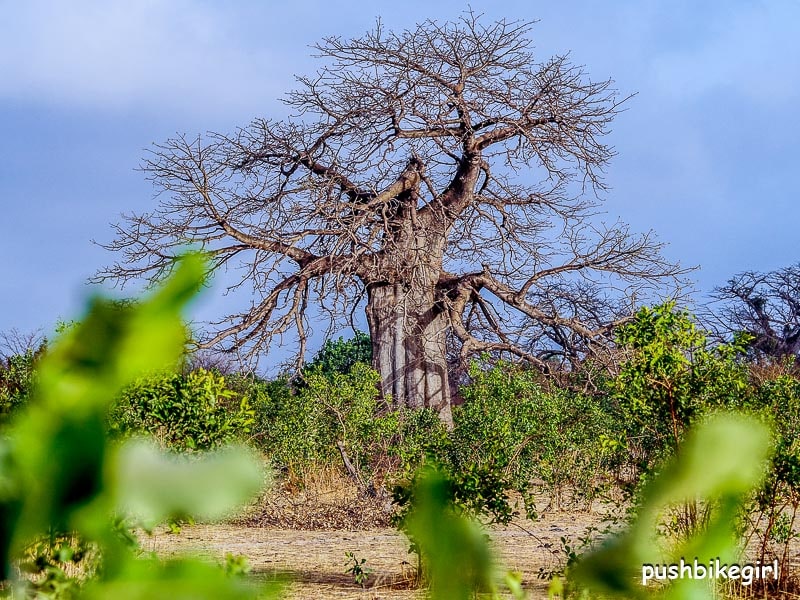
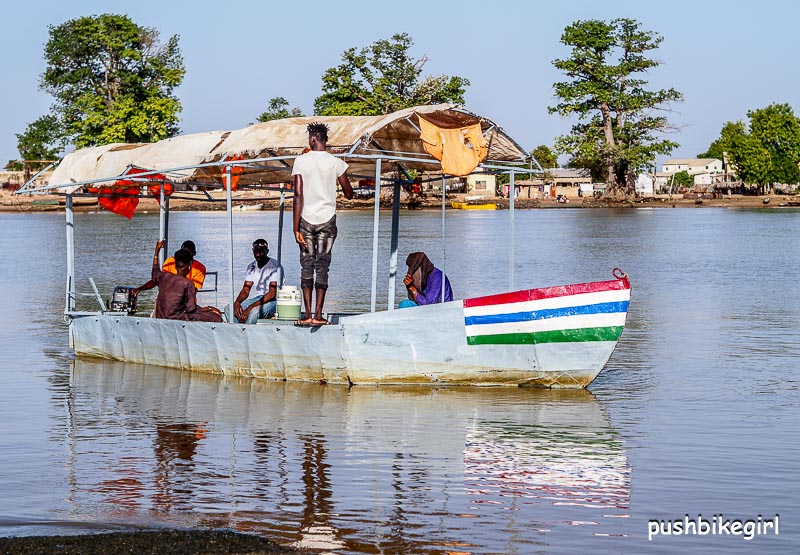
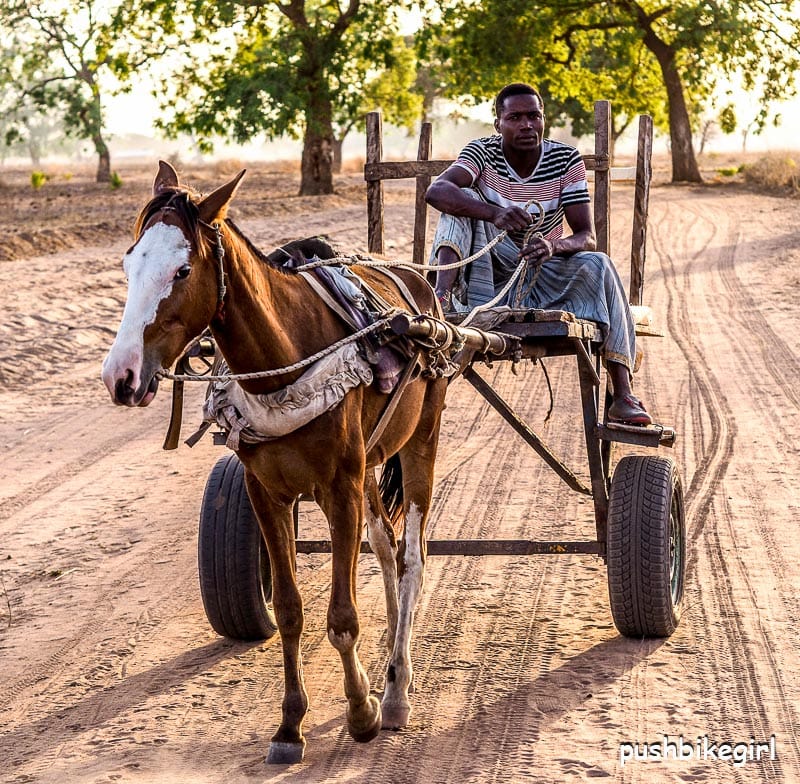
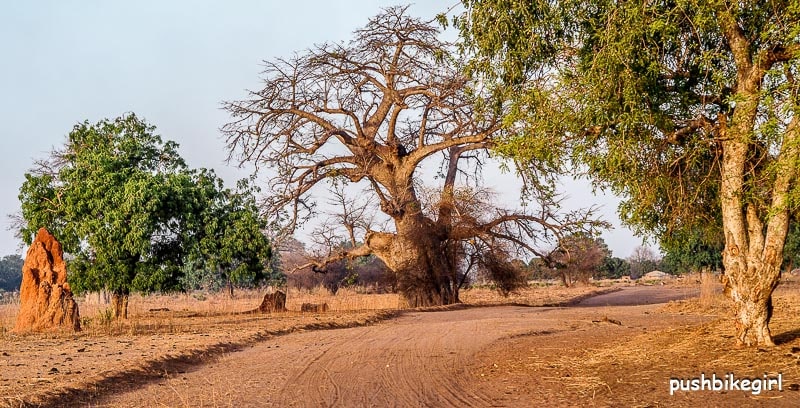
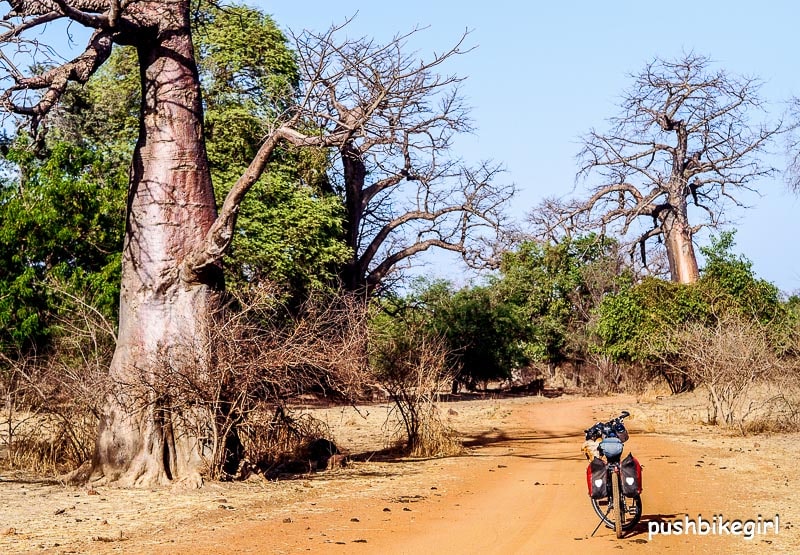
I chose a very special Baobab as my sleeping place and spent a few days there in the moonlight. Baboons came to visit; birds chirped their songs every morning. Cattle grazed around me, and at night, it was pleasantly quiet and not so hot.
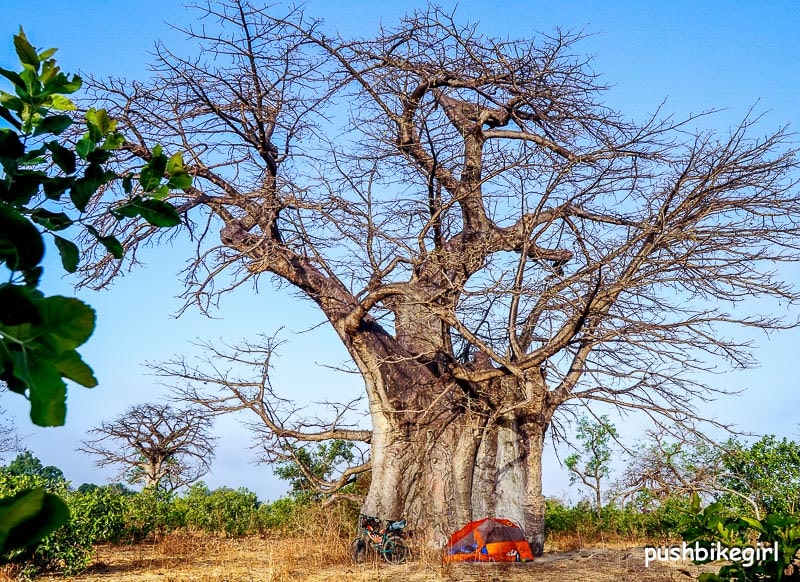
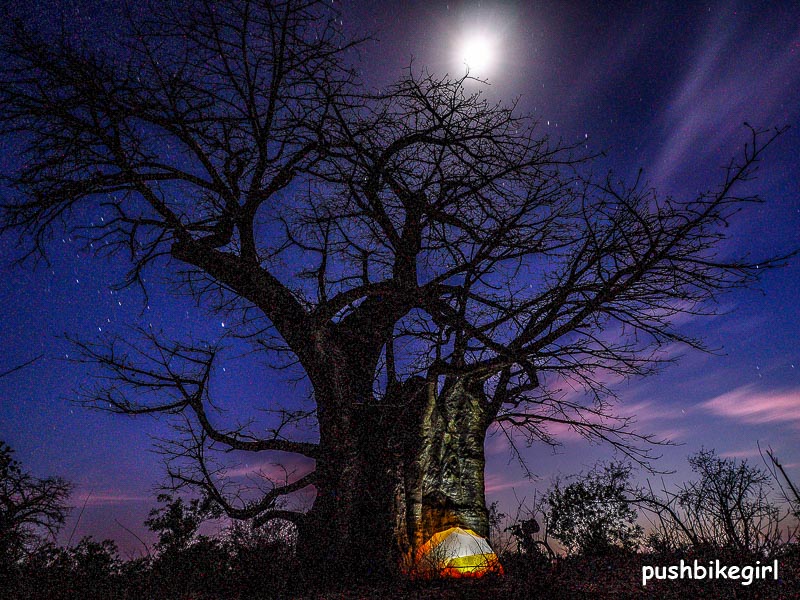
I made friends with a few men who sat together every day drinking tea.
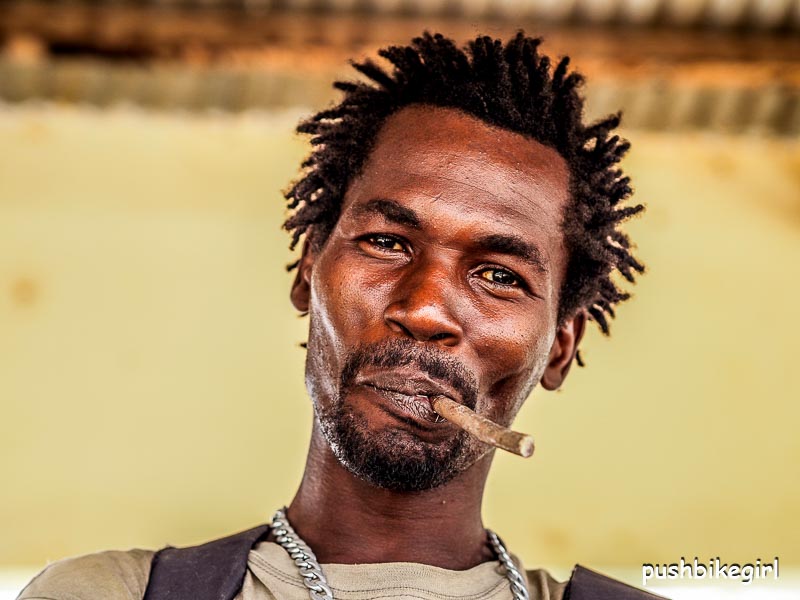
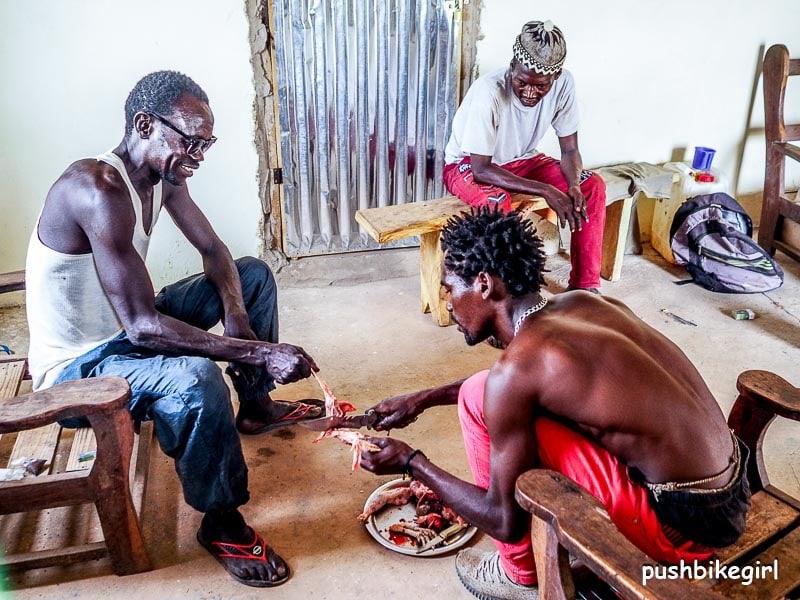
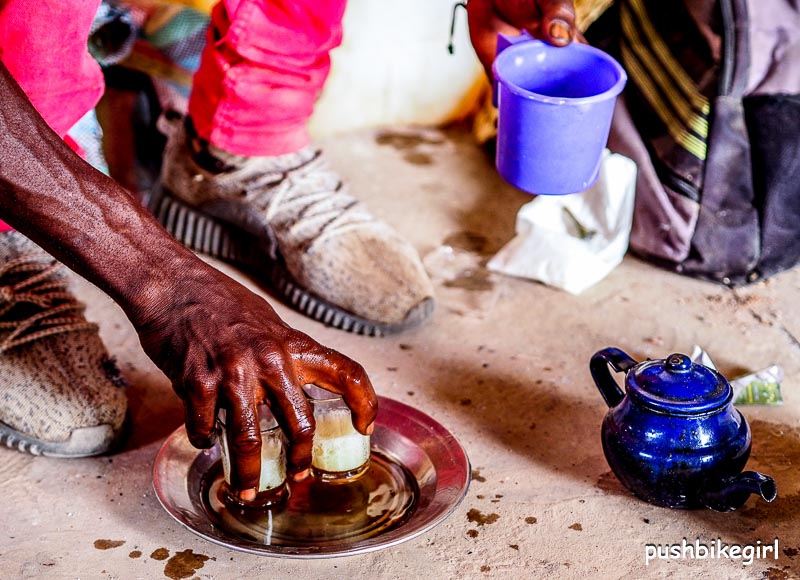
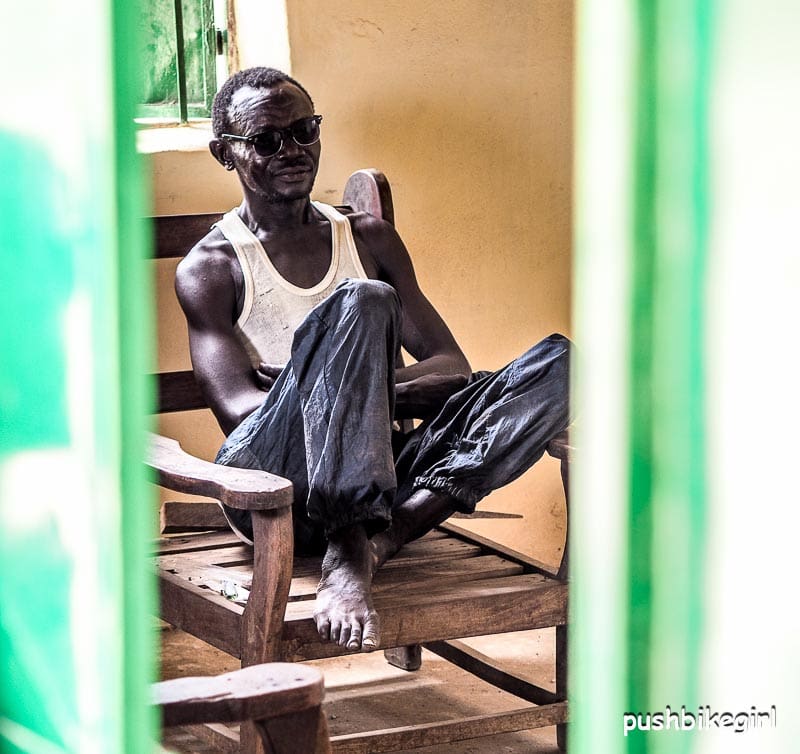
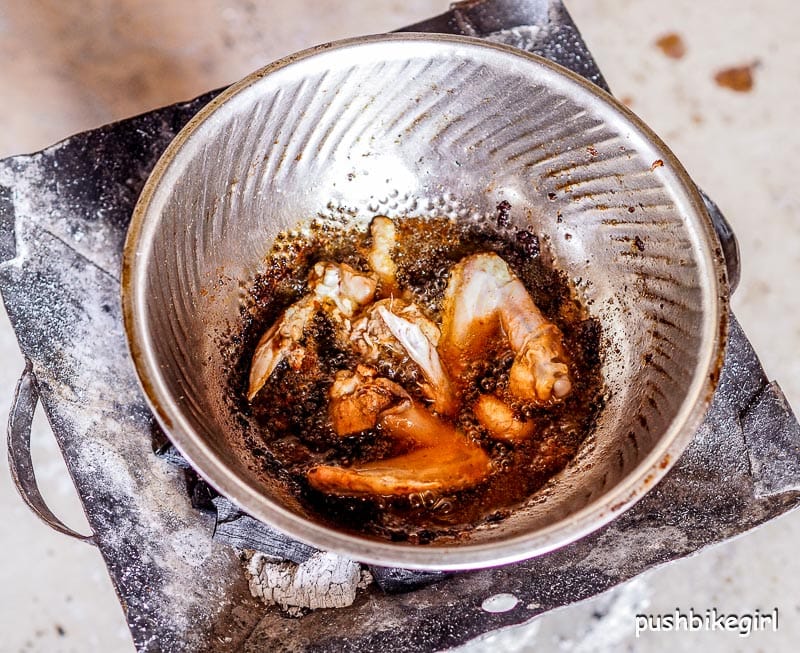
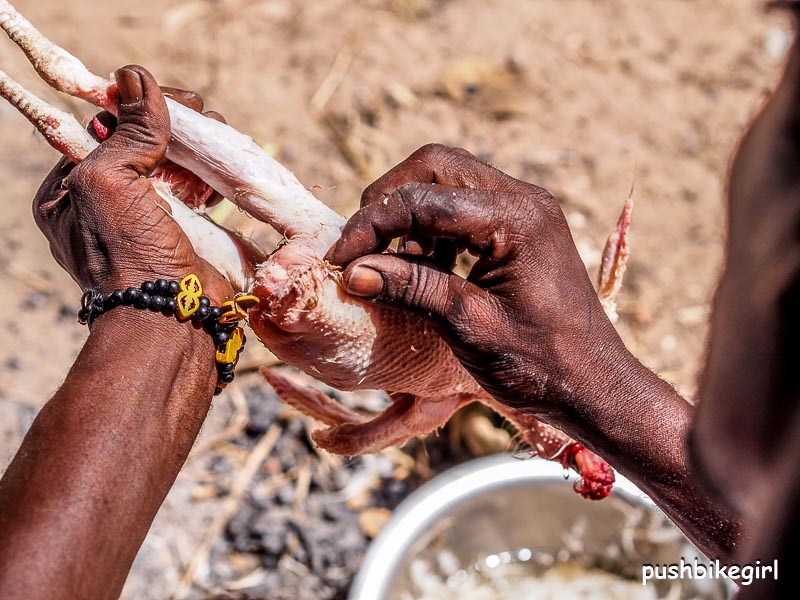
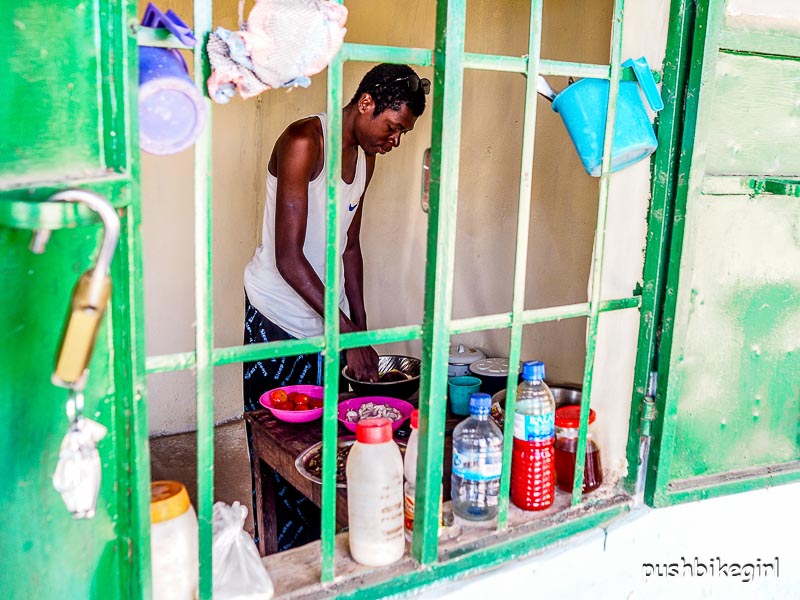
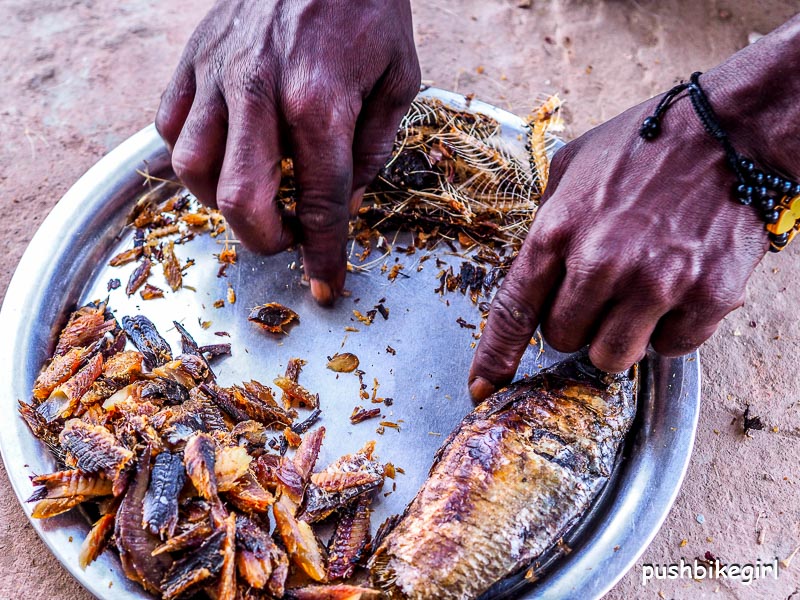
We visited a market in the neighboring village, fetched Baobab fruits from the tree and listened to music.
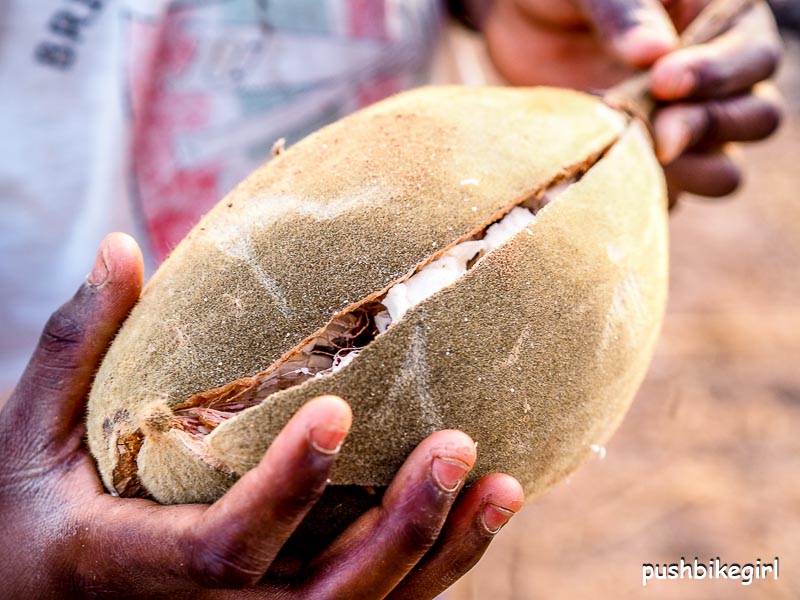
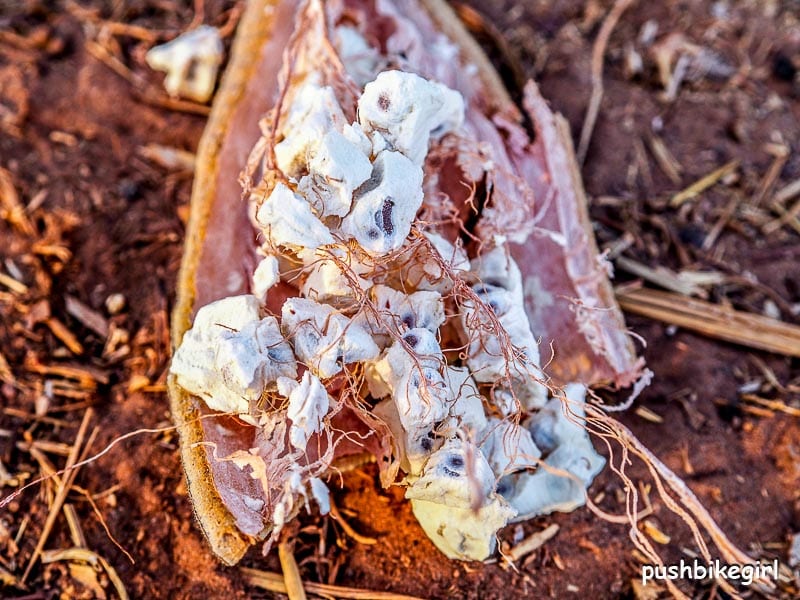
One of them showed me the area. We discovered hippos in the water, heard chimpanzees calling from afar, saw wild boars and baboons as well as other species of monkeys.
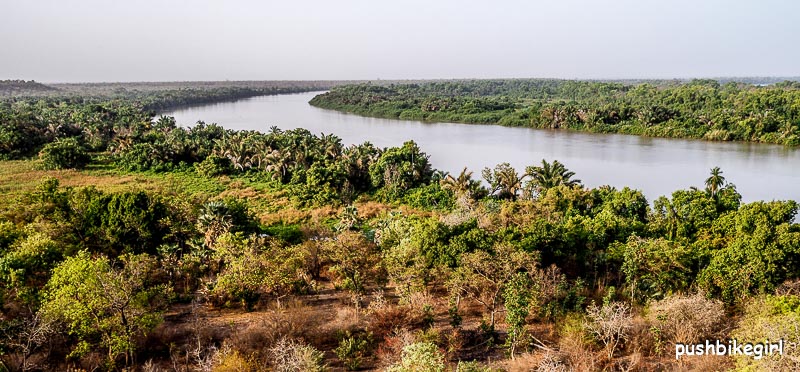
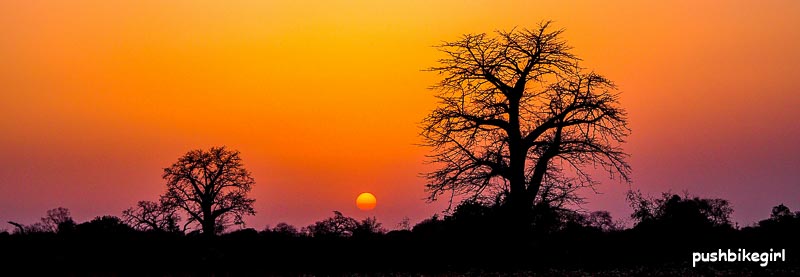
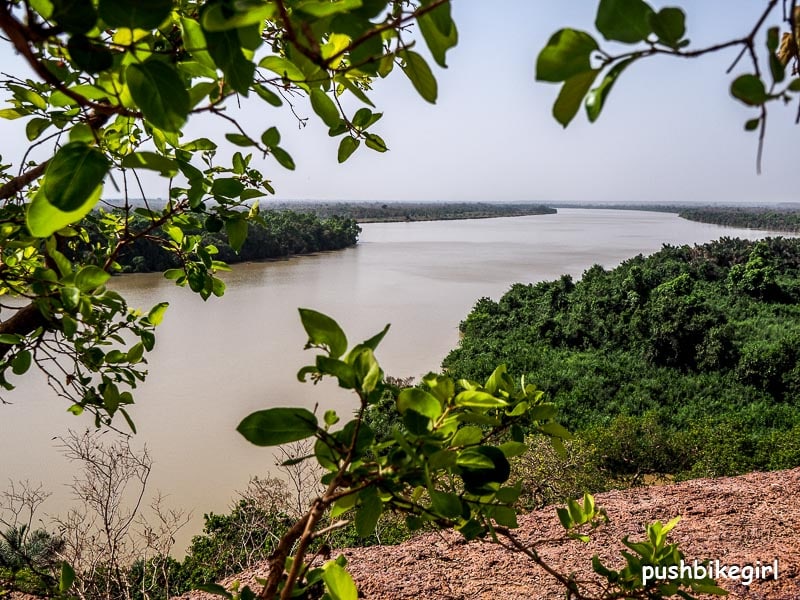
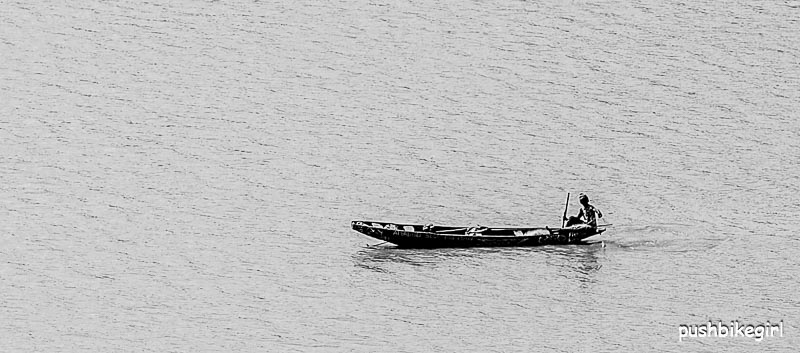
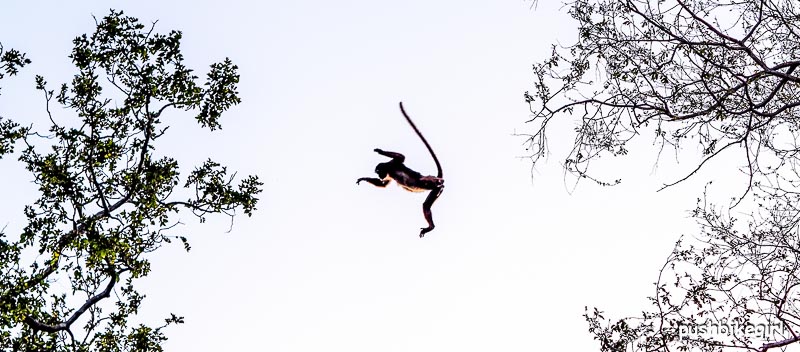
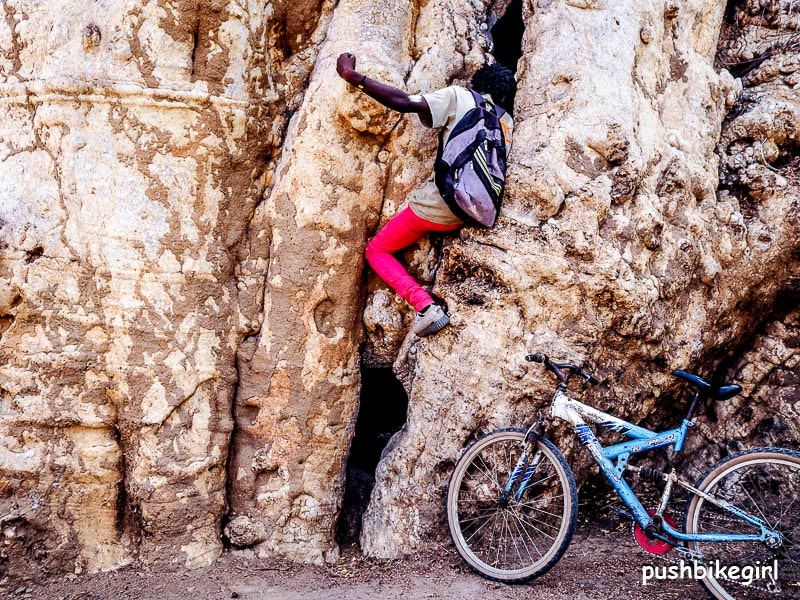
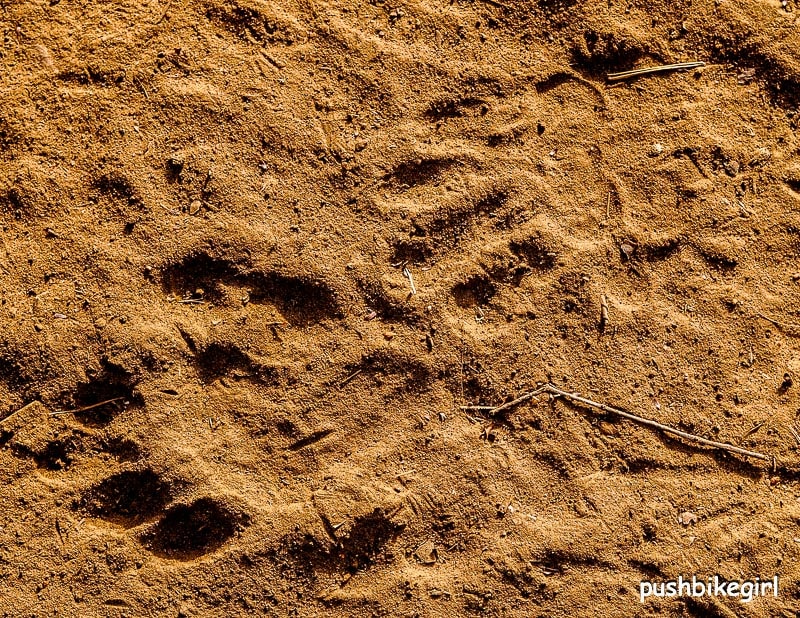
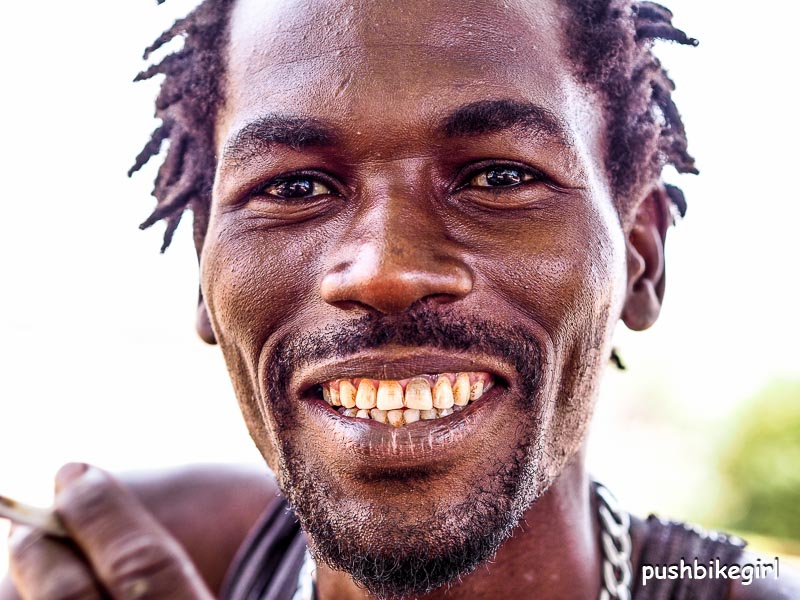
We also went fishing and explored the surroundings with our bikes. It was just great. In the evening we cooked or drank tea.
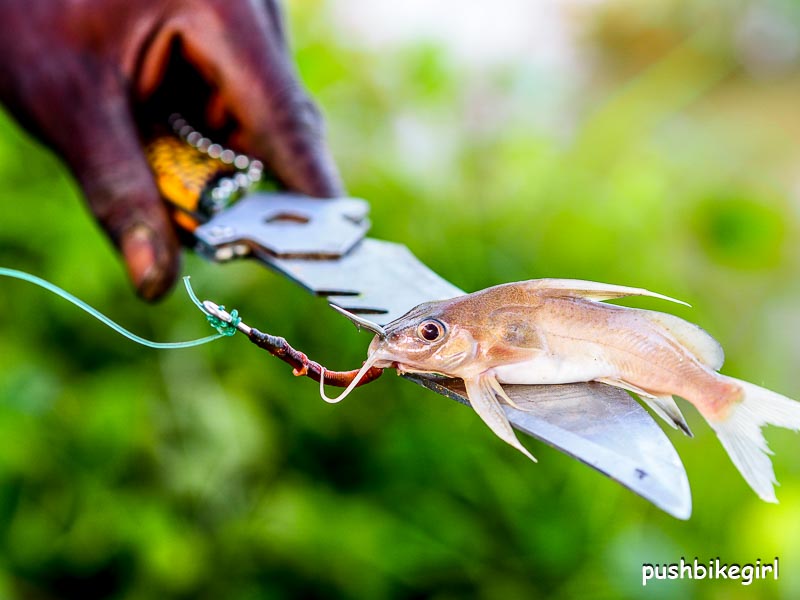
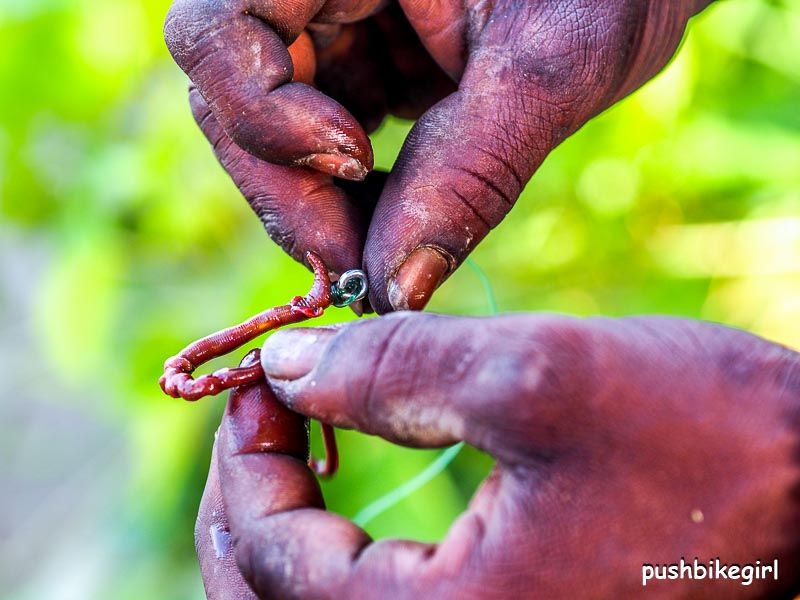
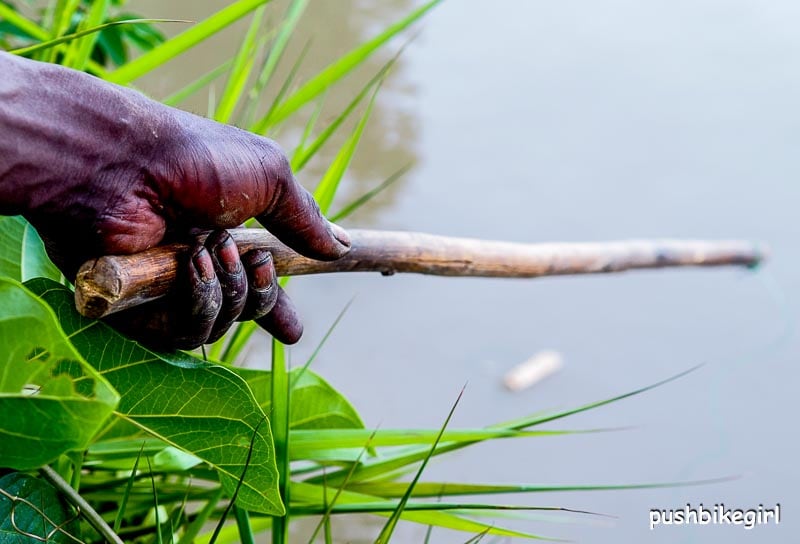
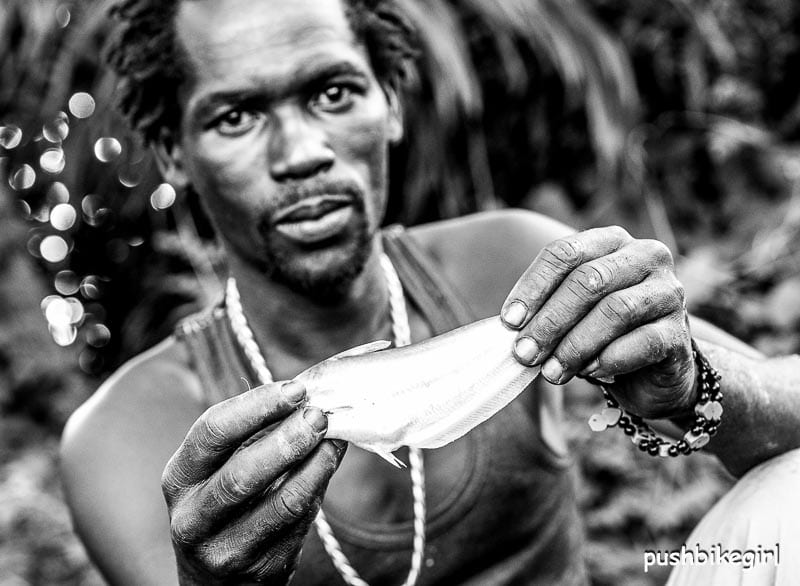
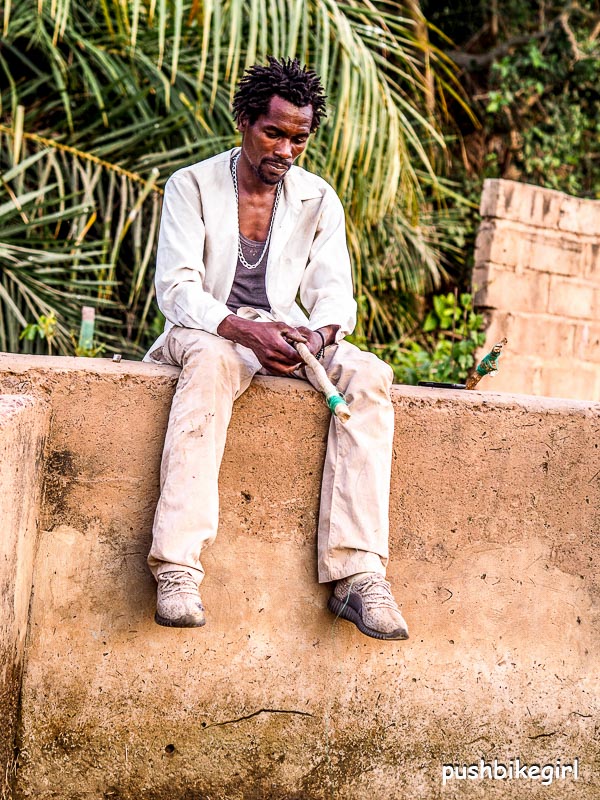
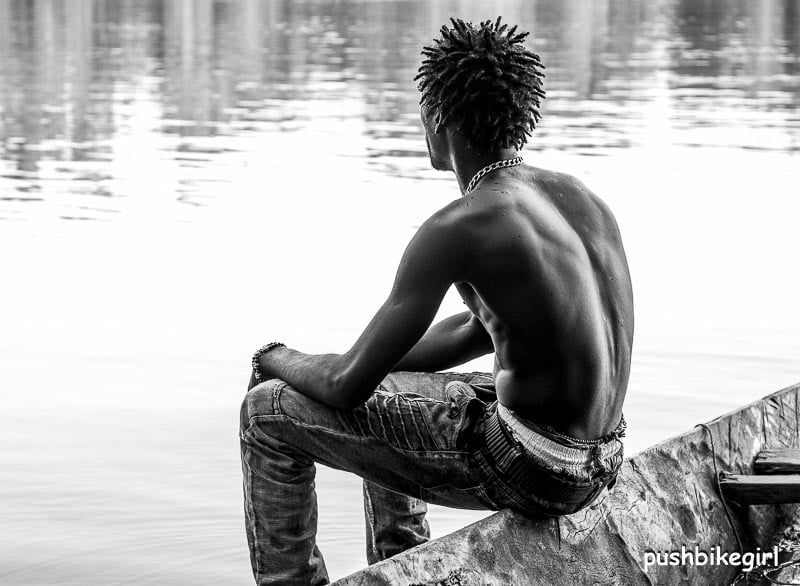
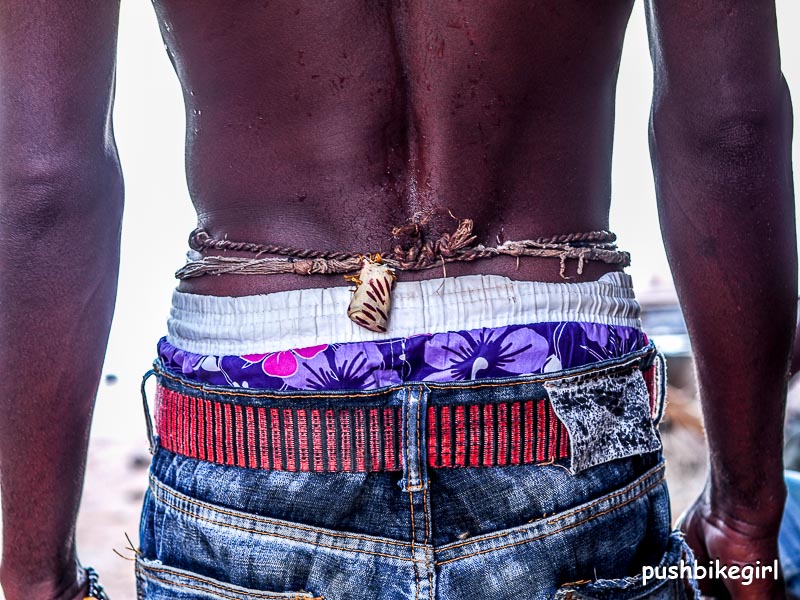
“Why don’t you have solar panels on your roofs,” I asked. “The Germans installed them, but after three months they didn’t work anymore. Poor quality from China. Now we just sit again in the dark at night.”
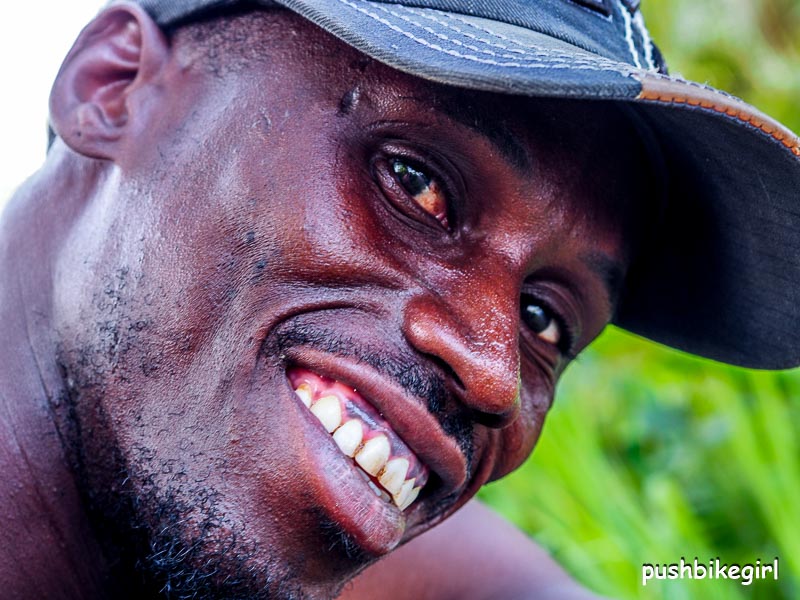
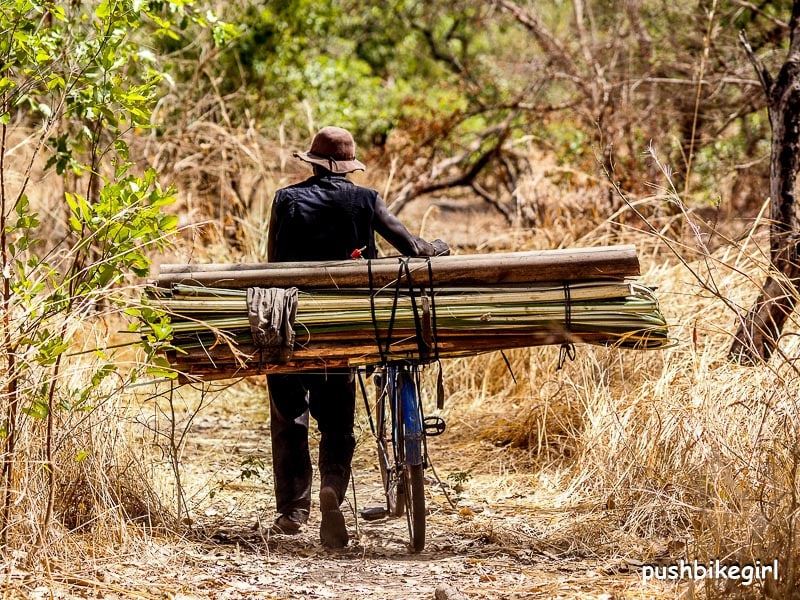
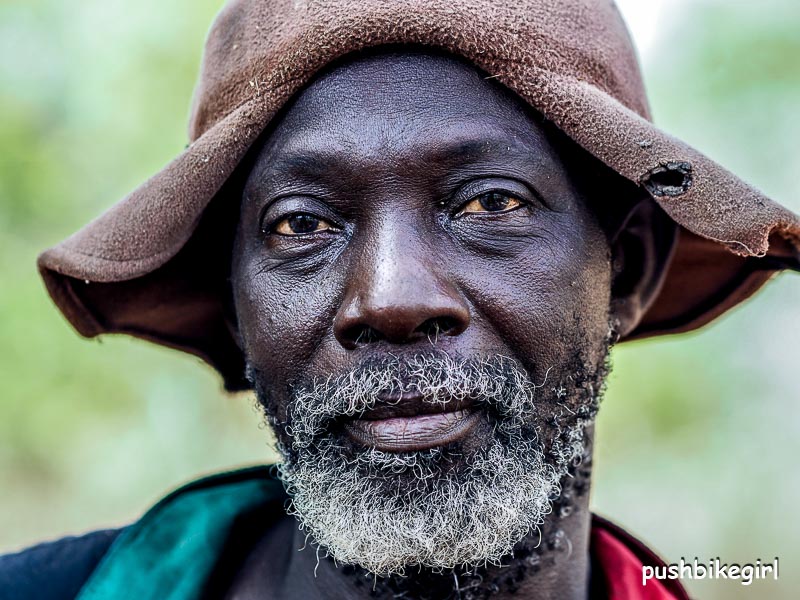
Ramadan began, during which people were not allowed to drink or eat anything between sunup and sundown. Torture when it is over 40 degrees, and the only way to cool down is to sit in the shade.
I wondered at how cheerful the people still were in spite of everything. They asked for the time often, as every additional hour became painful. At 7:25, they broke fasting, sat together, and ate and drank. I was often allowed to participate.
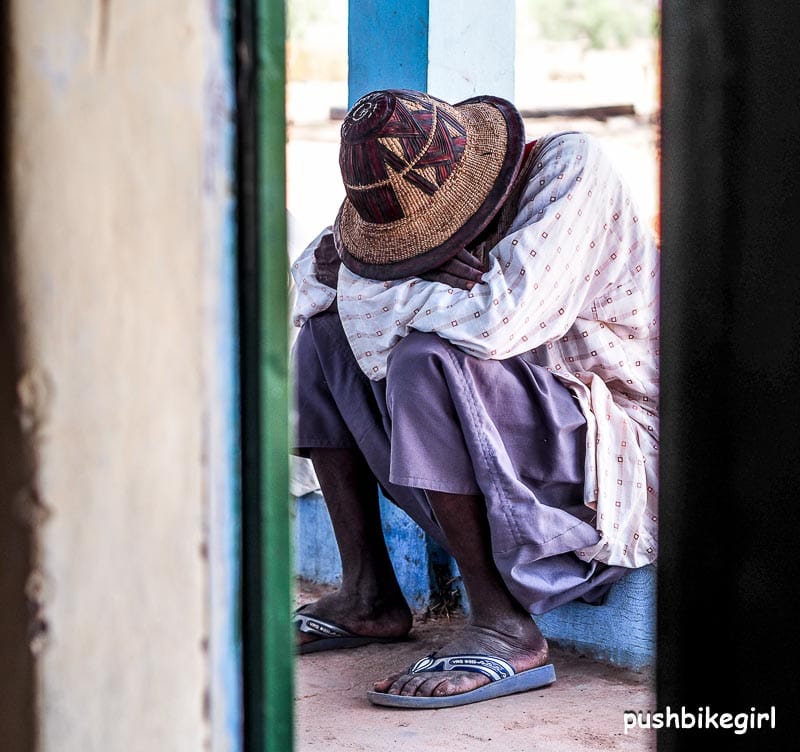
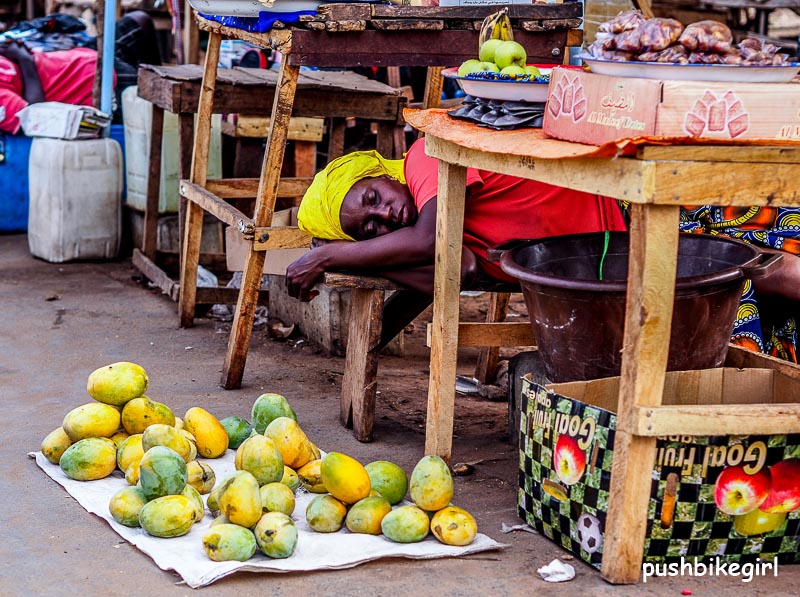
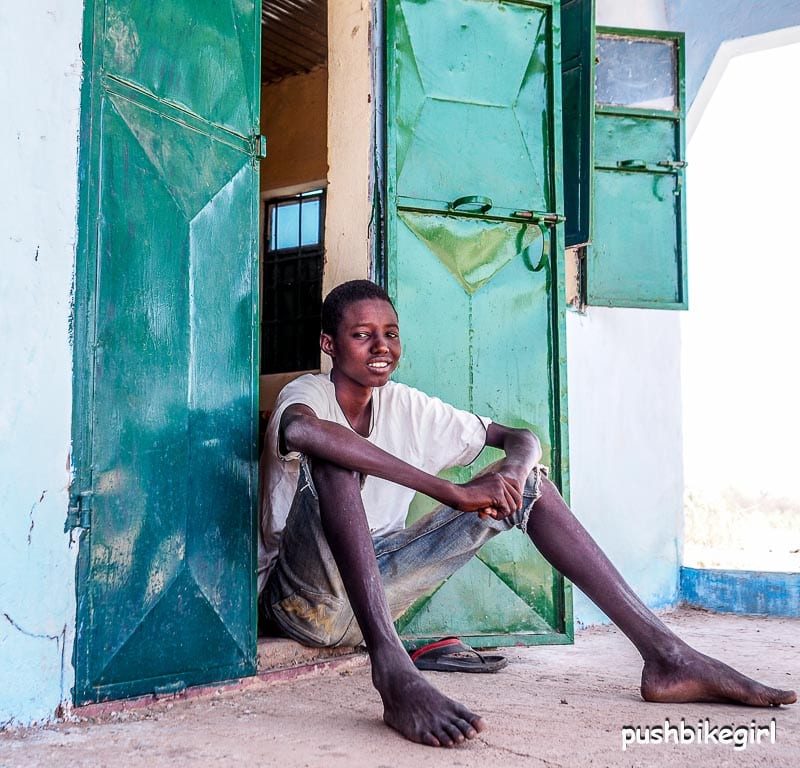
Again, and again, I was impressed by how religious the people are. Always praying at the prescribed times during the day, washing beforehand rolling out prayer mats and really keeping to it requires discipline.
Sometimes I think it would make more sense to use this discipline elsewhere, but of course, I say this because as an atheist I have never really understood the meaning of religions and even hold them responsible for many of the problems we have in the world.
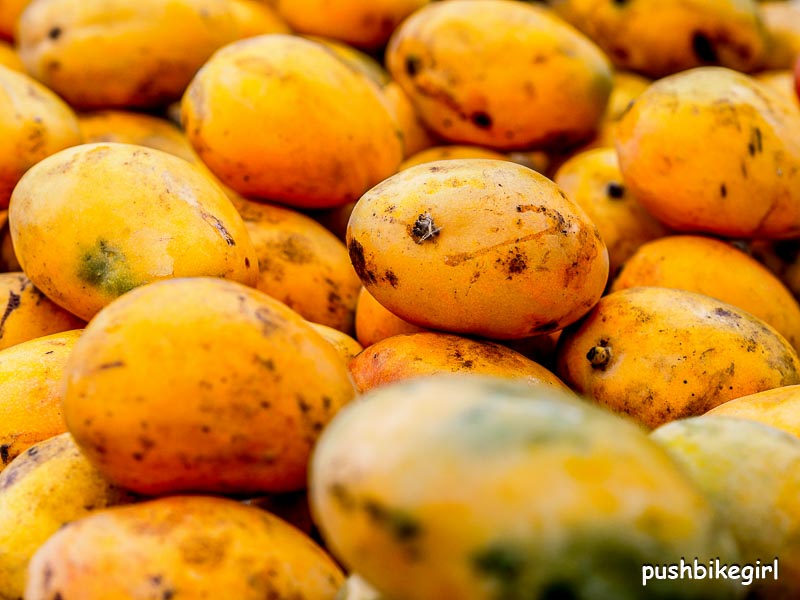
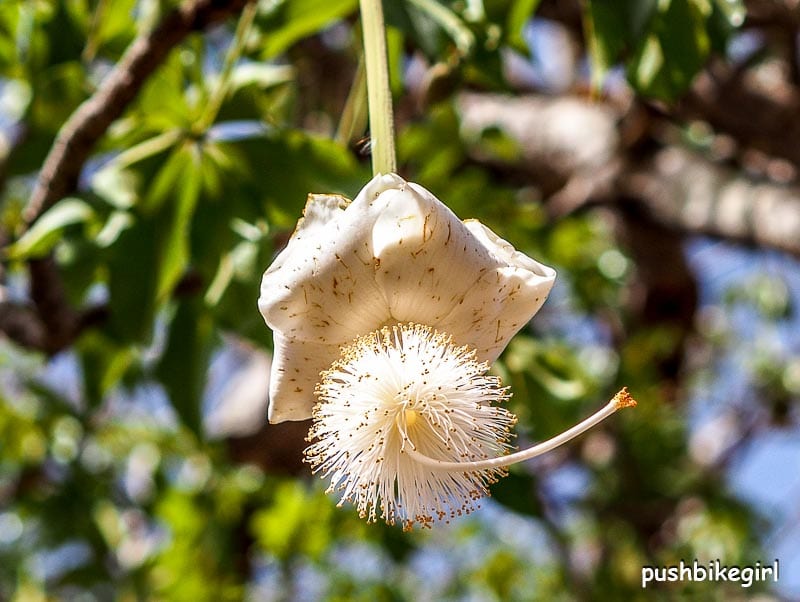
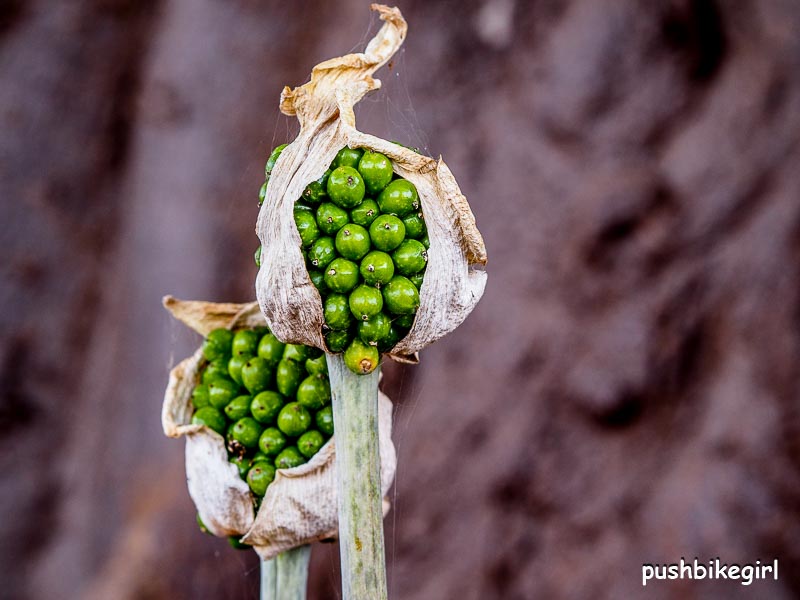
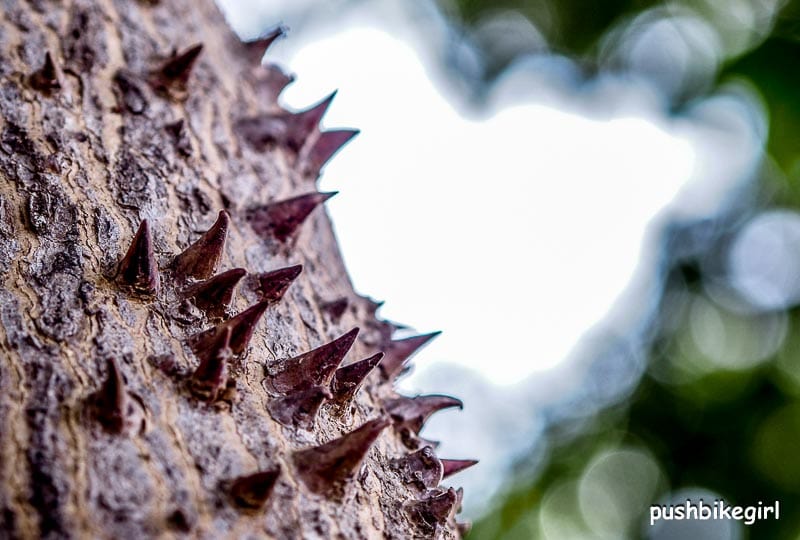
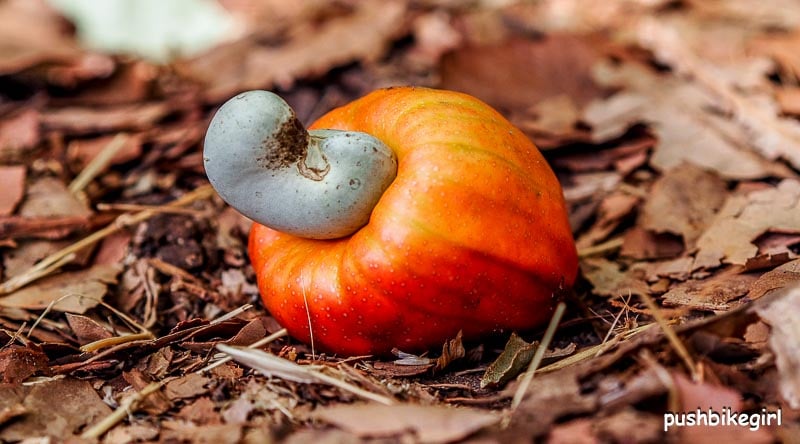
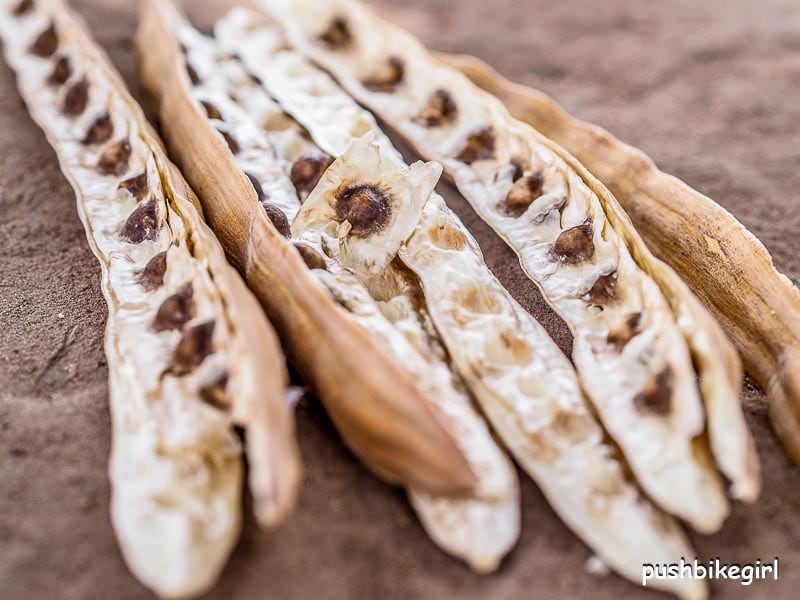
A man proudly showed me his children’s encyclopedia about animals, the only book I have seen since Morocco. He opened the first page and pointed to an elephant and asked me which animal it was. Then it was kangaroos, wolves, bears, and sharks. Every time he seemed surprised that I knew all of them.
When we came to the chapter on dinosaurs, he told me that these animals had been extinct for a long time. Probably 400 years.
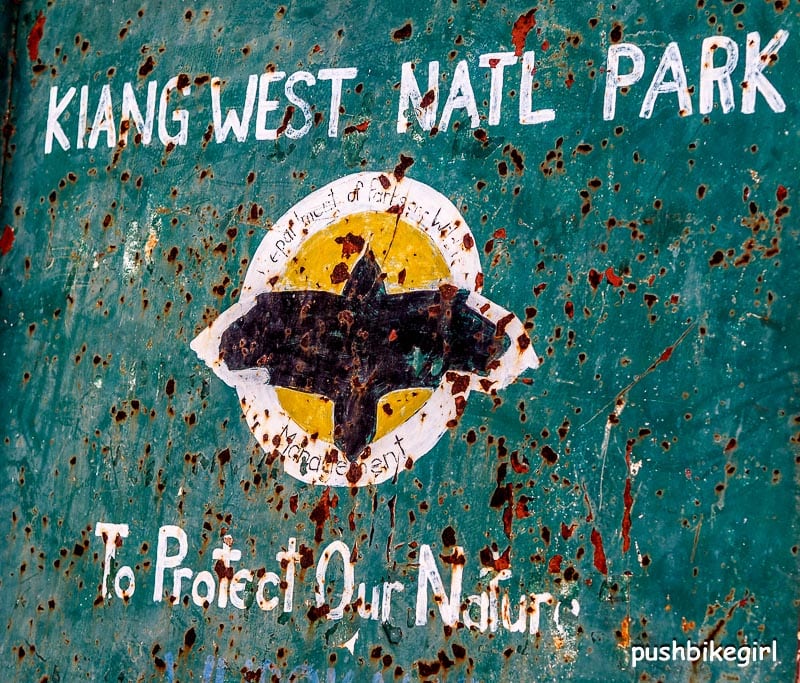
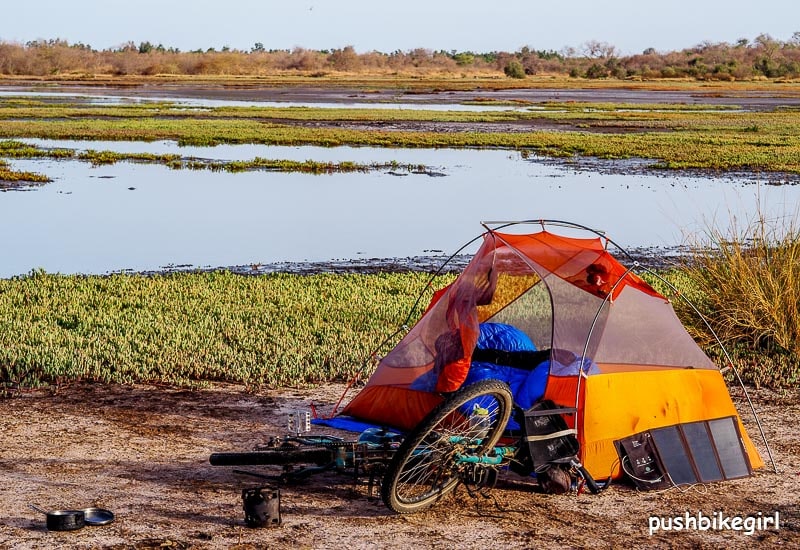
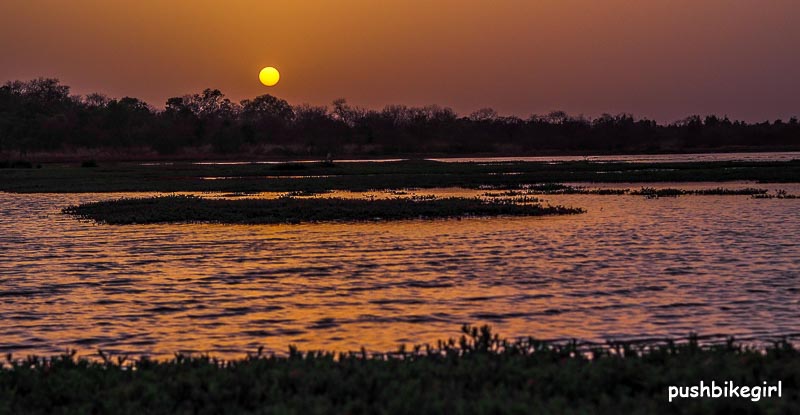
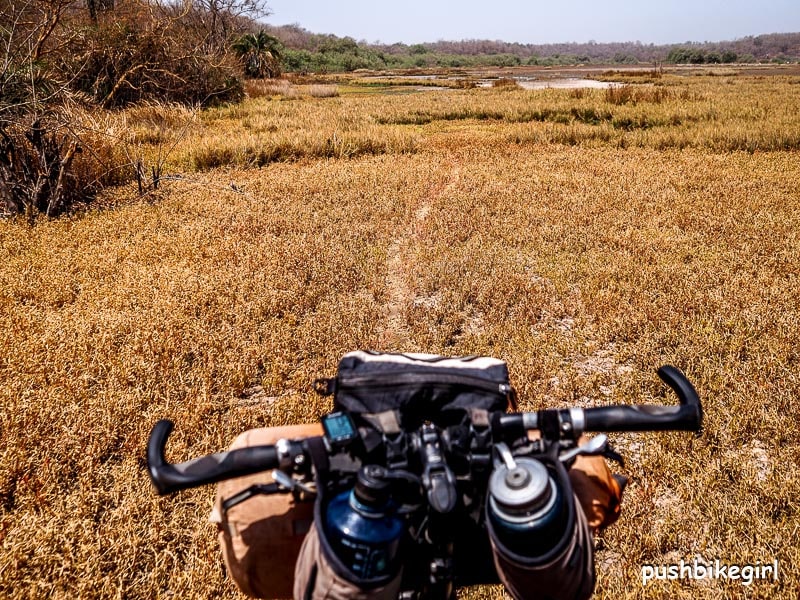
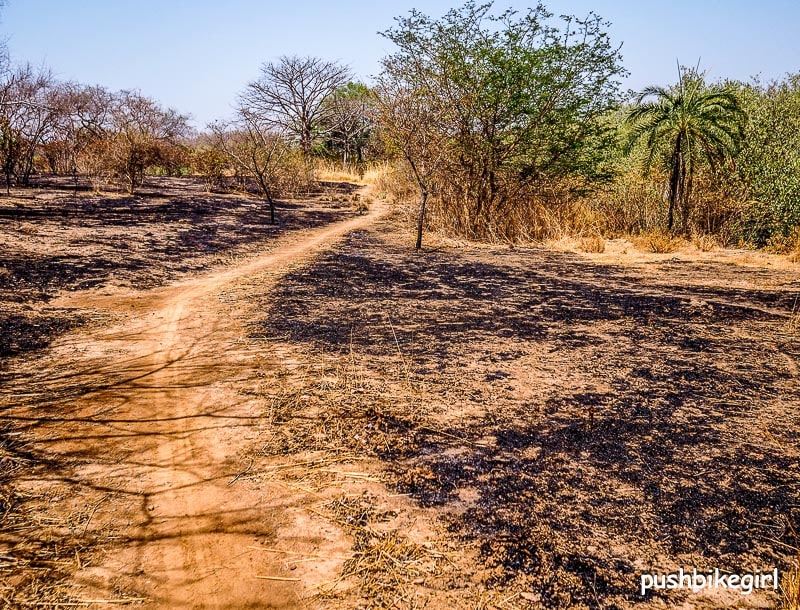
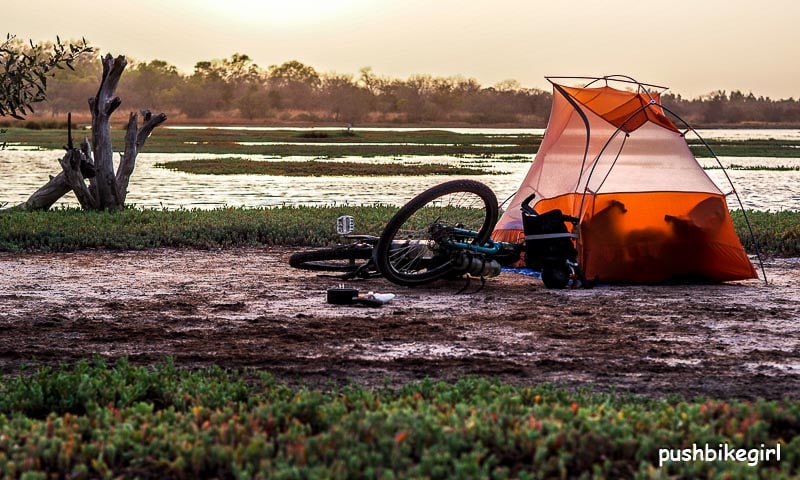
An older man approached me. “Toubab, Toubab please, I want to show you my garden. Twenty years ago, a Toubab from America told me to grow seedlings and earn money with them. I believed him and followed his instructions and was successful. Now I am old, and my boys want to continue earning money with it. But we need a well because we don’t have enough water.”
“Then build one, you have healthy strong boys’ was my answer. “We? No, we can’t, only Toubabs can, we don’t have such machines,” he said.
“And you now believe that I have a machine with me? But if you believe in Toubabs, then I would ask you to collect all the garbage in your village and burn it somewhere so that it doesn’t all of it end up in the sea”.
“Yes Toubab, that’s what I’ll do. I believe in Toubabs; you know a lot more than we do”.
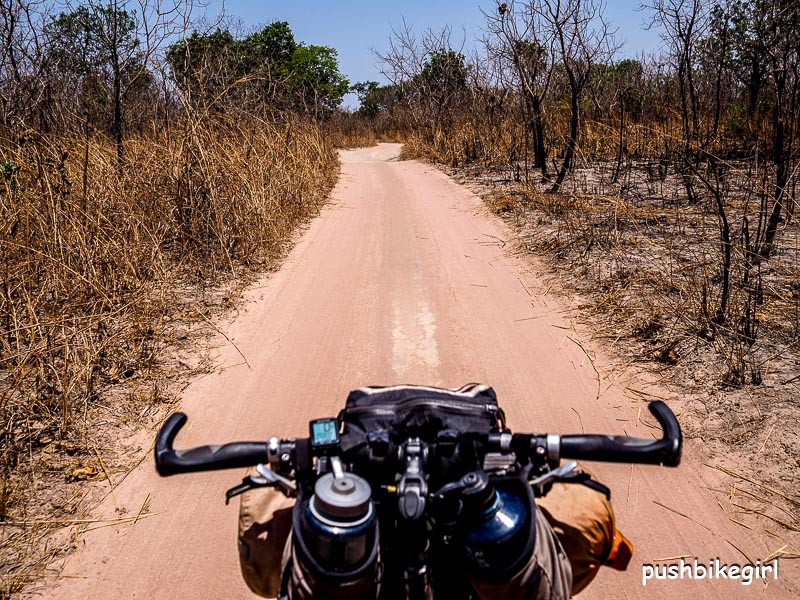
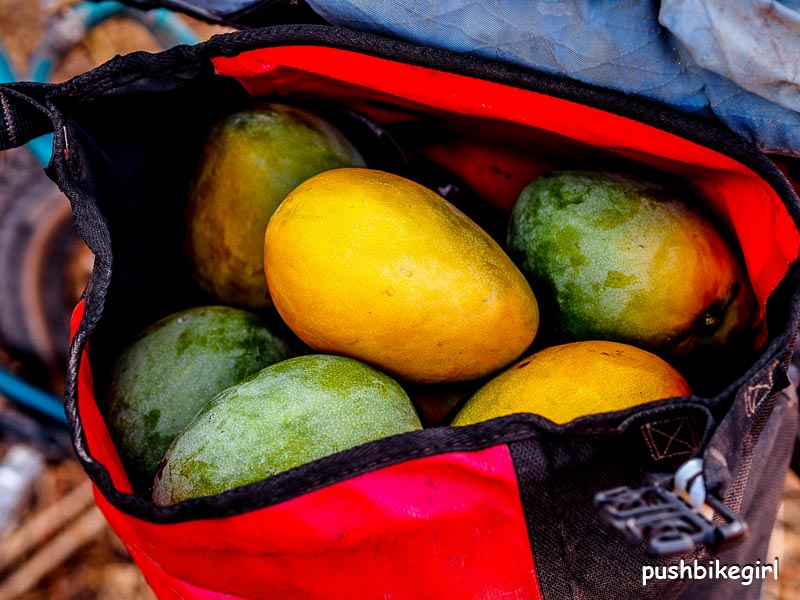
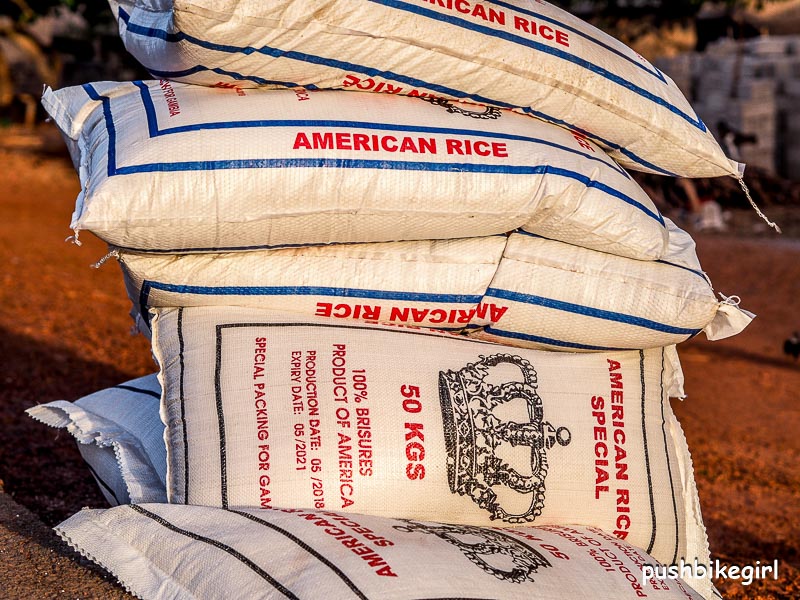
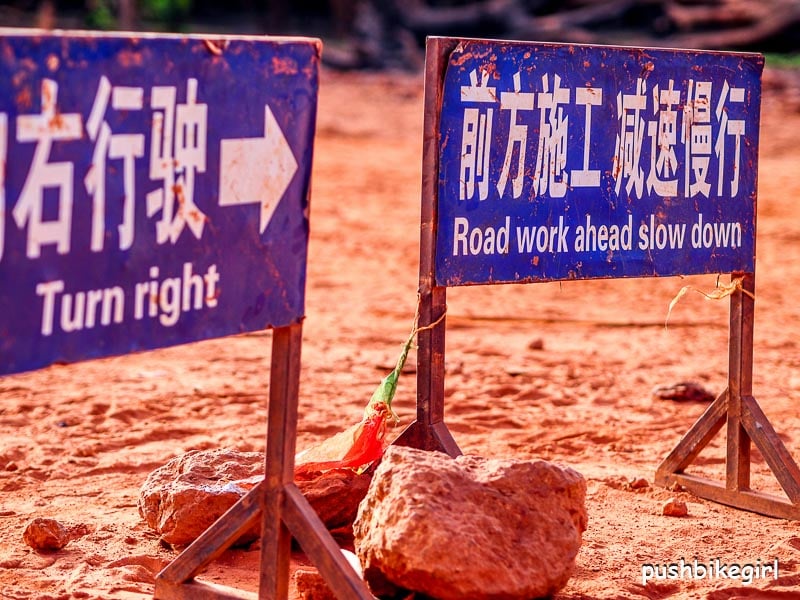
The further I rode west, the more prosperous it became. There were now many more shopping options, schools, and hospitals. The infrastructure was much better, a completely different world and many more people than in the East.
Craftsmen, service companies in every village. Market women, who didn’t just sit tired at the roadside, but eagerly brought their goods to the windows of passing cars.
Unfortunately, begging grew worse and worse. “Toubab – give me money – give me money.”
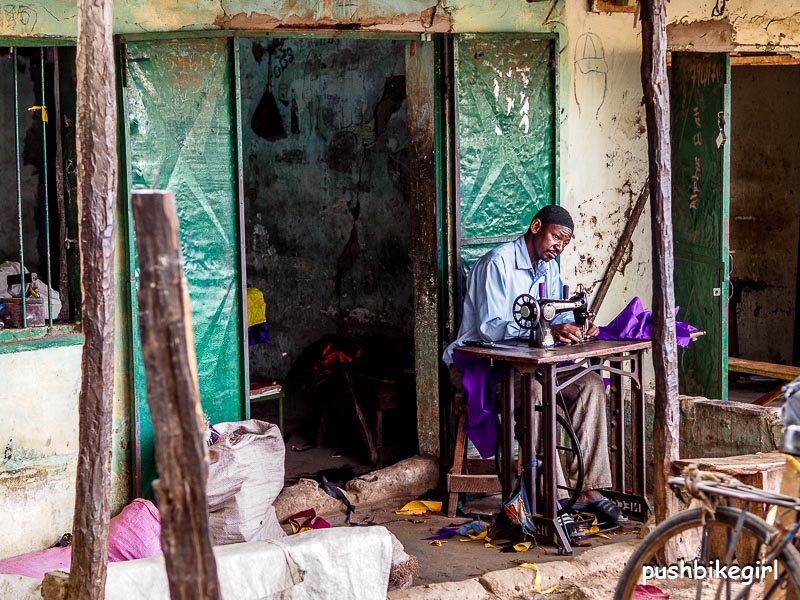
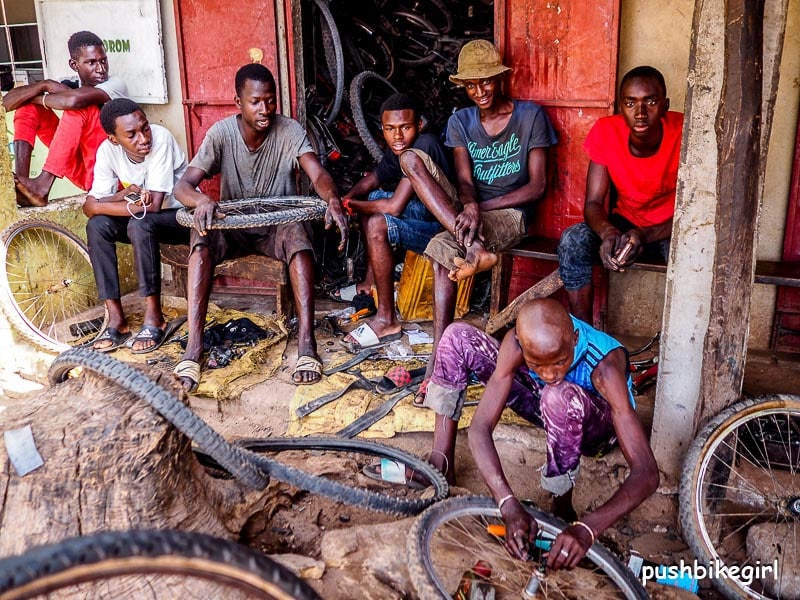
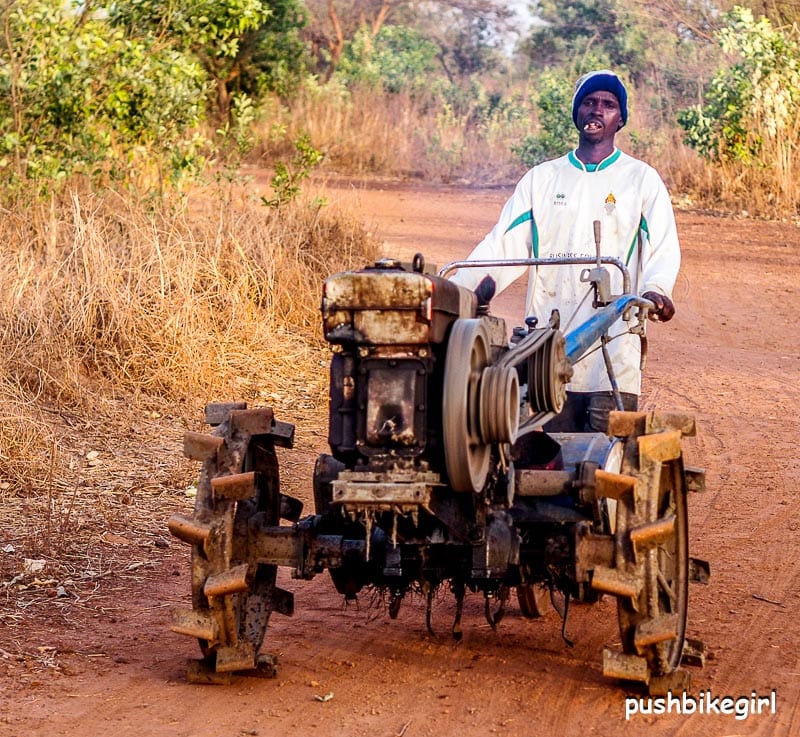
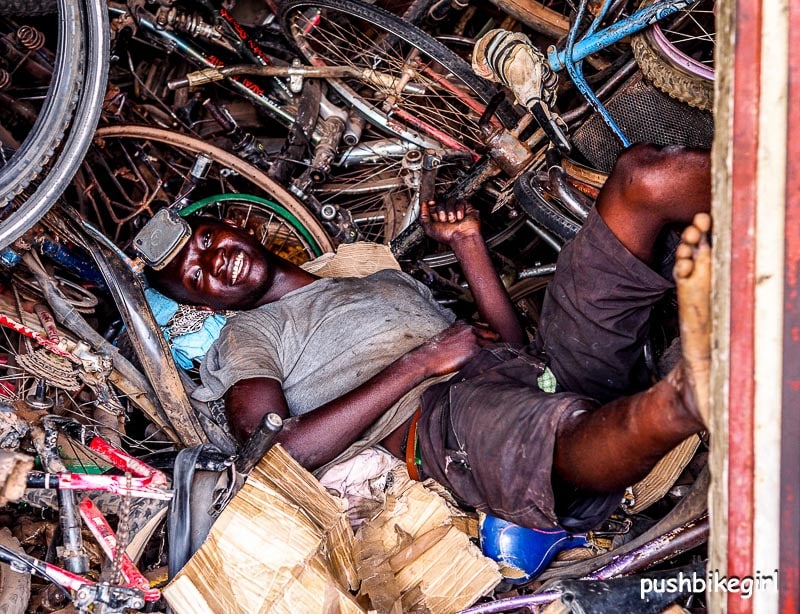
A man invited me for tea. We talked, and he told me that he is married to four women and has 32 children. He was not the first one I met who had several wives.
Alarmingly, they are convinced that there are many more women in the world than men. So “polygamy is right, and religion recommends it to us,” they told me a few times.
But I have to say that most men said to me that they have enough to do with one woman and they don’t need any more stress in their lives and therefore will never take a second wife.
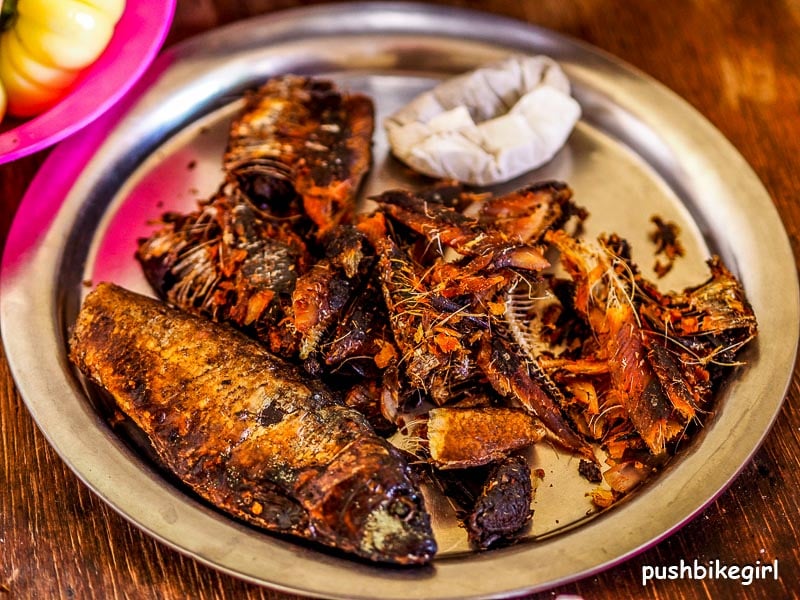
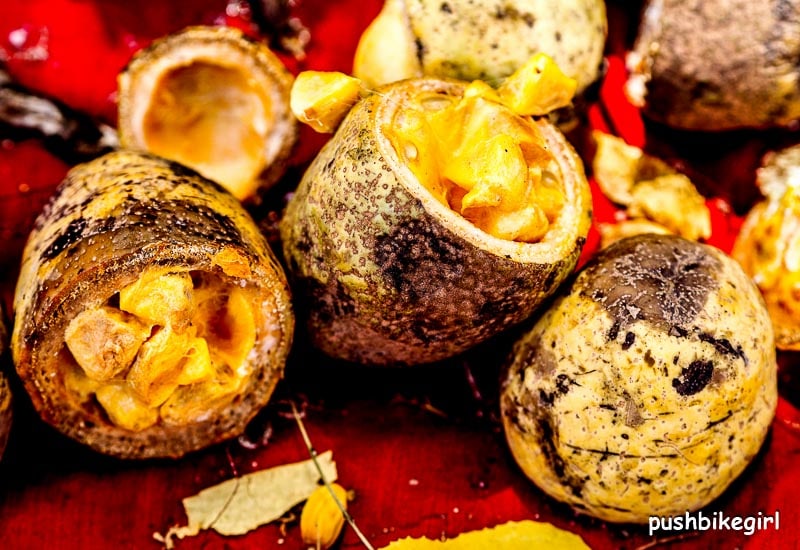
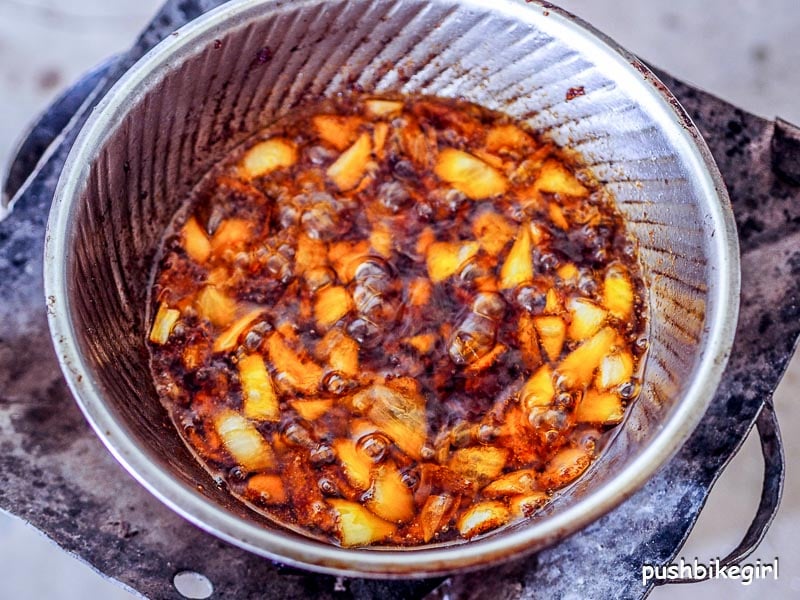
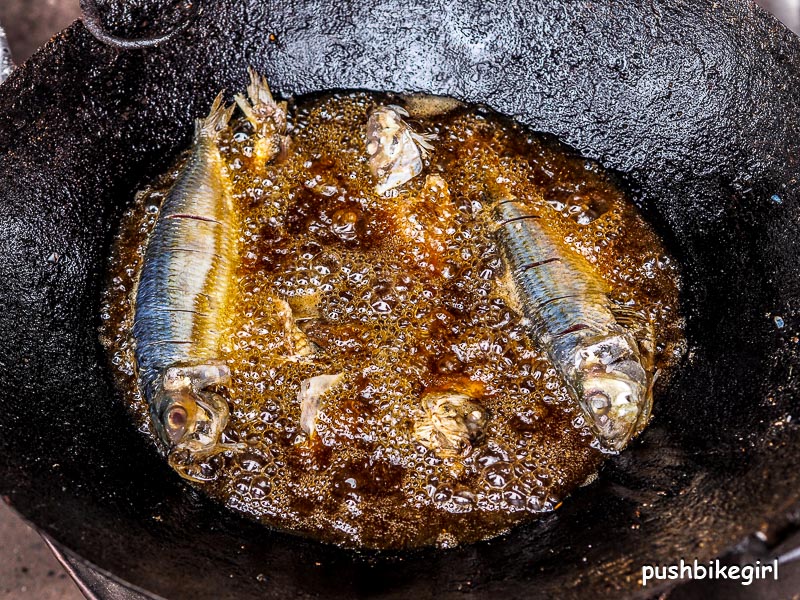
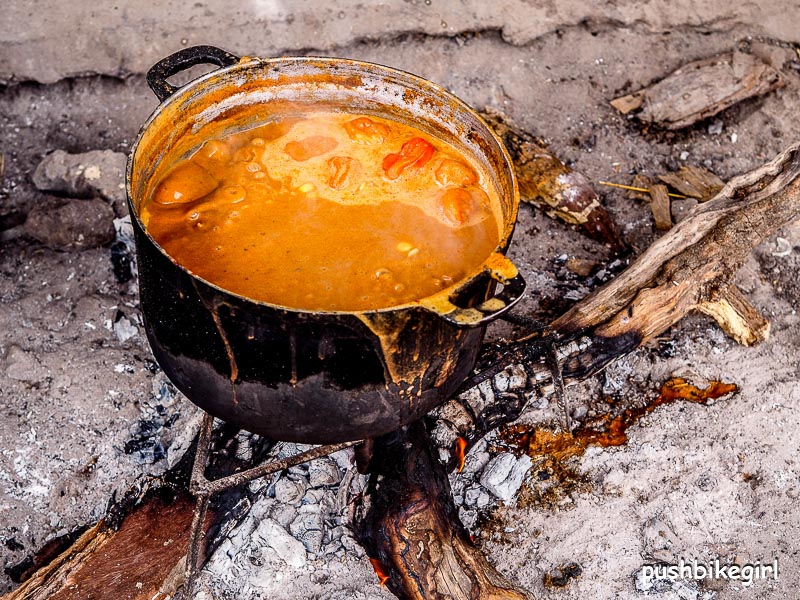
“You’re going to Senegal? Senegalese are unfriendly; they all want your money. They cheat you. They are richer than we are. But we have no problems, we are fine, we laugh a lot, and they don’t” I heard many times.
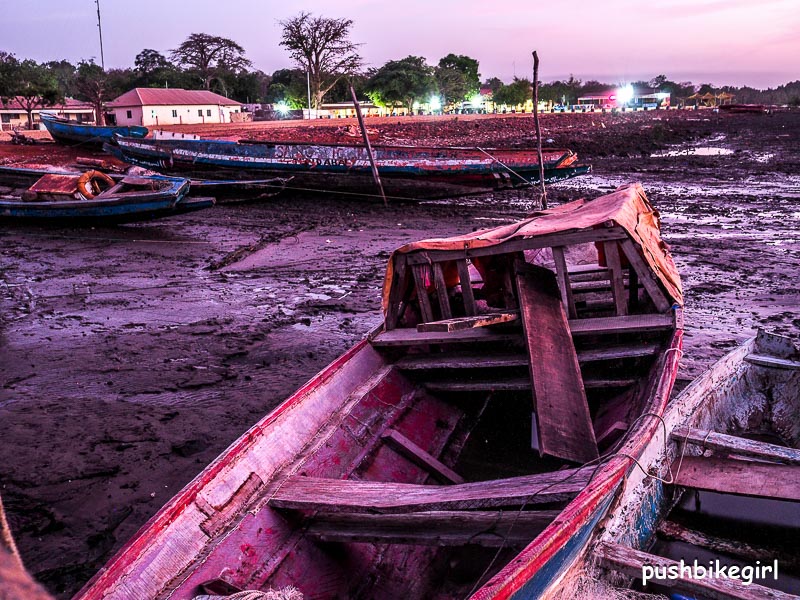
When I talked to other cyclists via WhatsApp, who were also on the road in West Africa, the thought arose that the children here, if they beg, could see me as a parent substitute.
In the Western world, children also ask and beg – they just beg to their parents and not strangers. Freely asking doesn’t cost, anything more than receiving a no for an answer which cannot hurt them.
I will hang onto this train of thought from now on; I like it, it frees me a little from my feelings of guilt.
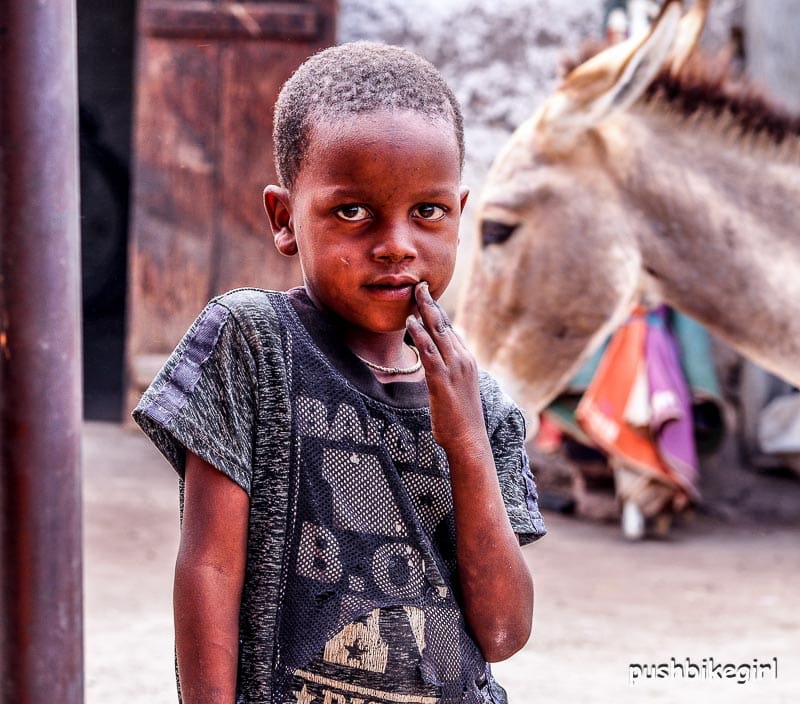
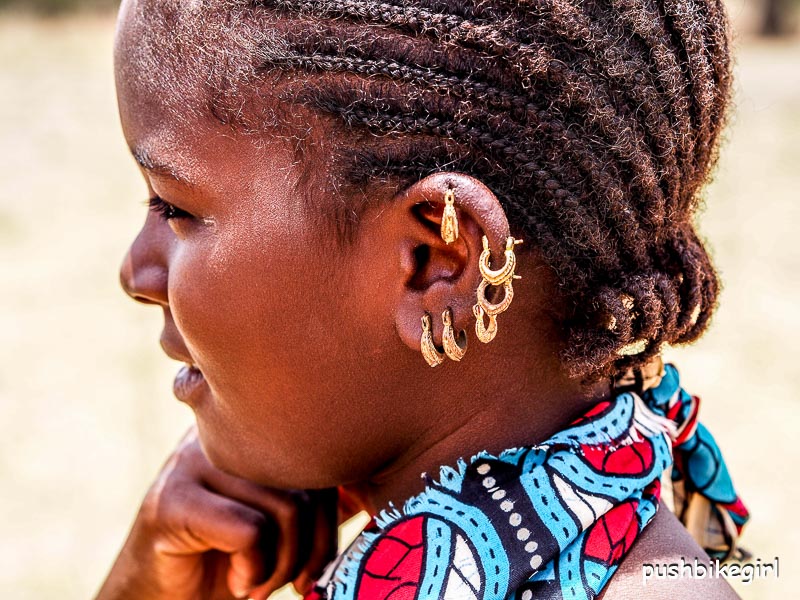
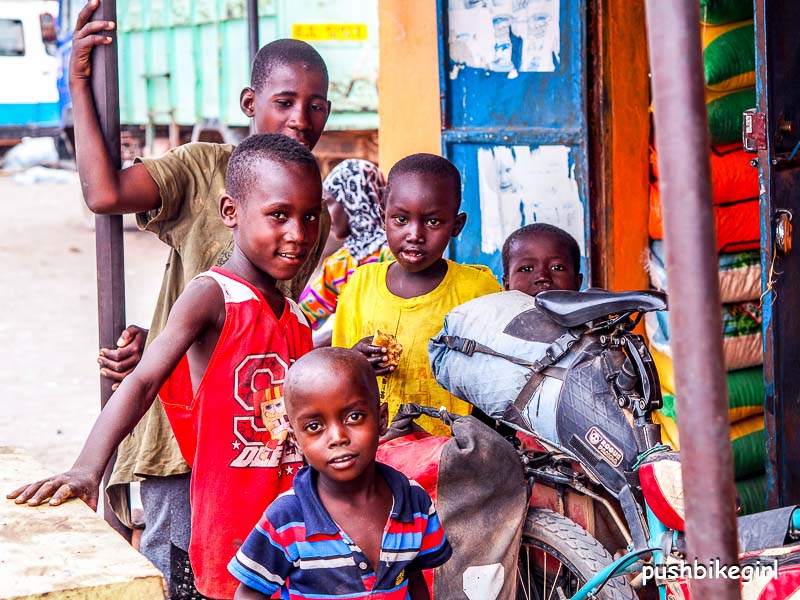
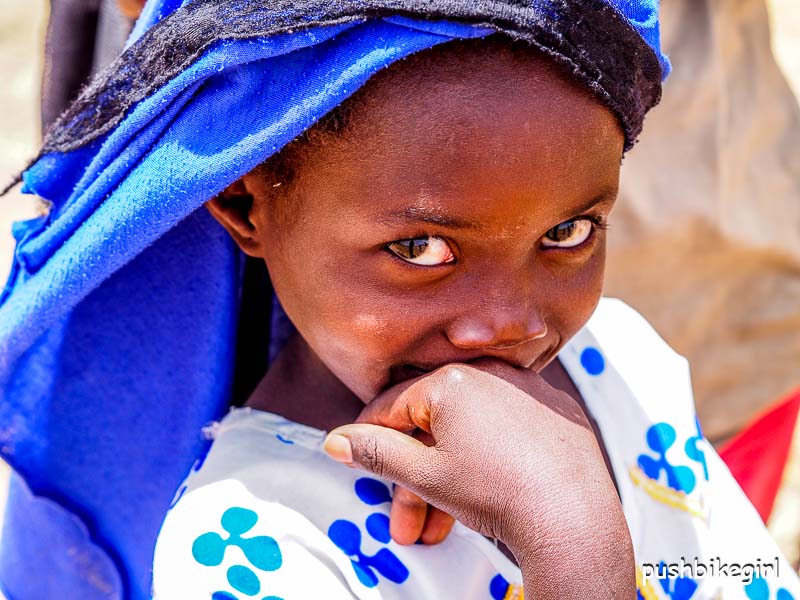
On the last evening of my four-week stay, I also talked to wealthier Gambians from Banjul, the capital, who were able to understand my questions to them well.
“I have to feed my whole family; it doesn’t suit me. But my family expects it from me. That puts me under a lot of pressure,” said one of them.
While the other said: “My father has always told us five brothers that we have to take care of ourselves. That we shouldn’t rely on one of our brothers giving us money, we all work the same amount.”
“I can’t stand to see so many people in the country just pitying themselves and waiting for someone to give them something to eat instead of improving their life by finding solutions for their situations.”
“We need education. People have to understand that they have to take care of themselves. That is our culture, we share, and many take advantage of this custom. We have too many children. Money from aid organizations, ends up in the wrong pockets. There is too much corruption”.
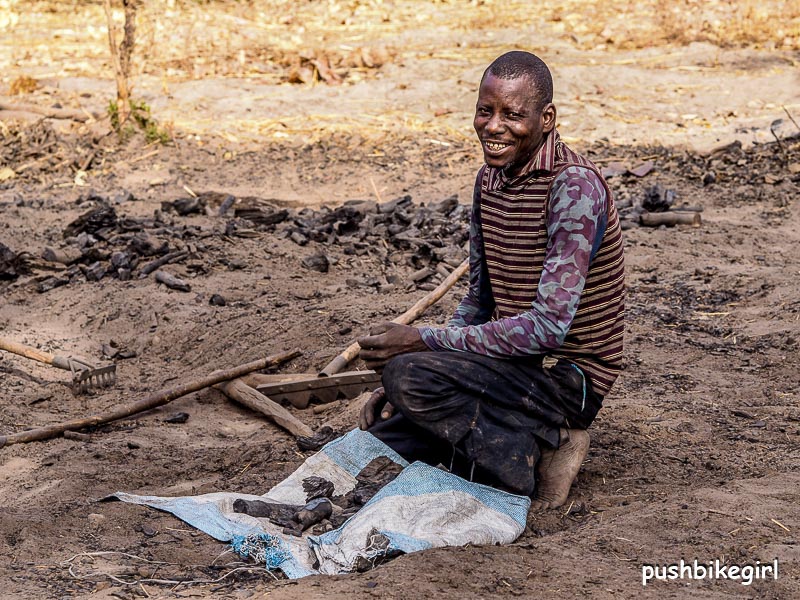
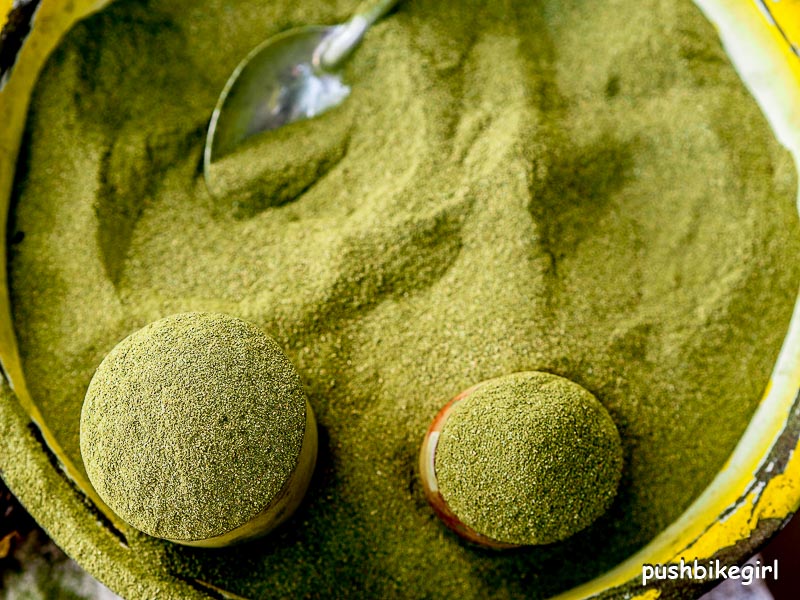
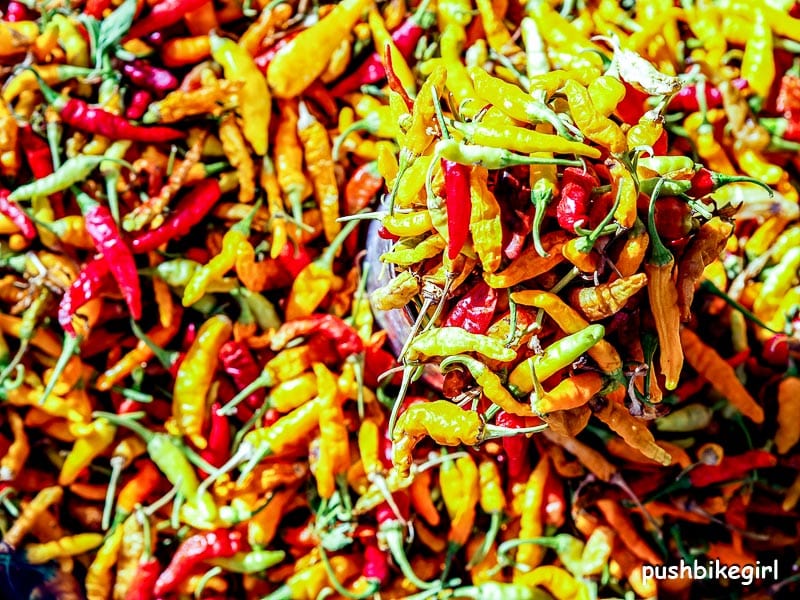
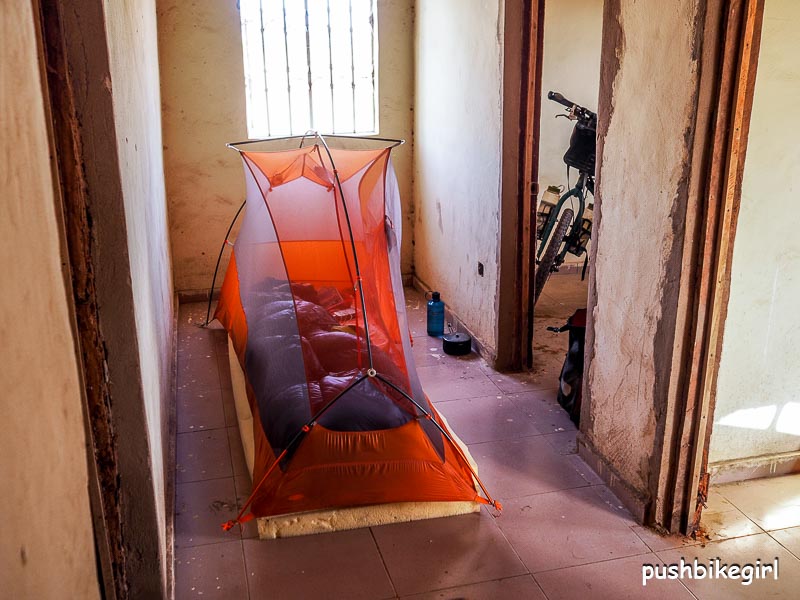
I bought an ice-cold Coke at a shop; due to the lack of electricity it was very rare to get something cold.
A boy watched me and never let me out of his sight. When I had the glass bottle empty, I placed it in front of me, and the boy came to me, took the bottle and sucked at the opening trying to get every last drop.
Yes, Africa is another world and an eternal roller coaster of emotions.
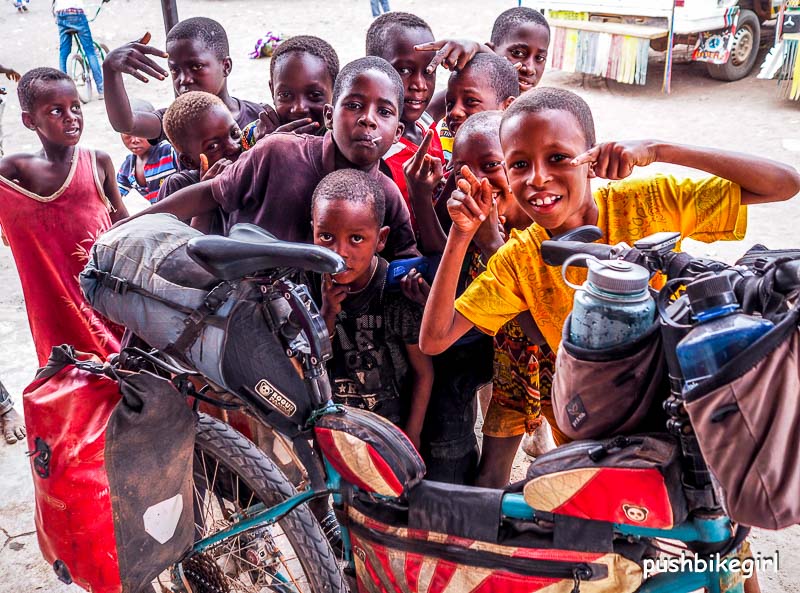
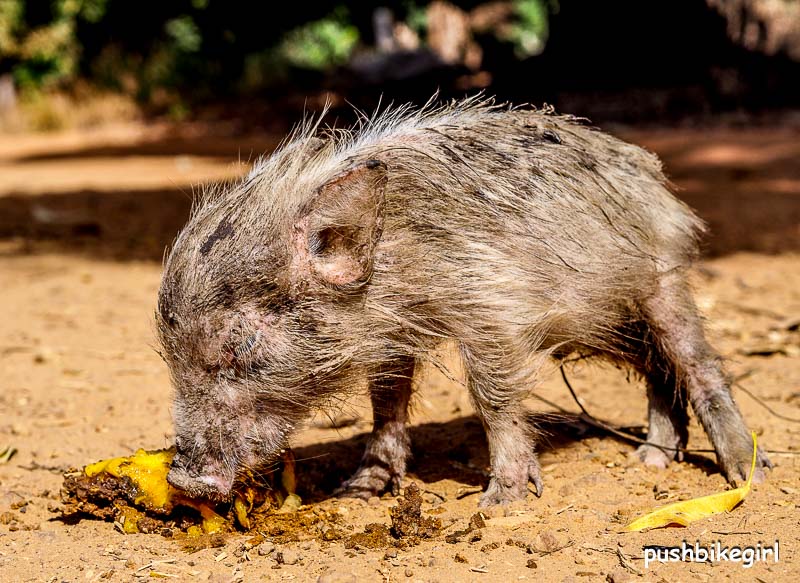
Shortly before crossing the border the first pigs appeared, then churches and a little later the first white nuns.
When I reached the border, I noticed that I no longer had my beloved mp3 speaker. Had it been stolen from me? Or did it fall out of my pocket? It accompanied me halfway around the world and offered me great entertainment in many lonely hours. I hope I get a new one somewhere.
The border guards checked my bags for drugs. It did not surprise me; marijuana consumption is high in the country.
My thoughts at this border were, finally Senegal again, French, I can ignore the same endless questions, begging and lengthy suffocating discussions, “with sorry, I don’t speak French”.
I urgently needed a break.
Did you enjoy this post? Feel free to share it with your friends – thank you!
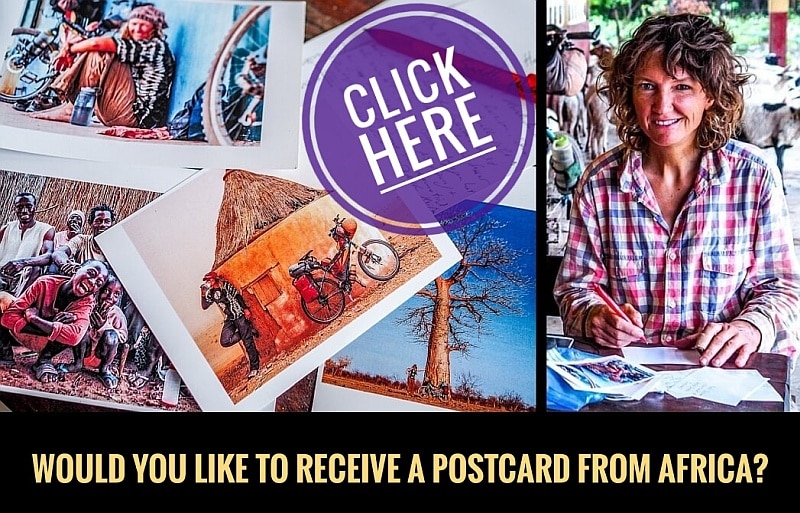
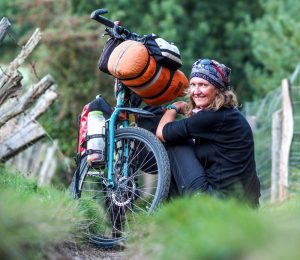


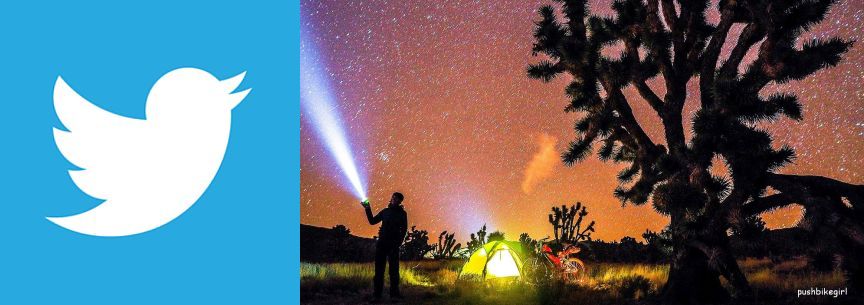

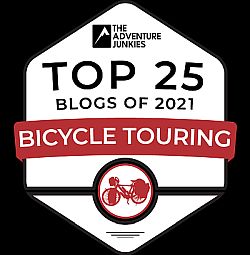
Way to go PBG! The photos are outstanding and your text captured perfectly the kaleidoscopic nature of emotions when faced with such complexity.
Happy Trails??
Thank you Kevin!
As ever your photos are evocative and your thoughts insightful. Thank you for sharing your journey with us…
Outstanding!!! Hallo Heike, your blog post just keep getting better, and better. I have enjoyed them all overs the years you have been traveling and sharing, but I have to say, I have really been enjoying Africa. As it happens I just read an excellent article in Quartz, detailing the journey of one economic refugee, and here you are bringing them to life. Migration, trash, global warming, all heartbreaking realities of our times. I wish you strength, as you in your journey are on the front lines, seeing these realities first hand. Thankfully the roller coaster goes up as well as down, and even though you are seeing, and experiencing some real downs, it’s impossible to miss the ups you are sharing with us. Beautiful scenery, stunning portraits beautiful people. I hope you can tell I enjoy you work and art. Thanks and wishing you safe and exciting travels.
Sending a monster hug your way! Great to have such a loyal follower and friend among my readers!
Wish we could sit down somewhere and chat for a few hours….
Best greetings Heike
Amazing story!
Thank you very much Gary!
Hello Heike!
Is the road from Guinea-Bissau to Boké difficult for biking?
Congratulations for your fantastic Blog!
Thank you!
Difficult is an very individual term.
What might be difficult for one is very hard for someone else.
I found it much easier than expected. Others told me it is difficult.
Best greetings Heike
Heike,
Hello! I love reading your beautifully penned journals and seeing the incredible and colourful images you take.
It is like travelling along side with you when receiving your blogs.
Stay well and stay safe.
God Bless,
Anita
Great to hear Anita…thanks for your lovely feedback! Always nice to receive!
Best greetings Heike
Fantastic Photos as always Heike! I wonder how many hundreds you take to get those gems you share.
Your write-us are fascinating. Many of us struggle with those same questions of inequality in economic well-being.
For three years I was a volunteer in southern Africa where the common greeting was “Ke kopa madi.” (I am asking for money). To which I responded “Ha ke na madi, O shwanetza madi, O shwanetza tsmaya kwa banke” (I have no money, If you want money, you must go there, the bank.) That became an acceptable exchange and was like an extended greeting.
And yes the children seemed happier in their environs than those back home surrounded by electronic gadgets and television programs. I realized to them my being able to ride in a car and go to a restaurant was like my seeing someone in a limosine going to a high end restaurant. I was the 1%.
Love your insides and emotional supportive words….thank you very much Terry!!!
I take a few hundred shots for each post…true…but I usually shoot several on each scene…so after all I almost post every scene I take pictures of. I only select the best of the individual situation.
Best greetings Heike
The Buffalo Soldier story was particularly touching
Very special evening….thank you David…
Great story and fantastic photos!! Happy riding!
Thank you very much dear Matthijs….
Thank you again for not only your words and images but for your raw emotion captured here and in each post.
We have a mutual friend..a lady you met on the Great Divide route in the USA.
Thank you very much Nick!! Appreciate your words!
Audrey? She is great!
Best greetings…Heike
I just wanted to say I absolutely loved this post so much. I totally resonated with the difficulty of always having so much attention, being seen as a saviour, and being asked for things, all the time. And feeling guilty when people tell you your country is nice, I want to study there, I want my son to study there… which broke my heart a little when a Sierra Leonean asked me that, because I know there is absolutely no chance that is happening when they make $2 a day to even get out of the country. It is hard and I just wanted to say I feel you and love the way you wrote it down. Also I’m loving the way you travel. Also you must have an iron stomach to be able to eat all the local foods that way and be ok to cycle!
Can’t wait to read more!
Sending big hugs your way! What a lovely supportive comment!
Best greetings Heike
Wow what a great read. Your analogies of a man wearing a condom and a black person in Europe have certainly got me thinking. Apologies if its sexist but I have a bit more admiration for lone female travellers that I do for their Male equivalents as to me they are more vulnerable. But that said when the need arises they can also be every bit as tough. Isnt it so interesting that those with so little can still be so welcoming. It does make me wonder whether their lives would be ruined if they had access to the so called riches those of us possess in the western world. Mind you that said I still would like to see their lives improved by at least having basic amenities like water, heating & lighting and it annoys me to think that money is sitting in wealthy people’s bank accounts that will never be needed or used which could help these people to have better lives.
Safe travels PBG
Hi Heike, Again I enjoyed reading your blog about these people and this country. At least they seem to be very friendly toward you. I can understand your emotional roller coaster ride. I know you would love to help those in need if you could but i’m sure you are thankful for the hospitality you receive so that you have enough to continue inn your journey. I know you get a lot of personal satisfaction travelling to many places, your sense of adventure is insatiable but the time you take to share what you observe is very interesting for any who follow you. I appreciate traveling with you trough your pictures and words. Thank you and be safe.
Rick
Hi PushBikeGirl,
I wanted to say thank you for allowing me to read and view such outstanding work! Your use of words and images are inspiring and educational. I wish someday to document my travels like you; it makes the whole experience more worthy while.
Keith….Thank you very much!!!!
Best greetings…keep in mind a blog is also a lot of work and an adventure in itself! Cheers Heike
Wow!_!
Quite a roller coaster story. My heart could almost feel the vibrant story images. I thank you for such insights into other cultures. I don’t know if I could handle some of it myself sometimes. I think as an Atheist that religion has done more bad than good in many areas, and feel sorry for the people that buy into it. Glad you can keep your spirits up with all you see. I am introverted in a way but have never had problems talking to strangers as I too find their stories more interesting than most people I know, as after a while all turns to gossip and drama. Thanks for the stories you share. Would love to get a post card sometime, but am in a transition of my, looking to get on the road touring soon, and do not know where I will have my mail go yet. So maybe next time.
Have a great day ??♀️???
I love your blog..you are amazing! Remember all roller coasters in life will make you a better, stronger person. Though I can’t imagine a stronger person..to set out on a journey as you have. Your photos and stories are amazing..often bringing tears to my eyes. Remember your end goal…what you consider as tough and intense times..you’ll reflect back on as a reward to the understanding of the world and appreciation of life going forward. Stay strong and safe! Will be looking forward to your next blog.
Oh Leanne…so much honey for my soul!!!!
Thank you so much!
Best greetings Heike
I have no idea why people want to see these shithole African countries, I mean, why would you put your personal safety at risk? Look at the skinny donkeys and horses, worked relentlessly until the day they die, they never experience love or compassion. And, then the flies, the filth, the mosquitos and the lack of sanitation.
No thanks, you can have my share.
Oeff Im sorry for the the donkeys etc but in the first place for the human beeings that don’t have much for these animals and in the 1th place not for themselves.
How lucky we are in our tiny little world….
Laura: I’m sorry you feel that way, and insulted that you would express it that way. I lived for 6 years in Africa, and apart from the country I lived in, have visited a dozen other African countries. I have also ridden across all of Europe and a large chunk of Asia, as well as the Americas and Australia on a bicycle. I now live in the USA, and the only country of the 70 I have experienced that warrants the word you used is the one I now live in, with the world’s highest per capita incarceration rate, almost its highest murder rate, its lowest Bini index, and a law-enforcement-military-industrial complex that beggars description. Africa may be poor, but its people are lovely and it is MUCH safer than the where I live now.
Big thank you John!
Best greetings Heike
Laura, if you are from the US, as I am, I suspect you have drunken Trump’s “shit hole countries” kool-aid meme. We in the West are the world’s oligarchy, the world’s 1%. Try committing class suicide (as Amilcar Cabral once said) by experiencing life outside your comfort zone to learn how much of the world lives in large part as a result of our 1% lifestyle.
We are fortunate to have regular garbage pick-ups. What would your neighborhood look like without such a service? We are fortunate to be able to feed our horses, donkeys, dogs and cats — not to mention ourselves. That fortunate state is due in part by theft — not totally, but enough that it behooves you to empathize with those from whom we have stolen to augment our already wealthy lives.
As Heike makes abundantly clear, Africans are loaded with love, simplicity and joy, healthy attributes far more present on the African continent than in the West.
An emotional confrontation all the people that want to go west…
I just came back from the Balkans/Bosnia where I saw a lot of, mainly young, people that made it up to there and then making attempts through rivers, over mountains, to reach EU, trying again and again. A good thing to tell people about the real possibilities they have here (not) in our tiny part of the world. It’s a bit like preaching…
Thank you for your blog! I admire your honesty, and I understand the rollercoaster, the guilt, the helplessness, and the sometimes desire to turn away from it all. I’ve spent time in similar poverty in Africa, Asia and South America, and have no answers but lots of empathy for those rhetorical questions! It takes courage to choose to see it, that I respect, among many other things I respect in your travel choice!
I wondered what camera you use? Your photos are absolutely beautiful. I am also cycle touring and need to upgrade, I want something hardy and not too big. Any advice appreciated. Also, how do you go about taking portraits and photos of people, do you always ask first?
With admiration,
Sacha
Hello Sacha,
thank you very much for your understandings and support and thanks very much for your big compliment.
I can not recommend you any camera. First of all, almost any camera on the market is of high quality and second I have no idea what your skills are.
The photographer takes the picture not the camera.
Here is my kit list – but it is not up-to-date https://pushbikegirl.com/nuts-bolts/gear/?lang=en
I am asking most of the time….
Ciao Heike
Hi Heike, I found your blog today through adventure cycling’s bike bits. I cycled across the US by myself in 1997 and spent almost a year traveling mostly by myself in West Africa (not by bike), living for several months in Gambia in 1977.
Except for mobile phones, it seems the country has not changed in four decades. Everything you describe is exactly as how I remember it. Everything you photograph is exactly as how i remember it. The feelings you describe as a white woman in black africa capture the feelings I had.
Here is a travelogue I wrote for a small Indiana newspaper about a wedding I attended in Gambia, June 26, 1977 https://colleenfmcguire.com/2008/10/13/gambia-a-wedding/
I plan to read more of your posts. Your descriptions of The Gambia resonate deeply with me. Colleen
Dear Colleen. Thanks so much for your comment. It is impressive to hear that nothing seem to have changed.
Did they also ask that much for money back then? Did people also want to escape to Europe?
Thanks for the article and the big compliment. Best greetings and happy reading…..Heike
Hi Heike, Grateful for your pictures and blog! Excellent work! I’ve never been to The Gambia, but have become friends with Martin, who grew up in Gambia and came to the US as a refugee (age 10-11) with his older brother and sister (no parents). I am a volunteer leader in a Young Life ministry at Conrad High School in Dallas, TX (Conrad HS has refugees from 51 different countries and they speak 39 different languages). Martin’s father has a second family in Britain and they have little to no communication/relationship. Martin’s mother lives in Gambia. Thank you for your insight into the people, customs and culture as it helps me understand Martin better.
Hi Heike
A brilliant travelogue of the Gambia. I think you showed the country perfectly
I went there about 25 years ago. I never had the courage to travel like you, but I used to take a week off work every year for a mini adventure.
The Gambia was a magic place, very poor, but look at your pictures everyone is smiling.
But there is a terrible contrast between the tourists in the posh hotels on the coast and the people living in the villages inland.
Thanks
Roy
I loved your blog and the photos were very good, I have just come back from Gambia after 6 months of being there getting away from covid, i have a house and husband there. I so agree with you about the begging, every day i go out and they want some thing from me because my skin is white. The country is lovely as are the people but it is the fault of the Government the people go hungry. It has been a corrupt Government for 26 years now and no money has been put into the people just into their own pockets, any body who works for the Government have built 2 or 3 big houses have 3 cars. We hope this will change in Dec when elections take place. And they make work for the youths who are their future.Sad to say but unless things change the people will always be poor. If your ever in Gambia again i would like to offer you a hot shower and a meal, you would be welcome.Kindest regards Lynette
Dear Lynette, thank you very much for your interesting report!
And thanks very much for the invitation.
All the best and best of luck for the election!
Best greetings Heike
I just loved this blog, I lap up information about The Gambia because I have an unexpected friend there.
Last year I came across what looked like a typical scam – funnily enough when I was trying to find sponsors to pay for medical treatment for my wife – but it seemed different. I did a lot of checking, including email conversations with the principle of the college because the student asking for help to pay his fees.
I decided that he genuinely needed help, gained information from the college about how much his fees would be, his father and he went to the college and discussed this with the principal. The outcome was The Gambia has another teacher instead of another unemployed youngster. We did not raise enough to help my wife – but we did help a Gambia become a teacher!
We email several times a week, as an ex teacher I am interested in his work, he sends photos of the children, of their work, his brothers and sisters, we talk about anything and everything.
I not only helped a student become a teacher but ended up with a good friend.
So your blog adds colour to our emails, as he lives in a very poor suburb his photos are not of village life, and I think his family would be looking enviously at the food photos you posted. His father has had to stop work through ill-health, so my friend on his teacher’s pay (which is not much) is the family’s only income – mother, father, my friend, two sisters (in school) and a young brother.
The elections were held – and there is hope that slowly things will get better – but my own wish is they do not become as they are in the wealthy countries – where selfishness and a “need” for every new gadget is leading to the destruction of our planet.
Perhaps one day I will be able to afford to visit my friend – but I’m not sure I will cycle across the country, my old legs are not up to that! What I would love to do though while I am able is to go there and help him to build a house instead of his family living in a falling down rented shack.
Dear Tony,
big thank you for your interesting comment!
Yes, Africans can be extremely poor, but after all, they are often way more positive than us.
It’s a crazy world.
Best greetings Heike
So true – what is “poor”, – not having the latest iphone? starving? where is the line drawn? We so often set our definition based on our own country, we have starving people in England, we have the highest homlessness for years, thousands make the choice between heating and food. We can see people every day who’s clothes were worn out years ago – yet in those photos we see good clean clothes and enough food, and then we see charities making it appear everyone in their target country is starving. Your conversations show another side – the dependency that can accompany charitable help.
There are people everywhere who need a helping hand. Your journeys and your insights are valuable to prompt us to be selective when choosing a cause.
Thank you very much Tony!
It’s a very complex topic and it is not easy to do the right thing.
One African priest told me pretty early on in my travels through Africa (priests are often very well educated in West Africa)
“Please, don’t give money for no service. If you give them a Dollar a day, you make them dependent on you. It is way more harm than good.”
Guilt is a big trigger. It is easier to give than to feel helpless. It hurts and we don’t like this feeling.
I must admit, West Africa was the hardest part of my travels so far! I wish we could sit somewhere and talk about it, because there is so much to say…..
Travel journeys can be full of unexpected challenges and deep reflections, blending personal growth with awareness of wider issues.